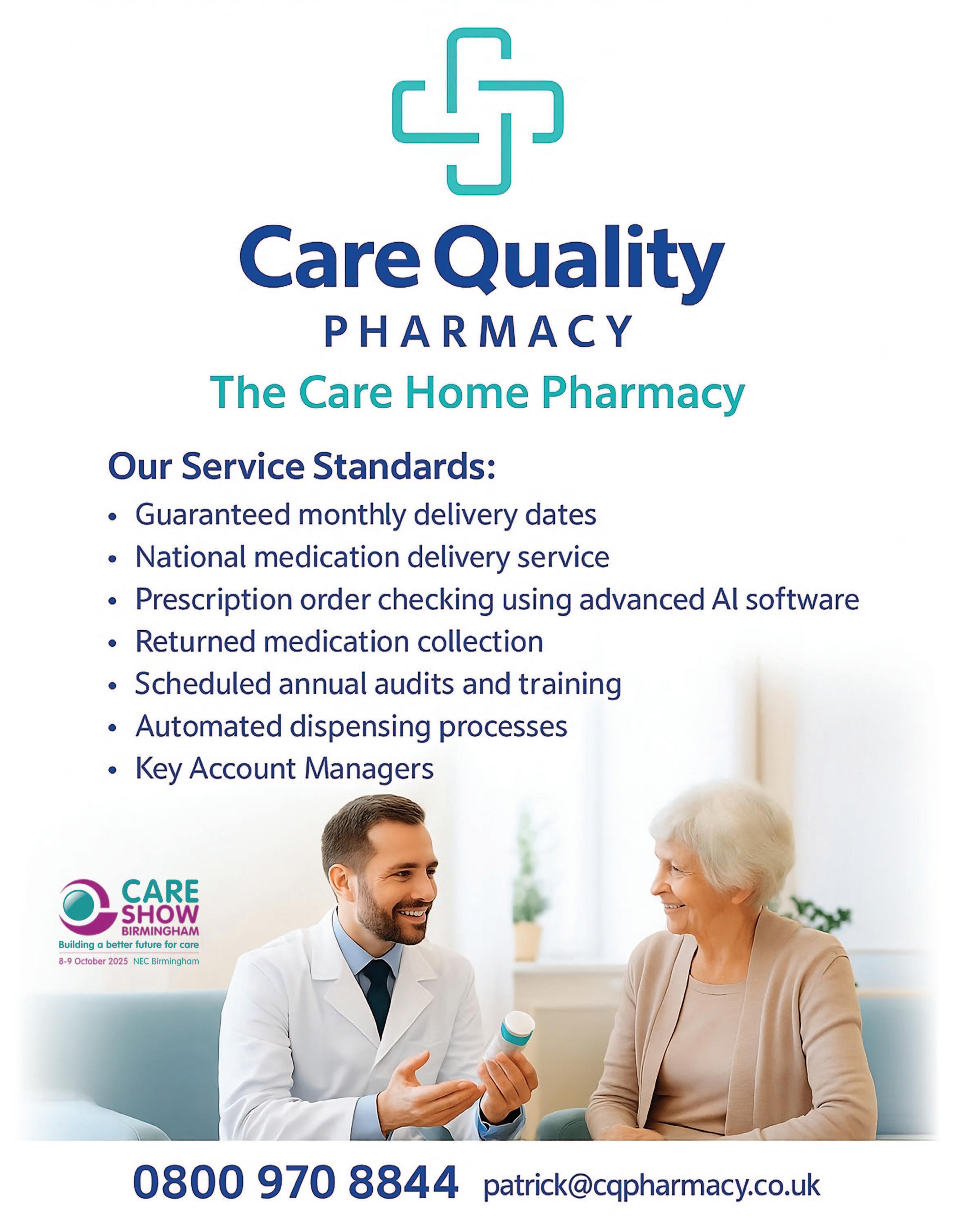

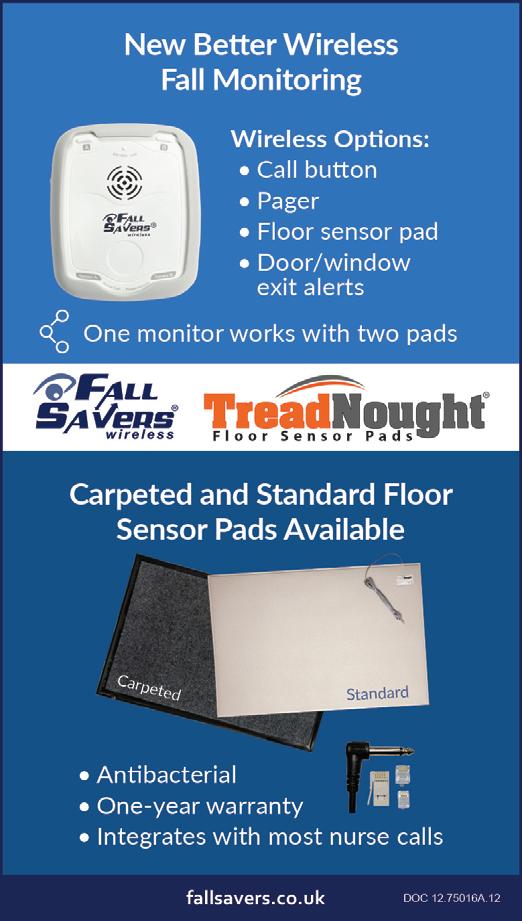













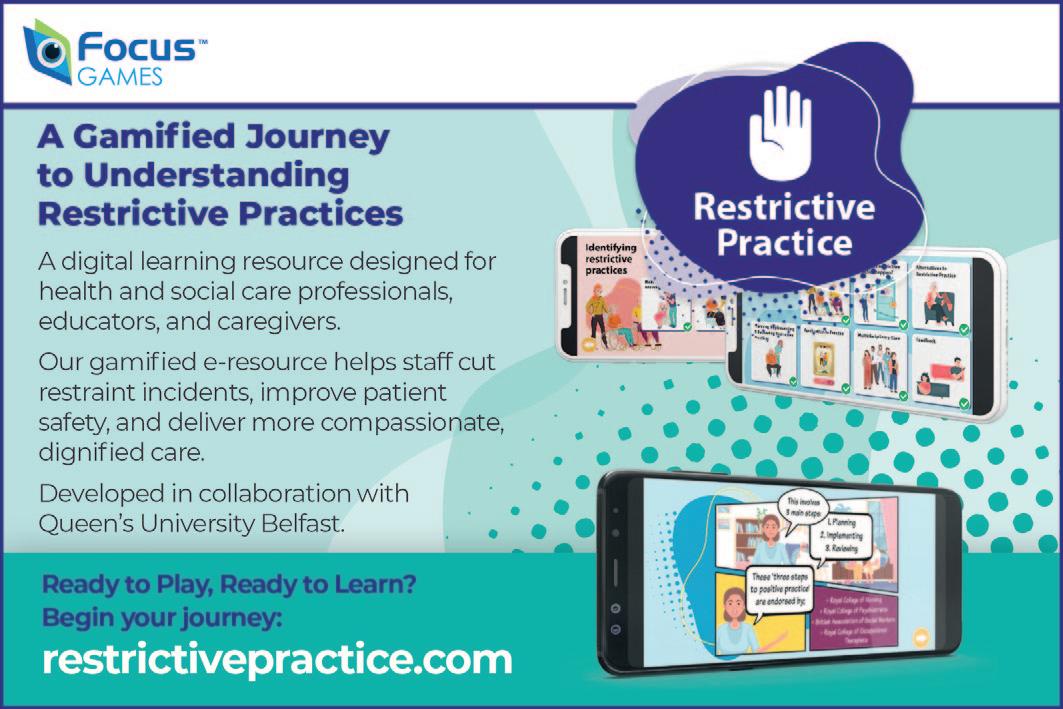
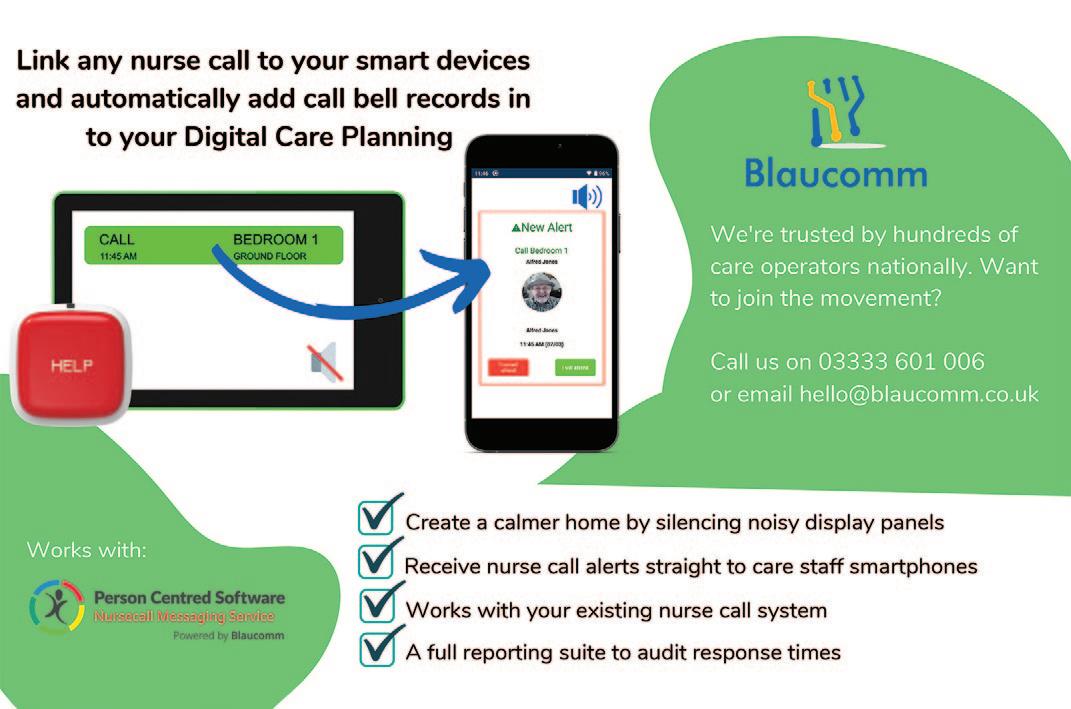
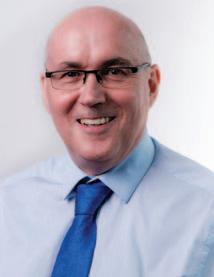
The announcement of £500 million towards England's first Fair Pay Agreement for care workers represents a significant moment for our sector.
After years of campaigning, the principle that care work deserves proper recognition and remuneration has finally received government backing at the highest level.
Health Secretary Wes Streeting's commitment at Labour's Liverpool conference should be acknowledged for what it is: a starting point.
The establishment of a negotiating body bringing together employers and trade unions to collectively bargain on pay and conditions is unprecedented in adult social care, and could mark a genuine shift in how the sector is valued.
Yet the sector's cautiously optimistic response is entirely justified. The devil, as always, will be in the detail.
The timeline alone raises questions. Care workers won't see the benefits of this investment until 2028 - three years away.
For a workforce already struggling with low pay, challenging conditions, and a cost-ofliving crisis that shows no signs of abating, that's a long time to wait.
The timing of the announcement itself was, to put it mildly, interesting. On Monday, I stood among thousands at the Providers Unite demonstration outside Liverpool's Albert Dock, as the Labour Party Conference took place mere hundreds of metres away. Care providers, workers and families had travelled from across the country to make their voices heard. The protest was passionate, at times highly emotional, and utterly justified.
Speaker after speaker outlined the reality of operating in a constantly underfunded sector. Providers spoke of impossible choices between paying staff fairly and keeping their doors open.
Workers described the physical and emotional toll of caring for vulnerable people whilst struggling to make ends meet themselves. Families shared heartbreaking accounts of watching loved ones receive inadequate care because the system simply cannot afford to deliver what's needed.
Against this backdrop, the £500 million announcement the following day felt significant - but also insufficient. Especially when delivered at the same conference where Chancellor Rachel Reeves was, to put it bluntly, pleading poverty about the state of public finances.
The funding forms part of over £4 billion additional investment available for adult social care in 2028-29, which sounds substantial until you consider the scale of the challenge.
Years of underfunding cannot be reversed overnight, and providers are already grappling with increased National Insurance contributions, National Living Wage rises, and impending costs from the Employment Rights Bill.
Mr Streeting described this as a starting point. I sincerely hope that's precisely what it proves to be, rather than a sticking plaster designed to quieten discontent, or an appeasement gesture intended to buy time.
The establishment of collective bargaining in social care is genuinely progressive. Giving workers a strong voice for years to come through formal negotiating mechanisms could transform the sector's ability to attract and retain talented, dedicated. But only if the funding is there to back up the promises being made.
Because here's the uncomfortable truth: raising expectations without delivering the resources to meet them risks making the situation worse, not better.
If care workers are promised fair pay that never materialises, or if providers are expected to fund improvements without adequate support, we'll see more closures, more exits from the workforce, and ultimately more vulnerable people left without the care they need.
The sector has been here before - promised reform, offered consultations, given hope that change is coming. What we need now is delivery, not just dialogue.
Standing in Liverpool on Monday, watching provider after provider share their stories, one thing became abundantly clear: this sector will no longer accept warm words without meaningful action.
The passion and determination on display weren't performative - they were born of desperation and frustration after years of being overlooked.
So I sign off this week wholly confident of one thing: if this government fails to deliver on its Fair Pay Agreement promise, the sector will be there to remind them of their obligations. Loudly, persistently, and with the backing of everyone who understands that without a properly funded social care system, our entire health and care infrastructure fails.
The announcement is welcome. The principle is sound. Now we need the followthrough.
The sector is watching. And it won't be silent if promises are broken.
I would encourage our readers to sign up for our bi-weekly digital newsletter at www.thecareruk.com and follow us on social media for all the latest news.
I can always be contacted at editor@thecareruk.com
The Carer is published by RBC Publishing Ltd, 3 Carlton Mount, 2 Cranborne Road, Bournemouth, Dorset BH2 5BR.
damage. Views expressed within this publication are not necessarily those of the publisher or the editorial team. Whilst every
responsibility for any effects, errors or omissions therefrom. All rights reserved, reproduction is forbidden unless


(CONTINUED FROM FRONT COVER)
A public consultation to gather views on the design of the Fair Pay Agreement process has also been launched today by government.
Following this, the Adult Social Care Negotiating Body will be established through regulations in 2026 –with the first Fair Pay Agreement coming into force in 2028. RESPECTED AND REWARDED
It is supported by other government reforms that will ensure a career in adult social care is respected and rewarded – by backing progression through a universal career structure, funding training and qualifications, and recognising the complex skills care workers bring – so working in care is seen as a profession, not just a job.
Not only will this improve recruitment, but this important first step between workers and employers in the sector will also ensure the delivery of high-quality care, as the government makes headway on its mission to build an NHS that’s fit for the future.
As well as putting more money in pockets for care workers, it is a down payment on higher wages for the future, as establishing collective bargaining in this critical sector means that the workers will have a strong voice for years to come.
The Fair Pay Agreement will be backed by law currently progressing in Parliament through the Employment Rights Bill, and will empower employers and unions to negotiate better terms and conditions. CROSS PARTY CONSENSUS
Baroness Louise Casey is working on the independent commission into adult social care to build crossparty consensus and deliver recommendations on the Government commitment to create a National Care Service.
Today’s [September 30] announcement follows the Spending Review settlement which saw a 2.6% real terms average annual increase in local government core spending power over the Spending Review period, including £3.4 billion of new grant funding for vital local services. This £500m forms part of an increase of over £4 billion of additional funding available for adult social care in 2028-29, compared to 2025-26.
The government has also taken steps to boost wages for the lowest paid workers including care workers, with the National Living Wage increasing by 6.7% to £12.21 this April. This increase is expected to benefit around 3 million low paid workers. This represents an increase of £1,400 to the gross annual earnings of a full-time worker on the National Living Wage.
In his speech to conference, Mr Streeting said: “So long as I hold this office, it will be the mission of this Labour government to build a national care service worthy of the name.”
Cllr Dr Wendy Taylor, Chair of the LGA’s Health and Wellbeing Committee, said: “The care workforce plays a fundamental and valued role in supporting people who draw on social care to live the independent lives they want to lead, and action is needed to tackle long-standing serious recruitment and retention challenges.
“Pay is crucial to this, and we support the ambition to deliver a Fair Pay Agreement (FPA) for care workers. However, councils will be seriously concerned that this is not matched by a commitment from central government to fully fund the output of the negotiations.
“The success of the FPA depends on its costs being fully funded. Such a commitment is critical to the policy’s success and to ensure it makes a meaningful difference to those accessing social care and those delivering it.
"The LGA has long called for investment in care workers’ pay but without full funding from central government, neither councils nor providers will be able to absorb the level of likely costs involved. If costs do fall on the sector, they will compound existing pressures and the consequences of those pressures for people drawing on care and those providing it.
“Councils want to work with government to find a sustainable and reasonable solution, and this must involve local government playing a critical role in the design and enforcement of Fair Pay Agreements. Building a strong and thriving care workforce shouldn’t be seen only as a cost; it should be seen as an investment given its wider value to the economy.”
UNISON general secretary Christina McAnea said: “The health secretary was unequivocal about his commitment to the desperately needed national care service millions of people deserve.
“Today he got the ball rolling with the fair pay agreement that’ll begin to lift social care staff from their poverty wages, after being undervalued and ignored for far too long.
“UNISON’s been campaigning tirelessly for years to get a better deal for social care workers. Labour has been listening and is doing something about it with these positive steps.
“Wes Streeting also understands the NHS and social care are more than just a way to patch people up. They’re about providing people with a decent quality of life.
“A healthier nation is part of a much bigger picture and that means ensuring everyone has a fair chance to access public services, education and support.
“But a bold, modern health and care system requires proper funding for the nuts and bolts, as well as the staff who deliver these essential services.”
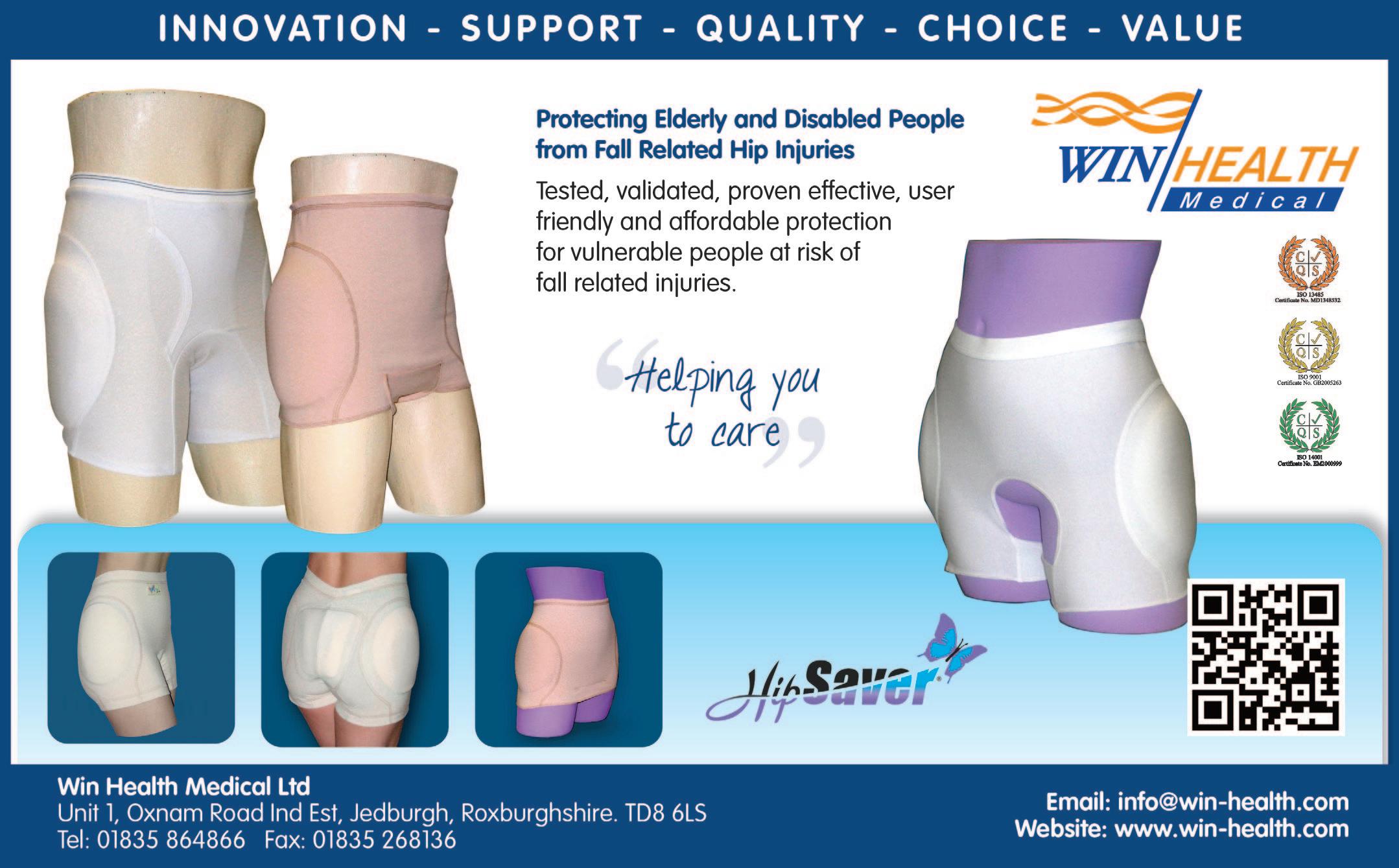
By Hannah Strawbridge, Founder and CEO of employment law and HR specialists
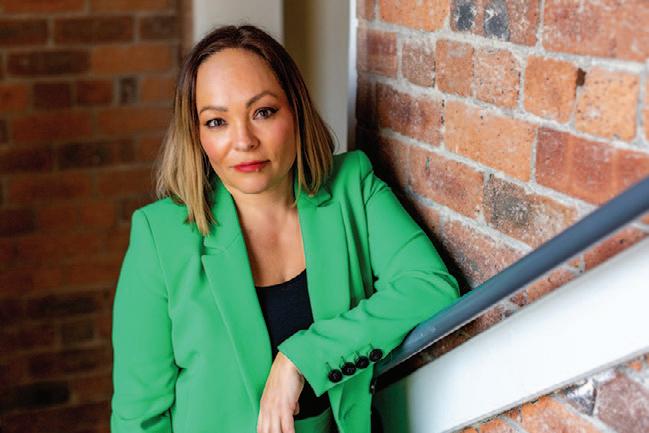
Recruitment and retention remain two of the greatest challenges facing the care sector. While headlines often focus on the wider NHS crisis, the reality is that care homes and domiciliary care providers are on the frontline when it comes to staffing shortages. The numbers tell their own story: tens of thousands of vacancies remain unfilled, turnover rates remain high, and providers are increasingly stretched to maintain compliance with safe staffing levels while also meeting residents’ needs.
But, this issue is not new. For years, the care sector has faced difficulties attracting and rataining staff. Low pay, physically demanding work, and limited career progression have often been cited as the key reasons why many carers leave the profession. The pandemic, Brexit, and the tightening of immigration rules have only added further pressure.
Despite the government’s expansion of the Health and Care Worker visa route in recent years, there is still uncertainty about immigration policy. The Home Office’s focus on compliance and the risk of substantial penalties for employers who get it wrong, adds another layer of complexity. A recent increase in fines for employing someone without the right to work, now up to £60,000 per illegal worker, makes right-to-work checks more important than ever for care providers who are already struggling to fill posts.
Recruitment often gets the most attention, but retention is just as critical. Every time an experienced carer leaves, providers lose not just a staff member, but also valuable skills, continuity of care, and often a trusted relationship with residents and their families.
High turnover also has a financial impact: advertising roles, paying agency rates, and training new starters all come at a cost. For smaller operators, those costs can quickly add up to unsustainable levels. There is no quick fix, but there are steps employers can take:
- Invest in training and development: Carers who feel valued and see a clear career path are more likely to stay. Even modest investments in ongoing training can boost morale and improve retention.
- Flexible working: With the upcoming changes in employment law strengthening day-one rights to request flexible working, employers who embrace flexibility may have a competitive advantage in attracting and retaining staff.
- Culture and wellbeing: A supportive working environment, recognition for good work, and access to wellbeing initiatives can make a difference in a sector where burnout is common.
- Pay and conditions: While budgets are tight, some operators have been able to stem turnover by looking creatively at pay structures, benefits, and recognition schemes.
Recruitment and retention are not just HR challenges — they are legal ones too. Employment law is evolving quickly, and the care sector is particularly exposed. Key areas to watch include:
- Right to work checks: As mentioned, penalties for getting this wrong are severe. Employers must keep up-todate with the correct processes.
- TUPE and restructuring: Many providers are going through mergers, acquisitions, or contract changes. Ensuring compliance with TUPE obligations when staff transfer is essential.
- Flexible working requests: With changes on the horizon, handling these fairly and consistently will be critical to avoiding disputes.
- Minimum wage compliance: Sleep-in shifts, travel time, and record-keeping are all areas where providers need to be meticulous.
The reality is that there is no easy solution to recruitment and retention challenges in the care sector. Immigration rules, government policy, and funding all play a role, and much is outside employers’ direct control. But providers can take proactive steps to reduce risk and strengthen their workforce.
At Han Law, we regularly see the impact of staffing shortages on care operators, from disputes over pay and working hours to the complexities of recruiting overseas staff. While there is no “one size fits all” approach, having a clear understanding of your legal obligations and putting robust processes in place can help prevent small issues becoming costly disputes.
For care providers, the focus has to be on balancing compliance with creating a workplace where carers feel valued, supported, and motivated to stay. In a sector that depends on people, that may be the single most important investment you can make.
Residents and staff at an East Dorset dementia care home stepped out to help community partners raise awareness of the condition.
A party from Colten Care’s Fernhill in Longham hit the streets to join the seven-mile Ferndown Memory Walk alongside representatives from businesses, fellow care providers and other organisations.
The route, which took in various stops including at the Ringwood Road home, was in support of the Ferndown Dementia Friendly Town (FDFT) initiative.
As with similar initiatives across the country, FDFT aims to educate the community about dementia, provide inclusive and accessible activities and ensure people living with dementia and their carers can help shape local service planning and decision-making.
Starting at 10am, walkers enjoyed refreshments along the way before finishing with a well-earned celebratory lunch at FDFT’s community
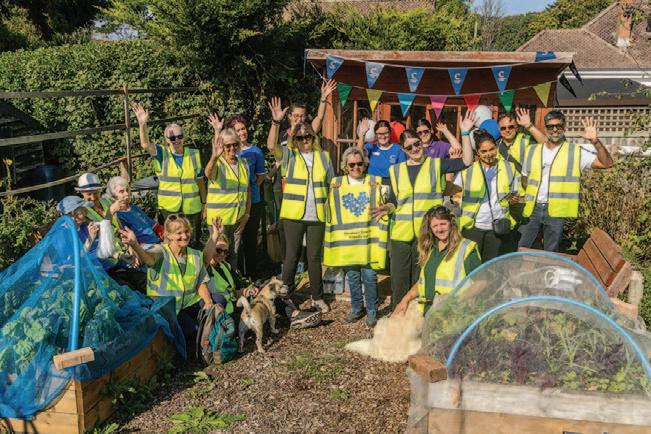
allotments, close to Fernhill.
It featured a buffet of quiches, sausage rolls and sandwiches prepared by Fernhill Chef Constantine Pacurar.
Wearing a blue Colten Care T-shirt and waving a pom pom to cheer on fellow strollers, Fernhill resident Kiki Tormey said of the walk: “What a wonderful thing to do.”
Kiki’s comment was echoed by Home Manager Lorraine Bell who said: “Being part of this was a special experience. Dementia care is a cause close to many hearts in our community and the Memory Walk brought together local businesses, families and residents in a powerful show of unity.”
Cara Duroe, Companionship Team Leader at Fernhill, said: “We’re so proud to support such a vital cause, walk the walk and stand together as a community in the fight against dementia.”

Leading care home provider, Oakland Care, has announced the expansion of its memory care floor at Elmbrook Court care home in Wantage, Oxfordshire.
The investment into the growth of its memory care floor forms part of Oakland Care’s strategic approach to care which involves a frequent review and comprehensive efforts to enhance its care home environments.
The additional space at the care home comes in response to growing local demand for its memory care environment at Elmbrook Court, with the original space, known as Birch Avenue, at full capacity. Memory care environments are designed to be relaxing, safe, and familiar, incorporating elements that reduce confusion and worry while promoting independence for individuals living with dementia or experiencing memory loss.
In response, the care home team have invested in the creation of a second memory care space, which will be known as Cedar Crescent. This has seen a 28-room area of Elmbrook Court enhanced with additional quiet, calm, and sensory based features for current and new residents to the care home seeking this type of care provision.
Alongside the purchase of an interactive and adjustable ‘magic’ tablet device for residents, the expanded memory care floor has included the incorporation of nostalgic elements which residents may have experi-
enced in the past, wayfinding décor, sensory touch patches designed to bring comfort and physical engagement, and more.
Through the process, improvements have also been made to the original Birch Avenue space to enhance the overall memory care offer at Elmbrook Court.
An event to mark the expanded memory care floor was attended by the Mayor of Wantage, Iain Cameron, alongside team members, residents, families and other members of the public.
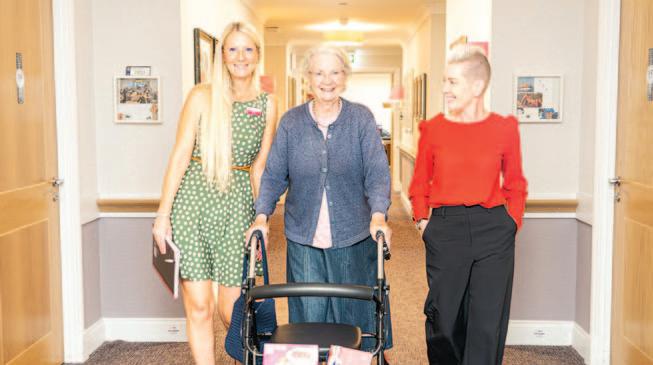
Rebecca Warman, Care Home Manager at Elmbrook Court, said: “We’re delighted to announce the expansion of our memory care floor at Elmbrook Court with the ‘creation’ of space for a further 28 individuals seeking memory care provision. Over the years we have seen a real rise in demand for our memory care environment and wanted to make a conscious effort to invest and expand our memory care floor with new high-quality space.
“This exemplifies the efforts which have been made across Oakland Care to continually invest in our care homes so that we can always offer the highest quality professional care provision and accommodation. As Elmbrook Court has grown over the years it has been vital that we have not only maintained the high standards we are known for at Oakland Care but also respond to local demand as it arises.”
A new report has called for urgent transformation of adult social care to prioritise health outcomes, warning that years of underfunding have left the system unable to meet population needs.
The Royal Society for Public Health has published research examining how social care services impact the health of adults who use them, revealing significant shortcomings in the current approach.
Analysis of Care Quality Commission data shows that just half of care services effectively support people to live healthier lives highlighting the scale of the challenge facing the sector.
The report argues that social care should move beyond functioning merely as a safety net, instead becoming a comprehensive platform for wellbeing, inclusion and independence that engages with individuals, families and communities.

Prolonged budget cuts and underfunding have rendered the system inadequate for supporting people with diverse conditions and disabilities the organisation warns. This has resulted in unpaid family carers increasingly filling service gaps by providing care themselves.
The report highlights that care workers frequently deliver essential health support, but this role remains unrecognised and inadequately supported Training provision is inconsistent, with high staff turnover due to poor working conditions leading to loss of expertise.
Care staff often identify early warning signs of health problems but lack support to intervene or make timely referrals to health services before situations reach crisis point the research found.
THE RSPH IS CALLING FOR SEVERAL KEY REFORMS:
• Care staff should receive comprehensive training in health promotion, with government rolling out delegated healthcare activities to carers as recommended by Skills for Care
• The process of accessing care must be simplified to reduce burden on mental wellbeing for individuals and families
• To enable genuine personalised care and prevention, the report calls for abolition of 15-minute care visits, with packages funded according to individual needs
• Government must improve pay and working conditions for the care workforce to enable other reforms to succeed
The report found that both care recipients and providers are experiencing significant emotional strain and anxiety, with staff struggling due to overwork and low pay in emotionally demanding roles
Professor Lord Patel of Bradford OBE, RSPH President, said transformation should be central to government reform efforts. “With the right political will and investment, we can move beyond short-term fixes and build a social care system that genuinely enables people to live with dignity, independence, and better health,” he stated.
A reformed system would deliver multiple benefits beyond improved individual outcomes, according to the RSPH. These include reduced NHS pressure, stronger community-based care, reduced health inequalities, and local economic development through the care workforce and voluntary sector.
“The solutions exist. We now need to act,” Professor Lord Patel added.
The report positions social care as an integral component of preventative health services and calls for integration between care staff and formal health services to enable appropriate referrals.
emphasising the sense of community at the heart of Pavillion.
Pavillion Residential and Nursing Home in Houghton-le-Spring recently transformed its grounds into a lively racecourse for a heartwarming ‘Races Day’ celebration, bringing together residents, families, and staff for a day of fun.
The highlight of the day was a special visit from Princess; a pony provided courtesy of the Shelly Equine Assisted Therapy Charity. Princess didn’t just stay in the garden, she made her way into the lounges and bedrooms of residents, ensuring that everyone could experience the joy and connection that animal therapy brings. The sight of Princess gently interacting with these residents added a brilliant touch to the day.
The not-for-profit Sanctuary Care home was buzzing with excitement as races and games took centre stage. Families competed for trophies, staff wore hilarious inflatable horse costumes, and celebratory drinks were shared. The atmosphere was filled with friendly competition and intergenerational bonding,
Many residents were deeply touched by the event, especially Patricia, who used to own horses herself. Reflecting on the day, Patricia remarked “I thought it was absolutely fabulous. It was just so unexpected. The horse was beautiful and reminded me so much of one of my horses I kept.”
Sean Whitely, Pavillion’s Activities Coordinator, was thrilled with the success of the event, suggesting he was sure it would become an “annual tradition!”
Sean went on to add how “it was so lovely seeing the residents’ faces light up, it was such a special moment.”
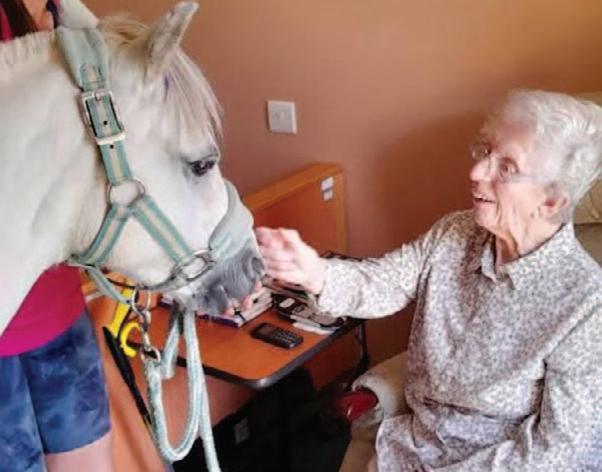

By Hayley Songhurst, Senior Associate at Birketts

It is widely known that the care home sector in the UK was crippled during the Covid-19 pandemic. Many care homes were struggling financially before the pandemic and, while the government emergency funding may have temporarily alleviated the financial difficulties for some, the difficulties did not end when the government funding did.
The care home sector continues to be in crisis, facing under occupancy, more complex care needs, workforce shortages and rising operational costs.
The rising costs include those related to employees – the Autumn Budget 2024 exacerbated the pressure with an increase to the National Living Wage and employer National Insurance contributions – as well as the increasing costs of regulatory compliance, energy, food and other supplies.
HM Treasury has announced that this year’s Autumn Budget will take place on 26 November 2025, and this may have further detrimental impact on the care home sector.
Baroness Casey has been appointed by the government to lead an independent commission to reform the social care sector in England, but that report is not due until 2028.
Care home providers should take stock now and consider some of the following factors and what changes they may need to make to navigate the challenging landscape.
1. Dividends - providers should consider whether there are sufficient profits to declare dividends to shareholders. An article by Warwick University in January 2024, suggested that between October 2021 and April 2022, 27% of the 460 care home providers which they analysed paid out a total of £120 million in dividends, despite increased costs and decreased income (due to lower occupancy rates).
2. Outstanding payments - is the provider owed money by residents, or others, for example directors loans?
Agreeing repayment terms will assist with cashflow and also the business to terminate contracts where there is non-payment.
3. Existing contracts - providers should consider the terms and conditions on which it does business and
whether it is possible to renegotiate contracts to cut costs, increase profitability and streamline operations.
4. Staff - recruitment and retention of staff are major issues in the care home sector. There is increasing competition for skilled healthcare professionals, and this has a direct impact on costs of recruitment and training. Providers should consider whether they are offering competitive pay and performance-based incentives, structured career progression pathways, leadership development opportunities, flexible schedules and mental health support.
5. Solvency - providers should also consider, at least monthly, whether they can continue to pay debts as they fall due and whether the assets are in excess of the liabilities. If not, the company is likely to be or become insolvent.
If a provider has any concerns about insolvency, it should take early advice. There is often an option to restructure a business to reduce its costs and increase its profits. There are measures such as Administration and Company Voluntary Arrangements (CVAs) which give the company breathing space, protecting it from creditor action, while exploring rescue and restructuring.
There are various routes into administration. A licensed insolvency practitioner can be appointed by directors, a creditor or the court to fulfil the administration process and the administrator will look to save the business as a going concern.
If this cannot be achieved, the administrator will look to achieve a better result for creditors than if the company was wound up (without first being in administration). For example, the administrators can trade the company, before selling the business as a going concern or alternatively, selling assets such as property.
An administration usually lasts one year.
With a CVA, a company instructs an insolvency practitioner to make a proposal to its creditors that would result in a better outcome than if the company was wound up.
This usually involves an investment or connected creditors such as shareholders or directors waiving or delaying repayment of any sums owed to them. If 75% in value or more of creditors approve the proposal, then the CVA will be binding on all unsecured creditors. A CVA usually lasts up to five years.
Liquidation (or winding up) is a last resort. It can be either a voluntary process or compulsory. An insolvent voluntary liquidation is known as a creditors voluntary liquidation (CVL) the process is started by directors of the company and approved by the shareholders.
The company choses which insolvency practitioner to appoint (although the creditors can vote to replace the liquidator) and is generally in control of the process.
A compulsory winding up order is made by the court following the presentation of a winding up petition by a creditor or sometime on the petition of a single shareholder or the company itself.
The threshold for issuing a winding up petition is only £750 and it is therefore important for care home providers not to let debts escalate as options could then be taken out of their hands.
Hannah Masters, from Redbridge, has completed the Loch Ness Marathon in Scotland to thank our admiral nurses for the care they provide to her grandfather Cyril, 93, who has dementia.
Hannah, 25, raised money for Dementia UK, which offers specialist care and emotional support to families of patients with dementia. This includes funding admiral nurses, who offer tailored, life-changing support to those affected by the condition.
Cyril, from Iford, was admitted to Queen’s and King George hospitals several times between October 2023 and March last year, where he was diagnosed with mixed dementia, a combination of both vascular and Alzheimer’s types. He has experienced a decline in his cognitive abilities due to his dementia, and our admiral nurses support him with A&E visits and outpatient appointments. When he was in hospital, they advocated for him when he was confused or distressed and made sure his needs were understood, which reduced his anxiety. They also made sure that he was referred to the correct departments, which reduced delays.
Hannah said: “His condition varies and he can have good days and bad days. The admiral nurses see him as a person and understand his cognitive abilities.

Without them, I don’t know how we would have coped. I want to give something back to those who made such a difference to my family.”
She said the Scottish Highlands scenery on her run was ‘beautiful’ and she had bright, sunny and clear weather for the race.
Hannah ran the marathon in 4 hours, 13 minutes and 31 seconds and she has already surpassed her £1,000 fundraising target with £1,328 raised for the charity.
According to Dementia UK, there are nearly 1million people in the UK living with dementia. It’s a growing health crisis and by 2040, this is expected to rise to 1.6million people.
Charity spokesperson Jenny Robinson said: “We’re grateful to Hannah for taking on this impressive challenge in support of Dementia UK. Thanks to her efforts, more families than ever will be able to access the life-changing support offered by our dementia specialist admiral nurses.
“One in two of us will be affected by dementia in our lifetimes, but thanks to the support of people like Hannah who work hard to raise both funds and awareness, we can continue to offer support and advice to as many people as possible.”
Residents at an Ilkley home can visit places such as Scotland and the North York Moors without leaving their home thanks to a new train experience.
MHA Glen Rosa have installed the Jolly Journey Train Experience, a new initiative by Little Islands, who specialise in creating unique interactive environments.
The train experience showcases journeys across the UK from the viewpoint of a passenger looking out of the window.
The team from Little Islands installed and decorated a part of the home’s dementia unit and converted it into a train carriage with props such as suitcases, train times and journey information displays.
MHA Glen Rosa provides residential and residential dementia care for 47 residents.
Adam Carling, home manager said: “The Jolly Journey Train experience is a new initiative and one that is proving to be very popular here.
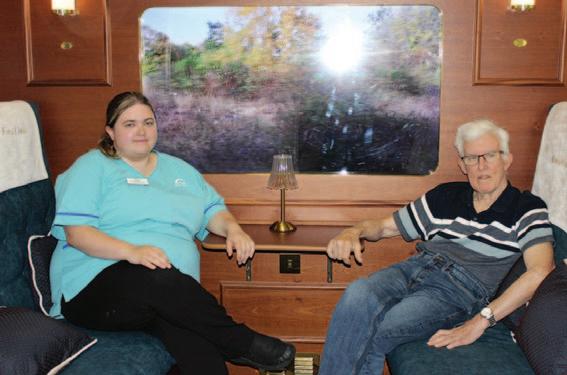
“We have received some great feedback since the experience has been installed.
“Our residents love it, you will often see a number of them sat in the carriage and watching a journey.
“The idea came to me from my area who forwarded it to me, and I decided to look into it.
“I then contacted the team at Little Islands and the whole process took a couple of months from start to finish.
“We are quite privileged here at MHA Glen Rosa, where thanks to the generosity of the local community we are able to provide services such as this for our residents.
“We received a very generous donation via our Legacy Fund which enabled us to go for this experience.
“The location of the experience is really good as it’s in a high footfall area, where both residents and their relatives can sit and enjoy it.
“Alongside the Train Experience, we have also prepared a sensory garden thanks to funds we received.
“I do think this is something other MHA homes can look into having, it’s something quite unique and I
NHS Continuing Healthcare (CHC) – a package of free health and social care provided outside of hospital which the NHS pays for – is failing to reach some of the most unwell patients in England in their time of need.
CHC is also reinforcing deep regional inequalities, with varied eligibility rates and less being spent per person on care in deprived areas and the North of England.
That’s according to new research by the Nuffield Trust, part funded by the Nuffield Foundation, which is a deep exploration of data on CHC eligibility, assessments and spending, alongside the views of people working in health and social care.
The report highlights the paradox that, despite overall demand for health and care services being on the rise and spending on CHC increasing by around 17% between 2017 and 2023, the total number of people found eligible has fallen over time (by 9% between June 2017 and December 2024) and varies significantly across the country.
CHC funding can be a lifeline for people with significant ongoing care needs, such as from an accident or disability, including at the end of life.

But if someone is found ineligible they can be faced with potentially catastrophic costs, or local authorities can be required to foot the care bill. The authors say that the current ‘all or nothing’ approach to deciding who gets this free care is dysfunctional and does not reflect the nature of need.
A lack of awareness and understanding of CHC among the public and health and care professionals and a complex and often gruelling application process are key reasons for poor access. Despite a National Framework setting standards to improve consistency, there are concerns that decisions about who gets funding are arbitrary and subjective, leaving people potentially missing out on vital support.
KEY FINDINGS INCLUDE:
• There is an almost five-fold difference between the Integrated Care Boards (ICBs) with the highest and lowest rates of CHC eligibility. Some of this variation could be explained by differences in population need. Areas with older and more deprived populations were more likely to have higher CHC eligibility rates. But this does not explain the extent of the variation.
• Spending on CHC is not distributed equally and is lower per eligible recipient in the north of England, even after adjusting for geographical differences. In 2022/23 (latest data), a person found eligible for Standard CHC in the North West had on average £22,432 less spent on their care that year compared to the England average which is £65,012 per eligible recipient.
In 2022/23, the average (median) amount spent per eligible recipient of Standard CHC was £47,300 in the most deprived fifth of local areas compared to £95,085 in the least deprived fifth of areas.
• The research raises concerns about a “postcode lottery” and unfair and inconsistent practice. Variable relationships between NHS organisations and local authorities and financial pressures are affecting the numbers of people being referred, assessed and found eligible for CHC.
The average cost per eligible recipient has increased for both Standard and Fast-track care packages,

which may reflect a growing number of complex cases requiring more intensive or prolonged care.
In the short term, the authors say NHS and Department of Health and Social Care leaders urgently need to improve consistency and fairness in how CHC operates, through better training, sharing good practice and ensuring assessments are conducted in line with national standards.
The funding package is intended to help people live in their communities while dealing with health issues, so ensuring fairness is crucial to the government’s aim to shift more care from hospital to community.
The research also raises questions about the very existence of CHC and whether it perpetuates an in-built unfairness where some people’s needs are supported but other people’s needs are not.
With the flawed and cash-strapped social care sector making it even more difficult for people to get support when they’re rejected by CHC, the Nuffield Trust says The Casey Commission into adult social care offers a key opportunity to create a resilient and fair care system which can work alongside the NHS.
Nuffield Trust Fellow, Rachel Hutchings said:“For people grappling with the bewildering CHC process, the stakes couldn’t be higher.
Being eligible can be the difference between having all of your health and social care funded or being faced with catastrophic care costs, often during times of crisis.
But our research suggests that access to this vital funding is unfair and inconsistent.
“Not only is the assessment process itself challenging, but the toll it takes on families is long-lasting, part of an ongoing struggle to access good-quality, timely care for their loved ones.
CHC is a window into the stark divide in our system between care that is funded by the NHS and care that isn’t, and it exposes yet more flaws with our wider social care system.”
In an accompanying Q&A, Sharon Allen, who has experience of CHC both through her professional role as Chief Executive of the Arthur Rank Hospice Charity and in her personal life, following the recent application for her mother to receive CHC funding, said:
“On both a personal and a professional level, my overall experience with CHC has been very negative.
“It seems to me that the system is designed to say no and that you have to fight extremely hard to get anywhere with it...
Nobody knows my mum better than me and my sister and my dad, but we’re not listened to. And I know we are not alone. I speak to many people going through the same thing and it’s heartbreaking.”

By Lisa Hayward, Partner and Head of Employee Incentives,
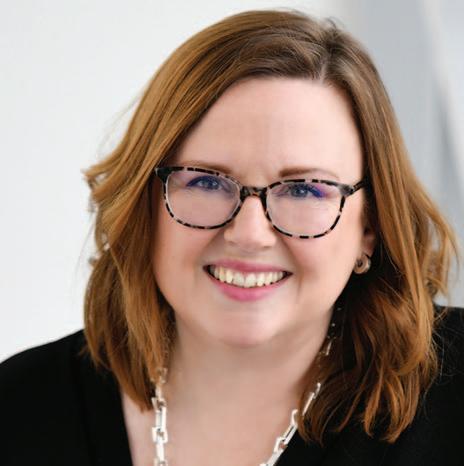
The UK’s adult social care sector is wide ranging and supports older adults and people living with disabilities or other long-term health conditions. As the sector faces pressures around staffing, retention, funding and succession planning, two in five care business owners are considering exiting the market, prompting the government to explore alternative models that could diversify and strengthen the sector with incentive schemes and employee ownership trusts (EOTs) gaining traction.
A recent paper by Care England suggests that selling care businesses to employees could offer a sustainable, values-driven solution to succession. But what exactly is employee ownership, how does it work, and is it a viable option for adult social care?
WHAT IS AN EOT?
An EOT is a legal structure that enables a business to be owned collectively by its employees. The EOT must hold a majority share in the company and treat all beneficiaries equally. This model allows founders to sell their business in a tax-efficient way, with proceeds paid over time from company profits, and which are free from capital gains tax.
Employees also benefit directly, with the potential to receive annual bonuses of up to £3,600 tax-free. Beyond financial incentives, EOTs foster a sense of shared purpose and long-term commitment.
WHY EMPLOYEE OWNERSHIP WORKS
Despite its essential role, the social care sector is often marked by low wages, limited career progression, and high staff turnover which are factors that undermine continuity of care. With overseas recruitment routes now closed, providers must invest in domestic workforce development to fill the gap. At the same time, financial pressures, especially stagnant local authority fees and rising workforce costs, are prompting many owners to consider exiting. These twin challenges of retention and succession demand innovative solutions.
Employee ownership offers a compelling response. It promotes long-term thinking, deeper engagement, and a stable workplace culture. Businesses owned by their employees tend to experience higher morale, lower turnover and greater accountability. These qualities translate into better care outcomes and stronger organisational resilience.
REGULATORY
Employee ownership should be positively received by the Care Quality Commission (CQC), especially
given its established acceptance of ownership changes, provided the registered manager, registered provider, and the registered individual remain unchanged. Under an employee-owned model, accountability among these key figures is likely to be more transparent, empowering those closest to service users to influence strategic decisions. This alignment between frontline insight and leadership can drive meaningful innovation and enhance service quality.

Employee ownership is a natural fit for social care businesses, which are built on values of dignity, compassion and community. By transitioning to employee ownership via an EOT, founders can preserve these principles while securing a future where staff who are most committed to the mission take greater accountability. Employee owners tend to be more innovative and invested in delivering high-quality care, and EOTs offer a compelling and taxefficient succession option that keeps the business intact, avoiding the disruption of selling to external buyers or passing it on to reluctant family members.
The EOT model typically relies on the business’s own profits to pay the outgoing owner. In low-margin sectors like care, this can be slow and risky and may lead to a breach of the sale agreement terms if the business does not perform in accordance with the forecasts.
Securing external funding for EOT transitions can be difficult. Those looking to transition to employee ownership may have to accept that it will not be possible to secure funding with the transaction relying on vendor debt paid over time.
As the adult social care sector confronts urgent workforce shortages, succession challenges, and the need to preserve its deeply rooted values, employee ownership via an EOT offers a promising path forward. By placing ownership in the hands of those who deliver care, EOT owned businesses can strengthen accountability, improve service quality, and foster innovation, all while maintaining the cultural integrity of the business. Though funding hurdles remain, particularly in a low-margin environment, the long-term benefits of employee ownership make it a compelling option for founders seeking a values-led exit strategy. In a sector where continuity and compassion are paramount, who owns the business truly matters and who cares, wins.
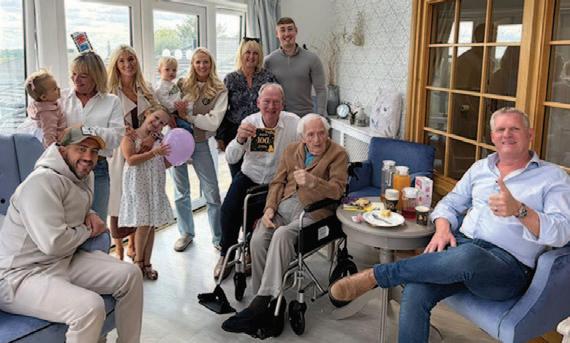
Cuffley Manor Care Home was filled with joy this week as resident Ernest “Bob” Howes celebrated his 100th birthday alongside nearly 50 family members who gathered to mark the occasion.
Bob, who has lived at Cuffley Manor for over two years, is a much-loved member of the home’s community. His nickname, “Bob,” originated during his service in the Royal Navy when he was mistaken for another E. Howes — a case of mistaken identity that has lasted a lifetime.
To add to the festivities, Bob received a congratulatory letter from Their Majesties The King and Queen, which he held with great pride on his special day as you one can see in the photos.
Speaking of his life and milestone, Bob reflected with his trademark humour, often saying he hopes to live until “111.” His family, delighted to see him thriving at Cuffley Manor, share his optimism for the years ahead.
Alex, the Home Manager at Cuffley Manor Care Home said: “We are honoured to celebrate this incredible milestone with Bob. He is a valued member of our community, and it was heartwarming to see so many of his family join together to celebrate. We wish him many more happy and healthy years to come.”
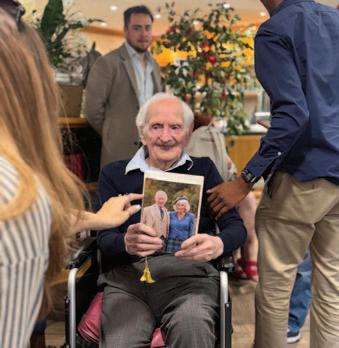
In April 2025, the Supporting the Provider Market (STPM) team in County Durham published a new report evaluating the use of pobroll® — a waterproof bed-bathing wrap designed to improve dignity, comfort, and ease during personal care.
This evaluation was carried out across 10 care homes with high numbers of residents living with dementia. Each setting was given one or more pobroll® units and invited to share feedback through a structured survey. The findings reveal how even simple tools can make a significant difference in everyday care.
How was pobroll® used?
Most care homes used pobroll® daily or several times per week, showing it quickly became part of regular practice. Staff noted that one of the biggest challenges was not having enough units — all homes requested additional stock after the trial, highlighting a clear appetite for wider adoption. What did care teams think?
Feedback from the care homes showed strong support for the tool:
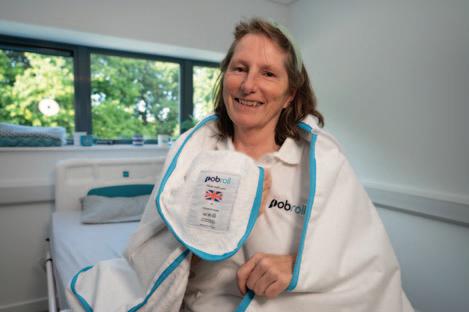
• Ease of use was rated highly, with an average score of 4.4 out of 5. Staff found pobroll® straightforward to incorporate into care routines.
• Training was rated slightly lower, at 3.8 out of 5, suggesting that while the wrap is easy to use, additional training resources could improve onboarding for new users.
Resident response was positive. Three in ten care homes reported improved mood or behaviour during bed
Written by Pat O’Brien of pobroll
bathing for dementia patients.
• Key benefits included greater warmth, coverage, and dignity for residents, especially those who might find conventional methods distressing. Some teams also found it particularly useful for end-of-life care
Would they recommend pobroll® for bed bathing for dementia patients?
Absolutely. Homes rated their likelihood to recommend pobroll® at 4.3 out of 5, with half of respondents giving it a full 5 out of 5. The overall feedback was clear: this is a valued, meaningful addition to personal care.
Would they recommend pobroll® for bed bathing for dementia patients?
The results of this trial reinforce what many professionals already believe — that small, thoughtful design changes can significantly improve care. For residents who are bedbound or living with dementia, personal care can often be a distressing experience. But with the right tools, it doesn’t have to be.
The pobroll® isn’t a complex device. It’s a simple, dual-layered cotton towelling wrap. But its thoughtful design — offering full coverage, comfort, and support — makes a real difference where it matters most.
If you’re part of a care home, hospice, or hospital and would like to explore how pobroll® could benefit your residents or service users, get in touch. We’re here to support compassionate, dignified care — one small change at a time.
See the advert on the facing page for details, or visit www.pobroll.co.uk
The World’s Biggest Coffee Morning was celebrated last week and the care sector came together to raise terrific amounts for Macmillan Cancer Support.
We want to reward YOUR incredible community spirit with a chance to win a £50 Marks & Spencer voucher!
Macmillan’s annual Coffee Morning brings millions together across the UK to raise vital funds for people living with cancer. As care homes, you understand better than most the importance of community, compassion, and supporting those who need it most. ��


We’re offering £50 Marks & Spencer Vouchers to one lucky care home that shares their Coffee Morning celebrations with us! How to Enter:
• Send us 1-2 paragraphs telling us about your event.


Funds raised (if you’d like to share)
• The atmosphere and community spirit
• Any special moments or highlights
Let’s celebrate the incredible work you do every day and the difference you’re making in the lives of those affected by cancer.
Send your entry now! nominate@thecareruk.com
A resident at Burnley home celebrated her 100th birthday and managed to receive over 100 cards to mark the day.
Della McKernan lives at MHA Heather Grange and celebrated her birthday with a party attended by her close family and friends.
The home issued an appeal asking for members of the local community to send in birthday cards for Della in a bid for her to get 100 cards.
Thankfully they did not disappoint with local schools, nurseries, other care homes, family and friends all contributing to Della receiving 128 cards.
Della received a bouquet of flowers and a card from Burnley Football Club and a telegram from the King, and the home decked out the Burnley Bar, with balloons and banners for her to celebrate her big day.
The kitchen team arranged for a birthday cake and sandwiches as well as Della’s son, Terry providing a buffet which was enjoyed by all.
Sarah Ashworth, activities coordinator said: “ We had a great time celebrating
Della's birthday and it was lovely to see the number of cards she received.
“We had live entertainment for her and made sure it coincided with the day of her birthday as she likes the music Abi sings.
“Her son bought loads of pictures of her, which we put up around the home and made a timeline of her life, which she really enjoyed.
“She had plenty of visitors including the children of her friends and that meant a lot to her.
“Della was smiling throughout the day and even had some tears of joy, the day was very special for her.
“She was over the moon with the number of flowers and cards she received, and I think her favourite was the telegram from the King.
“On behalf of the home and Della’s family I want to thank everyone who sent a card in and contributed to getting over 100 cards.
“It meant a lot to Della and her family, and we all really appreciate it”
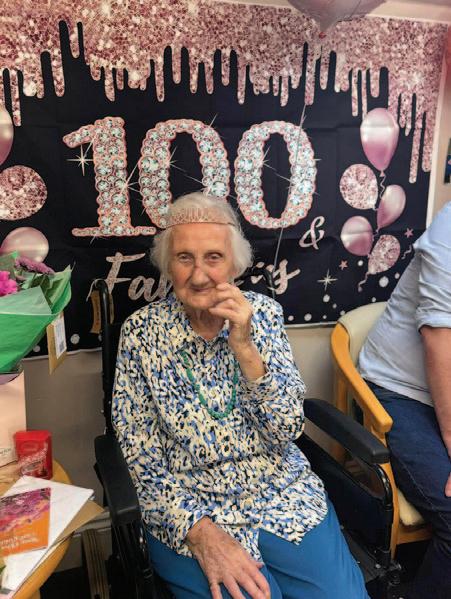
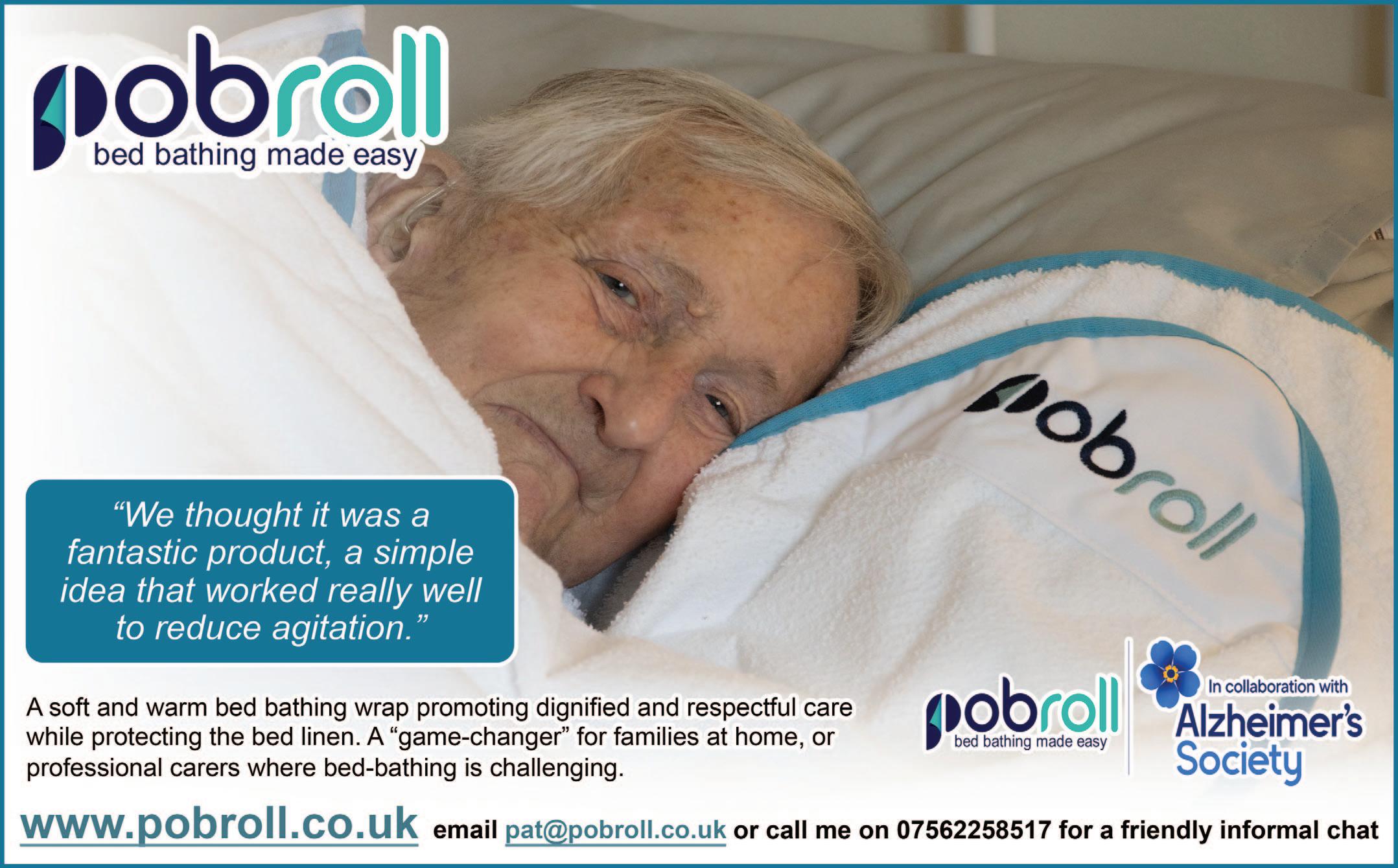

Last month saw the UK House of Lords conduct its second reading of the Assisted Dying Bill. Subject to a final consideration reported no later than November, the bill would allow those with a prognosis of less than six months to live to be provided with assistance to end their lives. This is the most consequential change to Britain’s moral and legal framework since the abolition of capital punishment.
Learning from countries where bills have previously been passed, we must consider wider societal factors as a way of mitigating preventable cases. One area demands more scrutiny: social isolation.
When people are cut off from relationships, housing and care, loneliness can become a reason to die. That possibility should chill us all.
In Canada, medical assistance in dying (MAID) was legalised in 2016 and expanded in 2021 to those not facing imminent death. Public support remains strong, but the lessons are complex. A recent review of deaths in Ontario found cases in which people qualified not because of untreatable decline but because of “unmet social needs”, such as isolation, poverty, or fear of homelessness. One anonymised case involved a man in his 40s with bowel disease and mental illness, described as “socially vulnerable and isolated.” Another was a woman with severe chemical sensitivities who sought MAID because she could not find safe housing.
These stories aren’t an argument for or against assisted dying. They are warnings. If a society legislates for assisted dying without addressing the epidemic of loneliness, some people will feel pushed toward a fatal choice.
The United Kingdom already knows it has a chronic loneliness problem. In 2018 it appointed the world’s first minister for loneliness. The NHS has pioneered social prescribing, work that connects patients to community groups, nature, the arts, or exercise, with successful outcomes. But demand far outpaces supply.
By Kim Samuel, Founder & Chief Architect, Belonging Forum (www.thebelongingforum.com)
From young carers to disabled people, from bereaved men to older adults living alone, too many remain unseen. Chronic isolation harms both body and mind, fuelling inflammation, anxiety, and premature death. It frays trust and corrodes democracy.
The Belonging Barometer, an annual survey of 10,000 UK adults conducted by my organisation, the Belonging Forum, shows a stark truth: when people feel they belong, they report better health, resilience, and civic trust. When they don’t, loneliness and despair soar.
The arrival of an Assisted Dying protocol in the UK must be enacted in tandem with a national mission to strengthen belonging. That means embedding social connection into the clinical pathway, expanding social prescribing so no one waits months for support, investing in the community infrastructure where relationships actually form, and measuring loneliness with the same urgency we measure physical pain.
These risks must also be understood within the wider issues the bill raises for adult social care. Ethical and religious objections remain, and there are serious concerns about preventing coercion and protecting vulnerable people. Some fear individuals could feel pressure to seek an assisted death to avoid being a burden on their families or the system. At the same time, the healthcare sector would face new responsibilities: developing the expertise to provide such care safely, while supporting staff who may have conscientious objections.
I hold both Canadian and British citizenship. I also hold two convictions that can, and must, coexist. First, adults deserve compassion, agency, and honesty at the end of life. Second, dignity is not only about how we die. It is about how we live together. The Canadian experience shows how quickly a society can normalise assisted dying while still neglecting the infrastructure of belonging. Britain must not repeat that mistake.
Led by Luciana Berger, the Labour peer and chair of the Maternal Mental Health Alliance, a group of peers is calling for more time to scrutinise the bill and its potential pitfalls. They must be listened to. In an open letter, the peers point to concerns raised by the Royal College of Physicians: the lack of clarity on how the law would be implemented, the reliance on non-binding codes of practice for safeguards, and the absence of provisions to ensure that medically assisted deaths are reliably recorded and investigated.
Clearly, more can be done to make this legislation safe.
As a nation, the UK must continue to ask simple questions alongside legal ones: have we done everything possible to ensure people are choosing in the presence of connection, not the absence of it?
Because a just society does not offer death to those it has left behind. It widens the circle, so that everyone has a reason to stay.
Residents at HC-One’s St Peter’s Court Care Home in Redcar and Cleveland, enjoyed a joyful day of music, movement, and celebration as they took part in a colourful “Dancing with Ribbons” activity.
The wellbeing team provided ribbons on sticks, and residents waved and danced along to some of their favourite songs. The activity brought lots of smiles, laughter, and energy to the room, with residents relishing the chance to be active while socialising with friends.
“Dancing with ribbons is such a wonderful activity for the body, mind, and soul. It was brilliant to see everyone getting involved, moving to the music, and having so much fun together,” said Wellbeing Coordinators Paul Wild and Beverley Kitching.
The day was made even more special as residents came together to

celebrate the birthday of fellow resident, Lynn. The celebration added to the atmosphere of joy and togetherness, making it a memorable occasion for all.
Among those who took part in the day’s festivities were residents Lynn, Marg, Stuart, Doreen, Freda, Julie, Mauren, Iris, Val, Kath, Leila, Elaine, and Brenda.
Paul and Beverley added: “What a brilliant day it has been, filled with music, dancing, and celebration. Our residents truly enjoyed every moment.”
HC-One’s St Peter’s Court Care Home is dedicated to providing engaging activities that enhance wellbeing, helping residents stay active, connected, and happy.
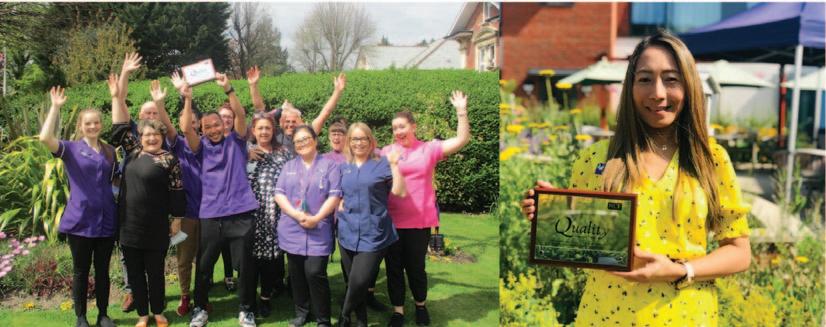
The Gold Standards Framework (GSF) Charity equips your team with the skills, confidence, and compassion to deliver person-centred care that truly makes a difference.
For a limited time, the GSF Care Homes Training & Accreditation Programme
This affordable, high-impact training is designed for your whole organisation
GSF Accreditation is CQC-recognised, endorsed by leading care organisations, and more than 97% of accredited teams report better experiences for people and their families.
For more information, visit: www.goldstandardsframework.org.uk / 020 7789 3740 Future-proof your care. Empower your workforce. See the advert on page 7 for more information.

At Waterhouse Manor care home in Cambridgeshire, residents are encouraged to reconnect with past interests and experiences that have shaped their lives. For resident Fred Day (91), a retired Methodist minister, this meant revisiting a pastime he had long associated with his younger years: building sandcastles.
Fred spoke of how as a young man, he created large, detailed sandcastles— often complete with moats.
Fred recalled occasions spent on beaches in Sitges, Barcelona, Faro, Portugal, and Poppet Sands, Cardigan Bay.
Although Fred hadn’t visited a beach in a long time, the team at Waterhouse Manor were determined to help Fred revisit his much-loved hobby. Emma Tiley, Lifestyle Manager at Waterhouse Manor, organised to accompany Fred on a trip to Anglesey Abbey and Gardens, where acclaimed sculptors, Sand in Your Eye, were constructing a sand replica of the Abbey.
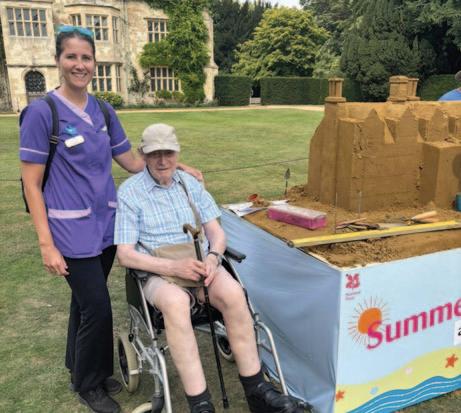
Fred was invited to observe their work at close quarters, talking to the sculptors as they demonstrated their craft.
Fred was impressed by the simplicity of their tools compared with the intricacy of their creations, saying, “The tools were nothing fancy, the skill was in their hands.”
Also joined by his daughter, Fred spent the afternoon carefully shaping turrets and carving moats on his own sand table, while reminiscing about summers past.
When asked what drew him to sandcastle building, Fred replied, “I don’t know, I just love doing it! If it wasn’t a sandcastle, it was a dam—we would build it, fill it with water, and watch it trickle back to the sea.
There’s a little boy inside of me and I’m not ready to let him go yet.”
Emma Tiley added, “It was an absolute privilege to make Fred’s wish a reality, what made it even more special was having Fred’s daughter with us too.

famed Albert Dock where the conference is taking place.
Care home operators and social care providers marched through Liverpool city centre on 29 September, calling on government to address what they describe as a funding crisis threatening the future of community care services.
The demonstration, organised by campaign group Providers Unite, drew providers, staff, residents and supporters from all over the UK.
The procession began at Liverpool Cathedral at 11:30am and concluded outside of the Arena on Liverpool’s
Providers voiced concerns about cumulative financial pressures facing the sector, particularly recent legislative developments including the Employment Rights Bill and proposals for a Social Care Fair Pay Agreement. These follow earlier cost increases from changes to National Insurance contributions and National Minimum Wage announced in the previous government’s budget.
According to organisers, the sector requires an additional £8.7 billion by 2028/29 to achieve pay parity with NHS staff. The campaign argues that without sustainable funding increases, new employment legislation will impose wage costs that many providers and service users cannot absorb.
The march formed part of the wider #CareCannotWait campaign, which unites care homes, supported living providers, children’s services, mental health organisations and other community care sectors. This follows an earlier Day of Action held in February.
Campaign organisers estimate the legislation could affect over 10 million people when accounting for care recipients, unpaid family carers, and sector employees.
THE CAMPAIGN IS CALLING FOR THREE KEY COMMITMENTS FROM GOVERNMENT:
Recognition of social care’s essential role, noting that four in five people will require care services during their lifetime and arguing the sector deserves greater acknowledgement from policymakers.
A fully funded Fair Pay Agreement for social care workers, highlighting that the sector employs 5.8% of the UK workforce – a larger proportion than the NHS.
Sustainable investment in community care services, warning that without urgent funding commitments, millions could lose access to vital support as providers struggle with rising operational costs.
The demonstration brought together representatives from residential care homes, domiciliary care agencies, specialist children’s services, mental health providers, day centres and advocacy organisations.

Speaking to Carer Editor Peter Adams who attended the march, Nadra Ahmed CBE a executive co-chair of the National Care Association said: What a great, great morning, and to think that on a Monday Morning so many care providers were able to come away, I know many couldn’t, but with the atmosphere, the messaging the passion with which people have marched today and got so much acknowledgement from the people driving by shows just how valued social care is, and our message really is just acknowledge social care and the amazing contribution we make, and for the government to stop avoiding the question on how we are going to stabilize our sector to make sure that it is available for everybody who needs it”
Mike Padgham chair of the Independent Care Group also shared his views, “Fantastic support we have had today from the people of Liverpool, and also to see so many care providers from across the UK, we have to show the government that we have had enough delays over three decades, if the government wants to be bold it must sort social care out now, you cannot fix the NHS without fixing social care”.
Asked what would be the number one priority Mike added: “We have got to get funding in so we can pay social care staff on the front line as much as they get in the NHS, thats the key thing from my perspective, staff pay”!
Residents Jenny, Enid, and Joan from Melbourn Springs Care Home recently enjoyed a delightful day out at Shepreth Wildlife Park, where they explored the enclosures and met a variety of animals. From curious meerkats to lively lemurs, the visit was filled with smiles, laughter, and plenty of memorable moments.
Travelling in the comfort of the home’s minibus, the group set off on a sunny autumnal morning, ready for a day of discovery and fun. The outing was part of Melbourn Springs’ commitment to providing enriching experiences in the wider community, giving residents the chance to reconnect with nature and enjoy a refreshing change of scenery. “It’s so important to create opportunities for our residents to enjoy life outside the
home,” said Vimu, Acting General Manager at Melbourn Springs. “Days like this bring joy, spark conversation, and help build lasting memories. They also support emotional wellbeing, encourage social interaction, and offer a sense of adventure.” “I loved seeing the lemurs—they were so full of energy!” said Enid, one of the residents who took part. “It was a beautiful morning and lovely to spend time somewhere different.”
Trips like these are designed to enhance quality of life, promote independence, and provide meaningful engagement for residents—whether it’s through meeting animals, sharing stories, or simply enjoying the fresh air.
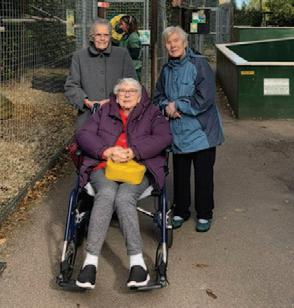

Cotman House Care Home in Felixstowe is one of more than 200 care homes in England to now have Veteran Friendly Framework status. The home is part of the Caring Homes group, and cares for 27 veterans or their partners. The VFF helps homes provide tailored support and care to veterans and their partners. Cotman House Home Manager Kirsty Allen and VFF Champion Chantal Sencier discuss the impact it is having on the home and its residents.
Chantal Sencier: We heard about the VFF through other veteran groups in the Felixstowe community. We also had a Sales Manager join Caring Homes who had been involved with the VFF in the past and was a great advocate. She was very keen that Caring Homes committed to all its homes completing the Framework, not just Cotman House. So that’s what is happening – the group has signed up all 18 of its care homes in England, which is unique I think!
Kirsty Allen: It’s really exciting that Caring Homes is dedicating its time to include all its homes in England, so that we can look after our veteran residents properly.
‘I WAS UNSURE ABOUT THE VFF AT FIRST… BUT I WAS SOON HOOKED.’

KA: I can’t lie, I was apprehensive about committing to the VFF when I first heard about it. I already had an incredibly busy job and I thought that it would be super-stressful. When we had our first meeting with Jules from the VFF I was honest with her and told her I didn’t really have the time to do this. But then we started to go through the process step-by-step and the first thing we did was identify our veterans. That set off a spark and I was hooked! We were speaking to residents, emailing family members, and discovering their stories, and seeing their old photos and learning so much about them, in a way that we’d never have done without the VFF. And then that sparked conversations with our residents and it was really beautiful.
CS: I think there's probably five or six residents here that we didn’t know were veterans until we'd spoken to their families. We were aware of some veterans in our home already. There's quite a big military presence – there’s the training base at Shotley. HMS Ganges wasn’t far from here, and we have some Ganges Boys with us. We have a WWII veteran who served on a Russian convoy delivering weapons, and another who took part in the D-Day landings. But with some residents, even though we knew they were veterans, we didn't know what they had done in the military. Thanks to the VFF, we do now. For instance, we have a resident who drove a tank. We’d known he was in the military, but we didn't realise he was a tank driver!
CS: One of our D-Day veterans actually had a visit on his ship from Winston Churchill after the war had ended.
KA: We’ve gathered all these stories because of the VFF, without it we wouldn’t have known nearly so much.
KA: So after gathering this information, we then started filling out care plans and putting poppies on the doors to identify our veterans. And then Chantal and I reached out to different community groups.
CS: We’ve reached out to cadet groups and the Royal British Legion. We already had a good relationship with the likes of Felixstowe Museum and Languard Fort. We’ve made contacts with the GPs and the hospital as well.
CS: Being part of the VFF has just massively expanded our contacts, in particular contacts with healthcare professionals that we didn't even know existed. It’s because of the VFF that we learned Ipswich Hospital has an Armed Forces Covenant Officer that deals with all veterans coming through the hospital. They’ve been able to point patients that are veterans in our direction at discharge because they know that we understand that journey for veterans and areas where we can maybe give added value to their care.
KA: I found that the VFF complemented the work we were already doing. Like Chantal said, we already
had good relationships with groups in our community, and we're regularly asked to attend commemorative events. So once we got going it was quite smooth process and it didn’t take long to complete – just a month or two. I actually found when I was facing challenging issues, I would stop and do some VFF work because I really enjoyed it, like updating care plans, talking to residents, building a personalised plan, spending time with the staff, and discussing their family military service.
CS: Through the VFF we found out that we had loads of staff who are military wives currently with husbands serving, or overseas staff who have sons now in the British military, which is really cool. So the whole home was excited to be a part of the VFF.
KA: Something our staff have really embraced as well is to learn about our residents. We owe our veterans so much, and our staff sit down and talk to the residents, to share their stories. It's brought everybody, residents and staff, closer together because everybody has got those experiences somebody's got a grandad or a grandma that has served. So it has brought everybody closer together and we've managed to gather those stories.
KA: I wish we had done this project a bit earlier because we had a Navy veteran and he was living with dementia and he believed that because he could see the sea from the home that we were on his ship. His behaviour could be quite challenging and he could become quite distressed, and I think that if we’d known what we know now we would have been able to support him and understand him much more. The whole team now have a better understanding of the military service and what it means to our veterans. So I think it would have just given us so much more understanding, especially for residents living with dementia, to go into their world a bit more. We were aware of his background and his service, but we weren't as knowledgeable as we could have been. But we are now.
‘SHE WAS ABSOLUTELY INCREDIBLE.’
CS: Completing the VFF was a pretty straightforward process, thanks partly to Jules, our VFF Project Officer. We just can't sing her praises enough. She kept us motivated and was very positive. She was absolutely incredible.
KA: Another thing to point out is the VFF boosts all residents in the care home, not just the Armed Forces family. They all have an interest in it. And when we have visits from groups like the Air Force cadets, it lifts the whole home. It’s not just benefitting the veteran community, it’s benefitting everyone.
CS: I think we’d all recommend the VFF, and Kirsty has become quite the ambassador for other Caring Homes signing up now. She’s a great advocate because she can be honest and tell other home managers about the doubts she had at the beginning and how they were quickly dispelled.
KA: It also created conversations between me and other managers in the group that were going through the process, because we were able to share stories about our different veterans and come up with ideas. I was talking to one of our other homes which has VFF status and we’re going to create a poppy link, and it will link to all VFF Caring Homes.
KA: The VFF has allowed us to get to know our resident better and improve the level of person-centred care we provide. And the residents have enjoyed coming on the journey with us. We’re creating a Hall of Fame and putting up their stories and photos and they’re really excited. There’ve been really passionate and proud to talk about what they’ve done.
Any care homes interested in receiving more information about the VFF can visit https://veteranfriendlyframework.org.uk, email VFF@starandgarter.org or call 07425 326070.

Karuna Manor Care Home was filled with devotion, colour, and joy as residents, families, and team members came together to celebrate Ganesh Chaturthi and the traditional Visharjan.
The celebrations reflected the vibrant culture and heritage that Karuna Manor proudly embraces, while also bringing residents a deep sense of belonging, peace, and happiness.
The festival began with the welcoming of Lord Ganesha’s idol into the home, beautifully decorated by residents and team members with flowers and lights. Traditional prayers and devotional songs filled the atmosphere, offering residents a chance to connect with their spiritual roots.
Over the 10 days, residents participated in daily aarti, storytelling sessions about Lord Ganesha’s wisdom, and cultural activities such as singing and sharing personal memories of past celebrations.
The celebration concluded with the symbolic Visharjan ceremony, where residents and their families joined together in prayer, followed by a respectful immersion ritual carried out in an eco-friendly way. This final act symbolised not just devotion, but also the values of care for the environment and gratitude for shared moments of joy.
Speaking about the celebrations, Home Manager, Payal Chhabra, said: “At Karuna Manor, we take pride
in creating a true home for our residents, where traditions are honoured, and every celebration brings people together. Ganesh Chaturthi is a festival of joy, unity, and devotion, and it was heart-warming to see our residents smile, sing, and feel the love of their families and community. The Visharjan was especially emotional, as it gave everyone the chance to reflect and celebrate together in harmony.”
For residents, the event was more than just a festival—it was an opportunity to relive cherished memories and create new ones. Mrs. Patel, a resident at Karuna Manor, shared:
“I have celebrated Ganesh Chaturthi all my life, but to see it celebrated here with such devotion makes me feel at home again. The prayers, the music, the decorations—everything reminded me of the times with my family. I felt blessed to be part of this celebration with my friends here.”
Payal added: “The Ganesh Chaturthi and Visharjan celebrations at Karuna Manor exemplify the home’s commitment to holistic care—nurturing not only physical wellbeing, but also emotional, cultural, and spiritual fulfilment. Events like these highlight the importance of community, togetherness, and the belief that every resident deserves a life filled with joy, respect, and meaning.”

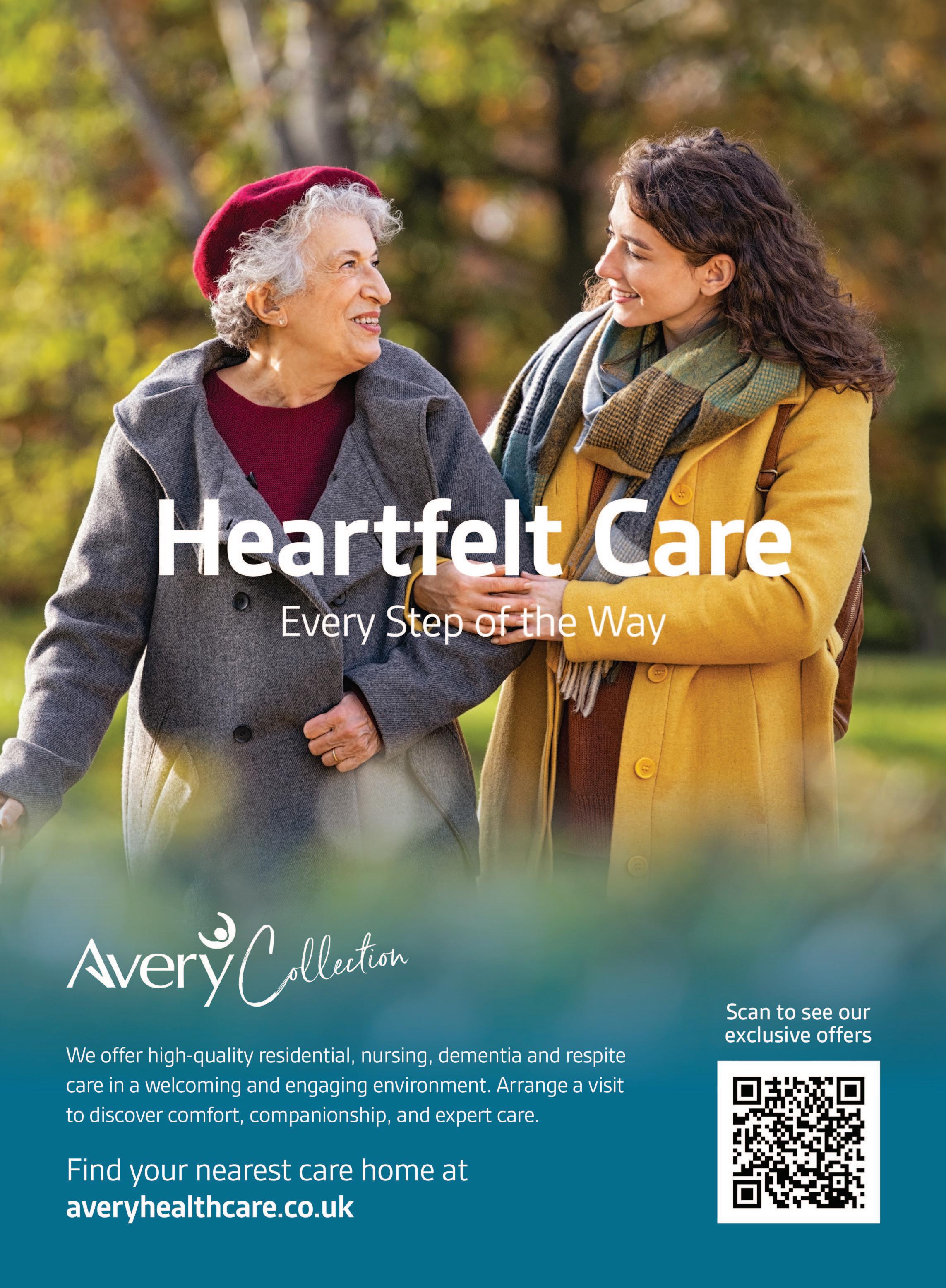


The adult social care sector has responded with cautious optimism to the government’s announcement of a £500 million investment towards England’s first Fair Pay Agreement for care workers, though providers have raised questions about whether the funding will prove sufficient to meet the wage expectations being created.
Health Secretary Wes Streeting unveiled the landmark initiative at Labour’s conference in Liverpool, confirming that a new negotiating body comprising employers and trade unions will be established in 2026, with the first agreement coming into force in 2028.
Whilst sector leaders have welcomed government recognition of care workers’ value and the principle of collective bargaining, many have emphasised that the investment must be accompanied by sustainable long-term funding to prevent providers absorbing unmanageable cost increases – particularly given existing financial pressures from National Insurance contributions, National Living Wage rises, and the Employment Rights Bill currently progressing through Parliament. EWAN KING, CHAIR OF THE CARE PROVIDER ALLIANCE SAYS:

“£500 million to fund a Fair Pay Agreement is a start, but realism is required. Twothirds of care is funded by local government and the NHS, and there are the equivalent of 1.27 million full time roles in England’s care workforce. This new funding runs the risk of being thinly spread and going largely unnoticed.
“Any commitments around pay and changes in employment rights more broadly rely on councils continuing to increase local taxes. The reality is many of the 23,000 adult social care providers in England are already battling to keep their heads above water in the face of rising costs and Local Authorities underfunding key services.
“Alongside funding, making a social care Fair Pay Agreement a success requires a properly resourced negotiating infrastructure, a shared understanding of the data needed to inform pay negotiations and for Ministers to look at how care is commissioned.
“Providers are committed to ensuring a Fair Pay Agreement delivers for care workers and the launch of the government consultation today on the Fair Pay Agreement is a positive milestone. We urge providers to submit their views on how central government will enforce pay and benefits for their workforce.
“The care and support system supports a growing aging population, disabled people and people experiencing mental ill health. It is made up of a highly-skilled, low-paid workforce that is larger than the NHS. The Fair Pay Agreement is just one piece of a jigsaw for making social care the high-status career it should be.”
DANNY MORTIMER, CHIEF EXECUTIVE OF NHS EMPLOYERS, SAID:

“This is a positive next step in ensuring investment in the social care workforce.
Government, social care employers, and trade unions have worked diligently to get to this stage, and they will need to continue in the same spirit of partnership as they work to build a sustainable pay and reward offer for the vital social care workforce.”
SARAH WOOLNOUGH, CHIEF EXECUTIVE OF THE KING’S FUND, SAID:

‘The government today has set out its bold plans to modernise how the British public can access health care.
‘The funding for a Fair Pay Agreement for social care has been much anticipated and will make a positive difference to people working in the sector. It will also help to drive recruitment especially at a time when migration rule changes mean the sector will rely on attracting more British workers. However, it will be some time before we know what the £500 million will mean for
social care workers when a fair pay agreement is implemented in 2028. Unions and providers now need to negotiate how that sum of money will be spent and what level of pay increase it will fund. While it won’t solve all long-standing recruitment issues by itself, it is a welcome downpayment on a long-term solution.
‘Social care providers will want to be sure that the funding fully covers the costs to them, otherwise there could be a risk of a range of unintended consequences such as higher fees for people buying care or a reduction in quality. It will also be vital to ensure a future Fair Pay Agreement is tied into wider sector reforms being developed by the Casey commission.’
LUCINDA ALLEN, POLICY FELLOW AT THE HEALTH FOUNDATION, SAID:

‘It is good news that the government is looking to improve pay and conditions in social care. For too long, care workers – who are mostly women – have been underpaid, leaving many in poverty. Addressing this is not just a matter of fairness; it’s fundamental to building a resilient, high-quality care system. Underinvestment in the workforce contributes to persistent staffing shortages, which can impact the quality of people’s care. The public consultation launched today is an important step forward.
‘Fair pay agreements have the potential to be transformative, but ambition must be matched by investment. Today’s announcement of £500 million funding for the first Fair Pay Agreement in social care in England will not be enough to provide a meaningful boost in staff pay. Shared evenly between the 1.5 million workers in the sector, for example, it could amount to roughly 20p extra per hour each. Our analysis suggests £2.3 billion would be required in 2028/29 to increase pay to the level of clinical support workers and administrative workers in the NHS (Agenda for Change Upper Band 3).
‘If wages rise without more government funding, costs will fall on councils and providers – ultimately, this risks cuts to people’s services and higher fees for those who fund their own care. The government must commit to sufficient and long-term funding for its flagship social care policy and work closely with those who need and provide care as they design this policy.’
MARTIN GREEN OBE, CHIEF EXECUTIVE OF CARE ENGLAND, SAID:
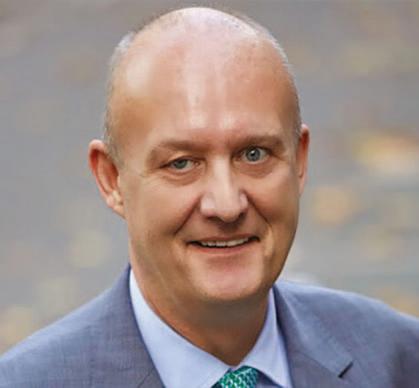
“While the creation of a Fair Pay Agreement represents a long-awaited acknowledgement that care work is a skilled profession deserving of fair reward, today’s announcement does little to deliver any meaningful change for our workforce. It is a shame that after so many promises, the outcome amounts to as little as 15 pence per hour if focused solely on pay; something that will make little difference in practice by the people who keep this sector running.
For a workforce of 1.6 million people, more than those employed in the NHS, yet still among the lowest paid in our economy, such a limited commitment sends the wrong message about their worth. The Government has raised expectations by branding the Fair Pay Agreement as the answer to the recruitment and retention crisis in the sector, using it to justify the restrictions placed on international recruitment, which many providers previously depended on to keep services running. But with funding this slight, it is hard to see how providers will attract or retain the staff they desperately need, undermining the very purpose of the agreement.”
The Government has confirmed that the new negotiating body will be convened in 2026, with the first round of negotiations commencing 2027, which means care workers will not see any significant improvement in their pay and benefits from this process until 2028 at the earliest.
Crucially, this figure does not account for the erosion of pay differentials that has already taken place following last year’s cost pressures, nor does it allow for inflation over the next three years. Many providers were unable to uplift wages as they would have wished because of the additional burden created by the Chancellor’s increase in Employer National Insurance Contributions.
Professor Martin Green OBE continued: “We recognise this is a journey and that multiple agreements will follow, but the scale of today’s commitment is simply not enough to tackle the immediate challenges
to recruit and retain staff that lie in front of us. If the Government truly wants to value the care workforce, it must dig deeper. This announcement may mark a step forward, but without meaningful investment in the years ahead, the sector will continue to see staff leaving at a time when they are needed most.”
NUFFIELD TRUST DEPUTY DIRECTOR OF RESEARCH NATASHA CURRY
SAID:
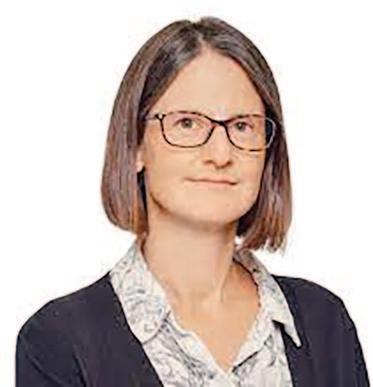
“Care workers have been poorly paid and undervalued for too long, with many not even paid the bare minimum needed to travel and to provide support for the hundreds of thousands of people in need of care.
“So it’s absolutely right that the Secretary of State is highlighting this today and the Government’s fair pay agreement offers recognition that action is needed to improve pay and conditions of care workers.
“The bear trap in today’s announcement is – as is so often the case –the money. This extra £500m, already announced at June’s Spending review, is not new, will not arrive until 2028, and will need to come from funds already needed to keep social care afloat and meet the needs of the people that rely on it.
“The spending pressures on social care cannot be overstated: the extra needed this year for additional employers national insurance contributions more than wipes out this £500m. The agreement will also rest on extensive negotiations through the new negotiating body –which will now have to be constrained by this figure.
“As always, good intentions and sound motives cannot balance the books. The fair pay agreement is the right thing to be doing but it won’t work unless properly funded.”
VIC RAYNER, CEO OF NCF COMMENTED:

“After months of speculation, the government has put on the table the public funding they are making available to back their flagship Fair Pay Agreement. This announcement triggers the launch of a consultation period on key areas, including who is included in an agreement, what it covers in relation to pay, terms and conditions, how the negotiations will operate in practice, and enforcement.
“As part of the Care Provider Alliance, we have been clear all along that it is not possible for aFair Pay Agreement to deliver without properly addressing issues associated with how care is commissioned, long term sustainable funding commitments, a properly resourced negotiating infrastructure and a shared understanding of the data needed to inform negotiations.
“As the voice of the not-for-profit care and support sector, we will be encouraging our members to engage in the consultation on the Fair Pay Agreement. Their insights, experience, and evidence are essential to building a Fair Pay Agreement that works for providers, our brilliant workforce, and the people who draw on care and support.”
NARDA AHMED CHAIR OF THE NATIONAL CARE ASSOCIATION SAID:

“The importance of the fair pay agreement for the adult social care workforce has long been held up by this government as a beacon of hope for an undervalued workforce.
“The announcement this afternoon of a £500 million envelope of investment can only be considered as a starting point. Substantially more money will be needed to get anywhere close to being able to deliver the visionary national care service so often heralded. Our workforce deserves a more realistic investment which will recognise the skills and contributions made by them.
“The Secretary of State must recognise the role of social care in the wider health economy which means a more realistic investment is critical, offering pennies only devalues the incredible work which has been going on behind the scenes by stakeholders throughout this process to ensure a strong path for our workforce and sector.
“As always, the devil is in the details. NCA is committed to working with government and stakeholders to ensure this agreement makes a real difference to our workforce.”

Hugh Myddelton Care Home is proud to announce that it has been awarded the Silver Medal for The Best Communal Garden category at this year’s prestigious Enfield in Bloom competition.
The award celebrates the home’s dedication to creating a welcoming, vibrant, and eco-friendly garden space that brings joy to residents, staff, and visitors alike.
The recognition is especially meaningful as the gardens are lovingly maintained with the help of residents, reflecting the home’s strong community spirit and commitment to well-being through nature.
“We are absolutely delighted to have been recognised in Enfield in Bloom,” said Jade Shea, Home Manager at Hugh Myddelton Care Home.
“Our garden is not just a beautiful space it’s a source of comfort, activity, and pride for everyone here. This award belongs to our entire community who have worked so hard to make it flourish.”
Hugh Myddelton Care Home would like to extend a big thank you to Volunteer Pat Shackleton and Residents' Ambassador Rosa Bertolino for their incredible effort and continued support of the garden. Their enthusiasm and commitment have been key to the garden’s success.
Jade add: A heartfelt thank you also goes out to all the staff at Hugh Myddelton, with a special mention to Gunel Bayramova and Miguel Almeida, who have gone above and beyond in maintaining the garden and ensuring it remains as beautiful as it is today.
The Enfield in Bloom competition, held annually, honours the best in gardening and environmental efforts across the borough, encouraging schools, individuals, and organisations to transform their outdoor spaces into green havens.
This year’s silver medal is a testament to Hugh Myddelton’s ongoing commitment to enhancing residents’ lives through meaningful outdoor experiences and community involvement.
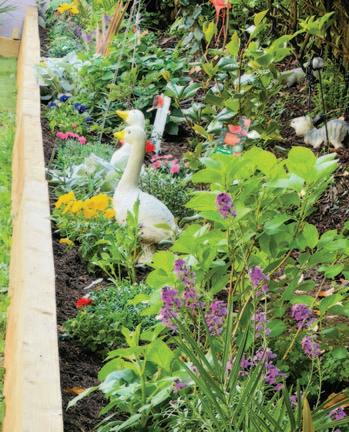
In honour of Inclusion Week, Southgate Beaumont in Southgate hosted a “Taste of the World”, a special event where employees brought in and shared dishes from their cultural backgrounds. The initiative, part of the company’s annual Inclusion Week celebrations from 15th September to 21st September, highlighted the diverse cultures that make up the organization’s workforce.

The event transformed Southgate Beaumont into a global culinary festival, featuring dishes that ranged from Nigerian jollof rice, Rice and peas from Jamaica, Puff Puff from Cameroon, Cheese and Meatballs from Romania, Tea and cakes from the UK and desserts from Philippines.
Employees shared the stories and traditions behind their food,
fostering a deeper connection and appreciation for one another’s heritage.
“Inclusion Week is a powerful reminder that our strength lies in our differences. The Taste of the World was a perfect example of that. It was amazing to experience so many different flavours and stories from around the world without leaving the office. It’s truly inspiring to work somewhere that celebrates our unique cultures” – said Beatrice Godfrey, General Manager
Ana Balie, Healthcare Assistant mentioned:
“It was a wonderful opportunity for us to step away from our desks and connect on a personal level, using food as a universal language.”



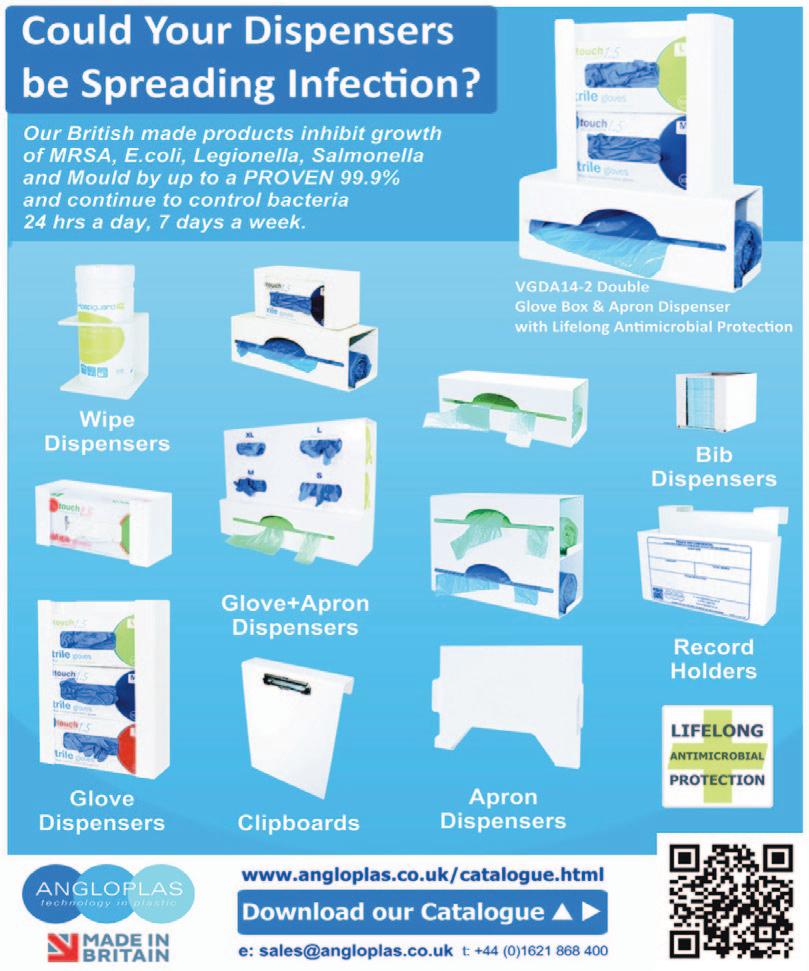
Creative activities are a vital contribution to fulfilling the lives of residents at Care UK homes. Lifestyle teams constantly encourage residents to pursue lifelong passions and explore new hobbies through imaginative and creative pursuits.
Engaging with the arts, and taking part in activities like drawing or collaging, is incredibly beneficial for care home residents, including those living with dementia.
Artistic pursuits can provide an alternative method of communication, encourages social connection, allows residents to express their emotions in a new way, and, most importantly, can be an opportunity to reminisce.
As part of The National Day of Arts in Care Homes 2025 – which takes place on Wednesday 24th September – Care UK colleagues have gathered stories of their favourite art projects to share. These ranged from learning about folklore, to creative upcycling, and highlight the importance of ongoing community connections.
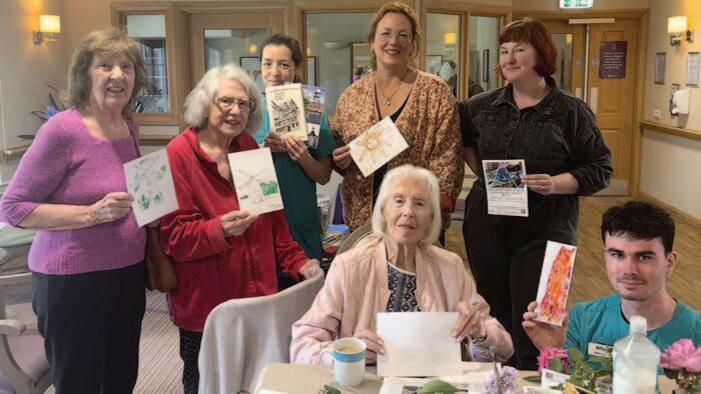
In Harrow, Buchanan Court care home engages residents in various creative projects throughout the year. Most recently, residents collaborated with a local school to create a display using recycled shopping bags made from old t-shirts.
This initiative not only fosters creativity but also ensures residents feel connected to the local community and promotes the benefits of intergenerational working. Visitors were then invited to the care home to admire the hard work of students and residents.
Earlier this summer, residents at Mountfitchet House in Stansted welcomed the county council-funded Legendary Essex project for an art workshop. Residents began by discussing folklore art and sharing any extraordinary experiences they had encountered throughout their lives. They explored various mediums before selecting the materials they wanted to use and deciding on the type of artwork to create.
Each resident then produced a piece of artwork to contribute to the broader Legendary Essex project,
which will be featured in the group's exhibition at the medieval Old Sun Inn in Saffron Walden in September.
Epsom-based care home, Appleby House, offers a range of creative therapies, including arts, crafts, and music. The care home's ‘Appleby Tate Gallery’ provides a platform for residents to showcase their artwork. Appleby House was also the first care home in the UK to take part in Art Explorer, an initiative which allows virtual visits to art galleries around the world and real-time interaction with the works on display.
The Potteries in Poole hosted a special t-shirt making session, bringing residents, community members, and their loved ones together for a heartwarming experience.
Participants painted their arms with colourful swirls and then hugged a partner wearing a plain white T-shirt, creating a unique, colourful imprint.
This event, timed ahead of Mother's Day, allowed families to create a lasting keepsake with their mother or loved ones. The session promoted cognitive engagement, emotional wellbeing, and relationship-building in a fun, interactive environment.
St. Vincent's House care home in Hammersmith recently hosted a vibrant Arts and Culture Show, celebrating the power of arts in care homes. The event's highlight was a special donation ceremony, where the care home presented £325 to TimeGivers, an intergenerational partner dedicated to combating loneliness. This donation was made possible by funds raised during a community gathering.
The celebration continued with Art for Diversity, featuring colleagues showcasing their heritage through traditional dances and performances, promoting creativity, cultural exchange, and mutual respect. By embracing arts and creativity, Care UK homes continue to unlock new possibilities for residents, where they can find creative purpose and joy as part of their day-to-day lives.
To find out more about the activities offered at Care UK, please visit: www.careuk.com/life-at-a-care-uk-home/lifestyle/activities-and-outgoings
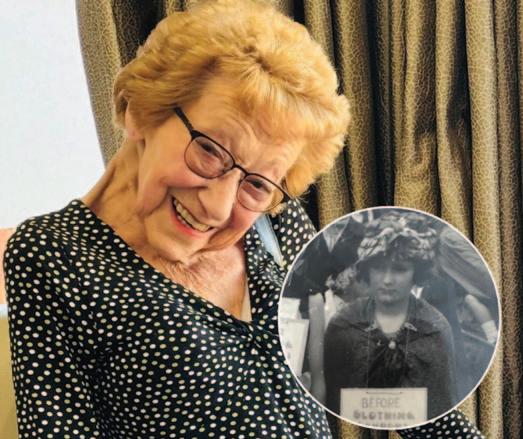
As children settle into a new school year, residents at Heath Lodge in Holt have been looking back on their own early days in the classroom.
Stan Parry (97) who began school in 1937 at an all-boys school, recalls lessons that took place entirely in one classroom.
Stan said, ‘We stayed in the same room all day and learned various subjects. I didn’t have school dinners — just a packed lunch in a brown paper bag. Sometimes jam sandwiches, sometimes dripping. During the war, we only had meat once a week.’ ‘In the playground we played tag, or sometimes on the rooftop of the school. If we had a fall-out with another boy, the teacher would put us in the boxing ring to sort it out!’
Once a week, Stan and his classmates would go to the local baths for swimming. “It doubled as a laundry for the local women, who paid a shilling to wash clothes in the hot water.”, Stan said.
Mary Butcher (93) who grew up just opposite Holt Primary School on Valley Lane, has equally vivid memories of wartime school life. Mary said,
‘Every Friday, my mum would bake cakes and bring them over to the playground for me and my friends. We were always excited about that!’
Mary also spoke of how the war affected school life, saying, ‘We only had half a week at school so that evacuees could take the other half of the week for lessons. We also had to carry gas masks every day, just in case.
‘School was different back then, but we had our fun. Even in tough times, there was always something to smile about.’
After hearing the residents’ memories of their schooldays, Hazel Madden, the General Manager at Heath Lodge said, ‘Listening to residents share their school memories reminds us how resilient and resourceful children were during those challenging times. It’s wonderful to see them passing on their experiences with younger generations.’

You can find out more about Heath Lodge residents’ school memories during the home’s weekly Cake and Coffee Afternoon every Wednesday from 14:00, where all are welcome for a hot drink and homemade refreshments.
Care Inspections UK (CIUK), the UK’s only accredited inspection body for care homes, has launched a pay-asyou-go inspection service aimed at helping care homes improve quality, performance, risk management, and regulatory ratings in the face of the increasing costs affecting the social care sector.
To ease cash flow during rising National Insurance and wage pressures, the subscription service offers care homes structured, evidencebased support to navigate compliance challenges effectively. To add to this support, CIUK is offering up to £100 per month off all new subscriptions for twelve months for signups in May 2025.

Designed to accommodate a range of operational needs and budgets, the three-tiered subscription model, Silver, Gold, and Platinum, offers varying levels of inspection frequency, expert guidance, and action plans tailored to each home’s requirements.
Under the Silver plan, care homes receive an annual comprehensive inspection carried out by experienced, accredited professionals. The resulting detailed report includes a full breakdown of every aspect of the care home, along with easy click-through access to relevant standards, regulations, and best practices. An action plan is provided to
cover any non-conformances, with ongoing review and support to ensure continuous progress. Homes that meet the required thresholds will be awarded a certification, signifying excellence in care provision. Additional benefits include advisory support before and after inspections, access to exclusive online events and forums for networking and best practice sharing, and participation in CIUK-led publicity initiatives designed to highlight high standards of care. CIUK also guarantees that, by fully implementing all aspects of the action plan, homes will see improvements in their regulatory ratings (CQC, CI, CIW, RQIA), giving providers added assurance that their investment in quality improvement will yield tangible results.
The Gold tier builds upon the Silver plan by offering additional regulatory and commissioning pre-inspection tools. This deeper level of service helps care providers prepare more effectively for formal inspections, giving them an edge in demonstrating compliance with industry standards. Gold members benefit from an in-depth assessment of their readiness for external regulatory visits, with tailored support that helps anticipate potential concerns and address them proactively. In addition to all the features of the Silver package, Gold subscribers receive a more comprehensive level of preparatory guid-
ance, ensuring that homes meet and exceed industry expectations.
The Platinum package is the most comprehensive offering, providing two inspections per year to ensure that care homes maintain consistently high standards throughout the year. Alongside the core benefits found in the Gold and Silver plans, Platinum members gain access to detailed analysis of inspection trends, helping care homes identify recurring issues and implement long-term solutions for sustained compliance and excellence. Additional advisory support is extended to Platinum members, ensuring they have ongoing expert guidance in regulatory matters, risk management, and quality improvement. This elite tier is particularly beneficial for larger care providers or those undergoing transitions, such as ownership changes or expansion, who require higher scrutiny and support.
Kevin Groombridge, chief executive at Care Inspections UK, said: “Our mission is to raise standards in the care sector by providing accessible, evidence-based support. This subscription model equips care homes with the tools to enhance compliance and deliver the highestquality care.
With rising costs placing additional pressure on the sector, for only a couple hundred pounds a month, our service offers expert guidance and regular inspections to help providers navigate these challenges. By following our structured action plan, care homes can guarantee an improvement in their regulatory ratings, ensuring better outcomes for both residents and staff.”
Visit www.careinspections.co.uk or see the advert on the facing page for details.
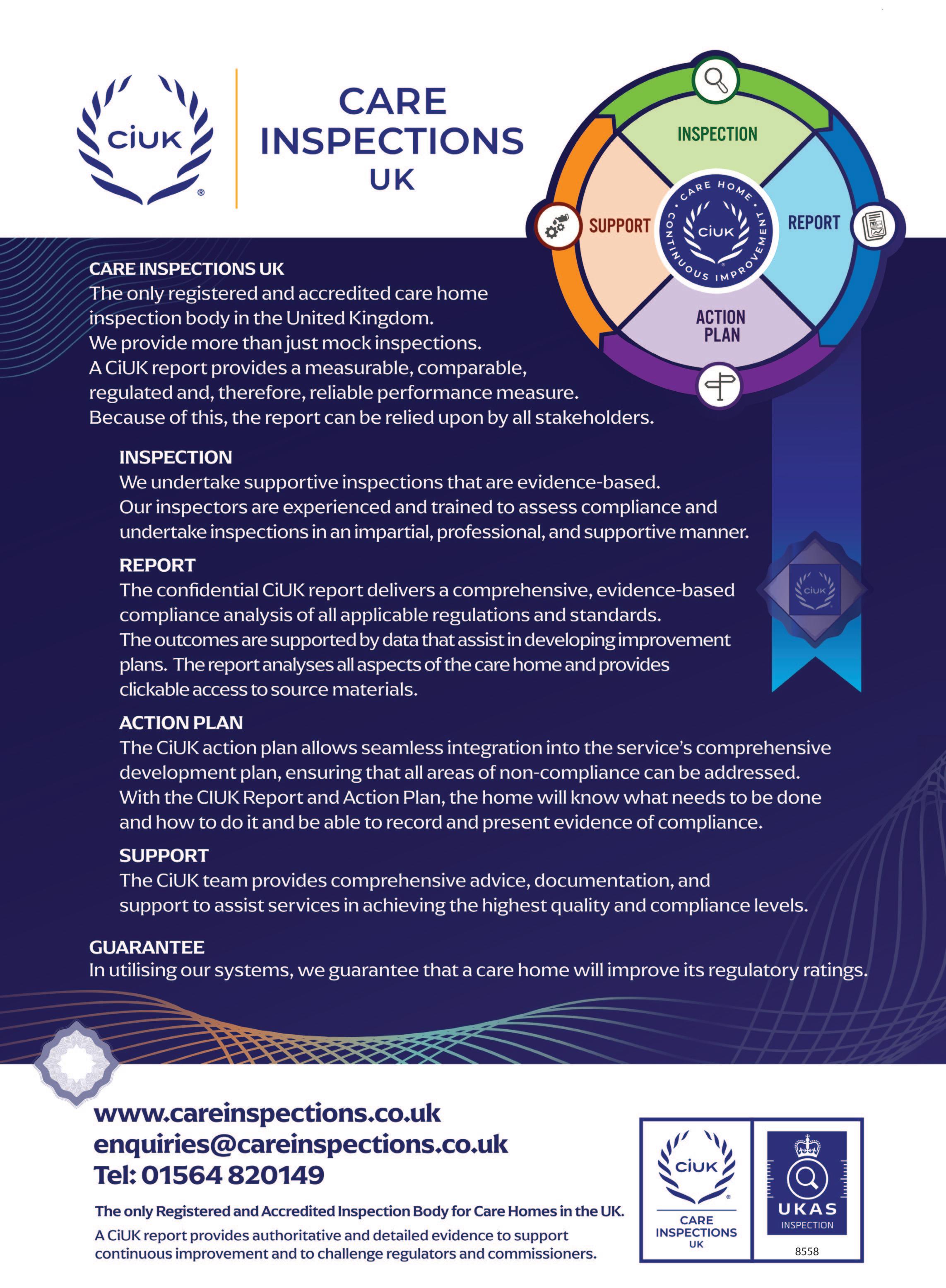
Maggie Mwangi moved from Kenya to the UK three years ago, which can be a fairly daunting challenge, but the 29-year-old has taken it in her stride and is enjoying a fruitful career at Methodist Homes (MHA)
She joined MHA Anjulita Court just over a year ago and has been working in industry for three years.
Maggie is aiming to start her NVQ qualifications soon and has plans to progress within the home.
MHA Anjulita Court offers residential, nursing and dementia care for 62 residents.
We spoke to her as part of MHA’s 30 under 30 initiative to celebrate and highlight at least 30 staff members across the organisation in a bid to promote the social care industry as a place of work for people aged 30 and below.
Speaking on her role she said: “I would recommend working in social care as a pro-

fession, but you do have to have the passion for it and learn to be open to everyone.
“I love making a difference and helping our residents to enjoy even just the simple things in life.
“My favourite day so far has got to be when he had our fashion show.
“The team modelled and walked down the catwalk in traditional dresses as well as bringing in traditional food.
“The day was super fun and a way for all of us to see each other beyond our uniforms and to get to know each other as people and more about their backgrounds.
“I am very keen to progress here at MHA Anjulita Court, I want to develop myself further and will start my NVQ Level 1 in Health and Social care soon.
“I would 100% recommend MHA as an employer, I am really enjoying my time here and long may it continue.”
Over 172 organisations were recognised at the Gold Standards Framework Quality Hallmark Awards, with Hospital Wards, Care Homes, Retirement Villages, Domiciliary Care Teams, a Hospice, GP practice, and Prison service among those honoured.
• Organisations across both health and social care demonstrated their long term commitment to GSF with many achieving reaccreditation for the 5th and 6th time (accreditation lasts for 3 years).
• First Domiciliary Care Agency achieves Platinum ReAccreditation, proving long-term sustainability
The GSF Awards brings together some of the UK’s leading providers of end of life care to celebrates their success with over 400 delegates in attendance on Friday 26th September 2025 at the Gold Standards Framework (GSF) Annual Conference, held at East Side Rooms in Birmingham. The event gives the opportunity to celebrate achievements, forge new ideas for development, and showcase exemplars Nationally.
Recognising Outstanding Organisations GSF HOSPITAL WARD OF THE YEAR
The Willows (Beech & Rowan Wards) at Yeatman Hospital, part of Dorset Healthcare University NHS Foundation Trust was awarded Hospital Ward of the Year for their excellence in delivering end of life care, demonstrating compassion and kindness to patients, their families and the staff, and for their commitment to providing dedicated end of life suites with thoughtful supportive facilities for families/carers.
In addition, 10 hospital wards (nine acute, one community (including two mental health wards) achieved GSF accreditation for the first time, while seven wards (six community and one acute) were successfully reaccredited.
GSF CARE HOME OF THE YEAR
Castle House Nursing Home in Somerset was named Care Home of the Year, for exemplifying outstanding, personalised care, with the owner/manager deeply committed to continuously improving living well and end of life care. Through compassion, collaboration, bespoke staff training, and holistic support, the home prioritises residents’ and relatives’ needs above all else, creating a truly nurturing environment that feels like home.
A total of one hundred and thirty-nine care homes were presented with the GSF Quality Hallmark Award by Victoria Garratt from National Care Forum – seventy-four receiving the award for the first time, and sixty-five reaccredited, forty-two of which achieving prestigious

Platinum status for continually accrediting every three years. Sixteen Care UK care homes and twelve Greensleeves care homes received their Accreditation Award.
GSF DOMICILIARY CARE PROVIDER OF THE YEAR
The Peaches Healthcare are the first domiciliary care agency to achieve platinum status, and were awarded GSF Domiciliary Care Provider of the Year, recognised for showing compassion across every aspect of their practice.
In addition, Peaches Healthcare won the Palliative Care at Home Provider Award at the 2025 Palliative Care Awards in June, celebrated for delivering care with compassion, clarity, and a strong commitment to the Gold Standard Framework.
Nine domiciliary care agencies also received their Accreditation Quality Hallmark Awards at the GSF Conference.
GSF INNOVATION AWARD
Sutton Court Care Centre in Surrey took home the 2025 GSF Innovation Award. This home was recognised with the GSF Innovation Award for its exceptional commitment to continuous improvement, collaborative teamwork, and compassionate, person-centred care. Feedback from professionals, relatives, and residents highlighted the team’s warmth, openness, and dedication to learning and partnership. Since its last accreditation, the home has introduced a wide range of innovative practices, including participation in national research and pilot projects, developing new tools to improve safety and wellbeing, and embedding creative approaches to communication and end of life care. Their enthusiasm for the Gold Standards Framework, combined with genuine compassion in every aspect of practice, sets them
apart as a leader in innovation and excellence.
IMPACT OF GSF ACROSS ALL SECTORS
This event also recognised a GP Practice, three Retirement Villages (two of which received their platinum award), a Practice Plus Group Prison healthcare team and Jersey Hospice Care, who received their re-accreditation award. The Hospice team travelled all the way from Jersey to accept their award in person.
CELEBRATING LONG-TERM COMMITMENT
This year saw a remarkable number of organisations reaching multiple reaccreditation milestones, proving that high-quality end of life care can be embedded and sustained over many years. Oakfield Nursing Home in Lancashire, Eliza Palmer Care Home in Surrey, Arboretum Nursing Home in West Midlands, Linden Lodge Nursing Home in Warwickshire, Melrose Care Home in Sussex, The Beeches Nursing Home in Cornwall and Westside Care Home in Surrey were reaccredited for the 6th time, celebrating fifteen years of GSF sustainability.
There were also eight care homes celebrating their 5th reaccreditation, demonstrating commitment to compassionate end of life care for twelve years.
These achievements highlight the dedication of providers who continue to embed best practice and raise standards year after year.
WORDS FROM GSF
Julie Armstrong-Wilson, Chief Operating Officer for GSF, said: “I speak on behalf of the GSF Team and Board of Trustees when I say congratulations to all 172 organisations that have been recognised this year, whether for the first time or for the sixth, your leadership, enthusiasm and commitment to continually improve the standards for EOLC is something to be proud of. The positive impact you have had on the people you care for and their families is worthy of celebration. There are still too many people that do not have a good end of life care experience, so to be able to showcase what can be achieved with the right support is crucial. Taking this opportunity to celebrate your success, share best practice and foster new ideas while networking is vitally important.
We have been accrediting organisations for over 15 years and this year we are so thrilled to be hosting our biggest event yet, with representation from all sectors that we accredit. A special recognition goes to our Organisations of the Year and Innovation award winners, who shine as examples of what can be achieved by the generalist workforce with the right end of life training, support and commitment.”
Repose Furniture is one of the UK’s leading manufacturers of bespoke seating solutions, with a reputation built on craftsmanship, innovation, and a strong commitment to improving the quality of life for its customers. Established in 1999 and based in the West Midlands, the company has grown from a small family business into a trusted supplier to both the domestic and healthcare markets. Every chair produced by Repose is handmade in the UK, with an emphasis on quality, durability, and comfort, ensuring that each product meets the specific needs of its user.
Whether for home use or demanding healthcare environments, Repose combines skilled upholstery techniques with modern engineering to create chairs that provide postural support, pressure management, and ease of use. Their wide product portfolio includes rise and recline chairs, hospital and care home seating, bariatric solutions, and specialist products designed to address particular medical and lifestyle needs. An essential element of their offering is flexibility: customers can choose from a range of back styles, seat cushions, mechanisms, and fabrics, allowing each chair to be tailored to the individual. Interchangeable parts mean that a chair can adapt as a user’s requirements change, extending the product’s longevity and ensuring value for money. The healthcare sector is a particular area of expertise for Repose. They strive to design chairs that balance comfort with clinical functionality. Features such as tilt-in-space mechanisms, adjustable cushioning, and pressure relief options make their healthcare seating particularly suited to long-term use in hospitals,
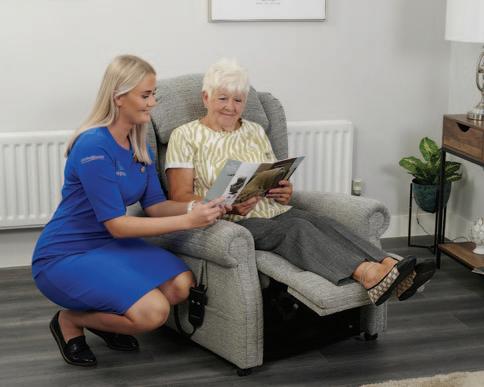
hospices, and care homes. The company’s bariatric range demonstrates the same careful attention to detail, offering robust yet comfortable solutions for larger users. While customisation is the centre of the Repose offering, they also recognise the urgency often faced in healthcare settings. To address this, Repose have developed their Healthcare Express Chairs, designed to deliver high-quality healthcare seating at speed. The models in this range can be despatched within just five working days. The Multi Bari Express and bestselling Boston Express, for example, are available on this five-day lead time, offering care providers a rapid solution without sacrificing quality or functionality. For less specialist needs, some homecare models are even available on faster turnaround times, demonstrating Repose’s ability to balance responsiveness with craftsmanship.
Repose’s reputation is further reinforced by its after-sales support, 5-year manufacturing warranty, and commitment to ethical and sustainable practices. With a UK-based factory, a dedicated distribution network, and close relationships with healthcare professionals, the company continues to be a trusted partner in multiple sectors throughout the country and beyond.
In combining bespoke design with reliable express options, Repose Furniture stands out as a manufacturer that truly understands the diverse needs of its customers. For over 25 years, it has delivered not just chairs, but comfort, dignity and independence — values that remain at the core of everything it does. For further information, see the advert on the facing page or visit www.reposefurniture.co.uk
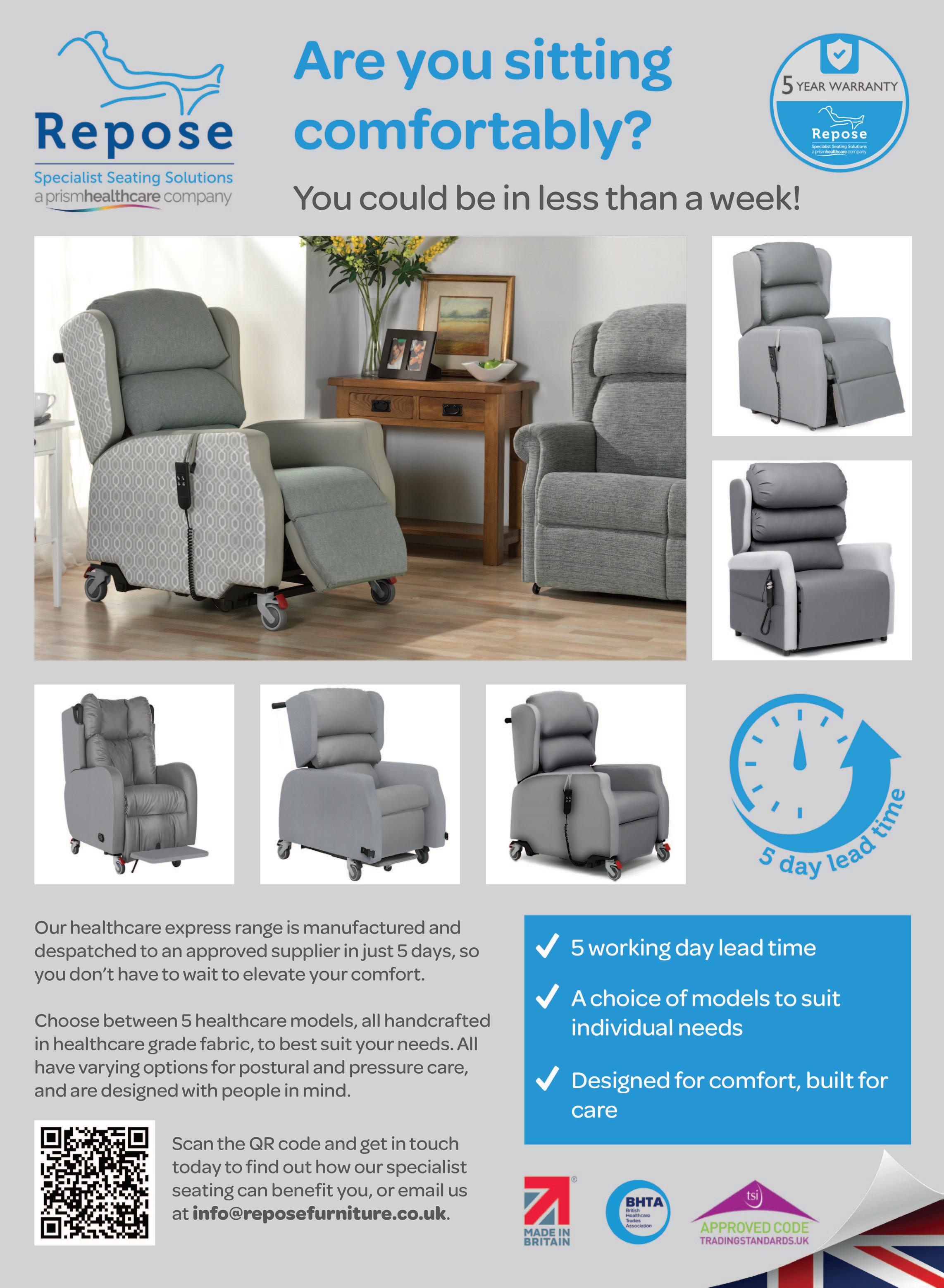
By Nikki Walker - CEO of QCS, an RLDatix Company (www.qcs.co.uk)
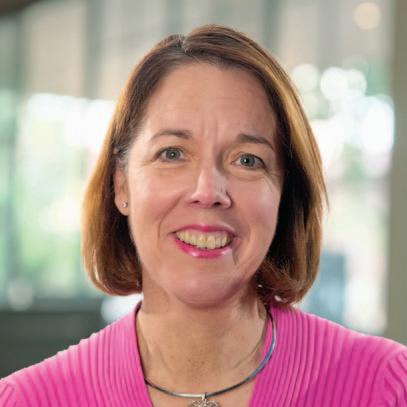
The social care sector stands at a turning point. With rising demand, increasing regulatory scrutiny, and ongoing staffing pressures, providers are being asked to do more, with less. In this environment, the way forward isn’t just about working harder it’s about working smarter.
One of the most transformative shifts on the horizon is the move towards truly integrated care systems: digital platforms that bring together compliance, care planning, risk management, training and quality monitoring in one unified place. More than just a convenience, this integration is fast becoming essential.
Currently, many providers juggle multiple systems or rely on a mix of digital tools and paper-based processes. Information is scattered. Teams duplicate effort. Vital data goes unnoticed.
The result? Frustration, inefficiency and risk.
A connected system solves this by creating a single source of truth, where care delivery and compliance are not just stored, but actively linked. Changes in a policy can automatically update associated risk assessments. Notes in a care plan can prompt training needs. Audit trails are clear and accessible. For staff, it means less time on admin. For managers, better visibility. For individuals receiving care, more consistent, safer support.
Adding artificial intelligence (AI) into the mix elevates this even further. AI can help spot patterns in care records, prompt best practice actions and reduce the burden of documentation. Crucially, AI isn’t there to replace human decision-making it’s there to support it. By giving frontline teams real-time, intelligent guidance, it helps ensure nothing is missed and quality remains high.
Of course, technology alone isn’t enough. These systems must be built on deep sector knowledge and shaped by those working in care. Platforms like QCS, for instance, combine expert-backed content with intelligent tools to provide not just data, but insight. It’s this fusion of trusted information and digital innovation that’s beginning to change how care is delivered.
But a connected future is about more than software. It’s a cultural shift towards a care environment that is proactive rather than reactive, where data drives improvement, and where teams feel confident and supported.
In a sector where every moment counts, integrated systems offer more than efficiency, they offer the chance to focus on what matters most: people. When technology works seamlessly in the background, it frees carers to do the deeply human work that technology can’t replicate.
The future of care is not just digital. It’s intelligent. And most importantly, it’s integrated.
To see how QCS are integrating care planning, rostering. audits, mock inspection, surveys, training, compliance, dementia care and more into one integrated system backed by AI technology, follow the link. www.qcs.co.uk/what-we-do/

Four colleagues from a Blackpool home snorkelled with sharks at the Sea Life Blackpool Aquarium and have raised more than £1400.
Jaide Foster-Howarth, Marcina Sowe, Amanda Geraghty and Karie Elliot all work at MHA Pennystone Court and decided to challenge themselves in a bid to raise money for the homes amenities fund.
A special mention must be given to Karie, who despite having a fear of water wanted to support her colleagues and decided to do the challenge.
MHA Pennystone Court is planning to create a reminiscence room for their residents containing things such as a traditional kitchen pulley, and branded equipment from the era of when the residents were growing up.
So far over £1400 has been raised, with donations still coming in. Lisa Robins, home manager who was there on the day to support her team said: “All four were really nervous when we got there.
“They had a lesson prior to the event which helped them settle down and away they went.
“It’s really brave of them, and they all deserve a lot of credit, the challenge is not for the faint hearted.
“In the end they really enjoyed themselves and were euphoric when they came out, especially when I told them what we had raised.
“In my eight years at MHA Pennystone Court we are always looking for ways to improve and help our residents to live later life well.
“We have had several fundraising projects, which have all been managed by us at the home.
“We have raised money for an IT room, a coffee bar, a sweetshop, caravan and a sensory/wellbeing room which amount to over £18,000 of fundraising.

“This new room will add to the collection, and I am sure our residents will really appreciate it.
“To conclude I want to thank all four of my wonderful colleagues who took the challenge on, and to everyone who supported the cause and helped us to reach the amount we have.”
According to data from carehome.co.uk, there are approximately 441,479 people residing in care homes across the UK.
For these individuals, the supported, structured environment of a care facility affords them a degree of independence and autonomy, alongside the medical and professional assistance needed to lead a healthy, safe, and fulfilling life.
Yet care homes are not without risk. Research suggests care home residents are three times more likely to experience a fall compared to those living in their own homes. Fortunately, advancements in technology, engineering, and facility design are actively tackling these risks, increasing the safety for those living in supported environments.
Pinpoint’s P2 alarm system is one of these solutions.
Enabling care home residents to summon professional support instantly, the Pinpoint System establishes a clear line of communication between residents and care staff.
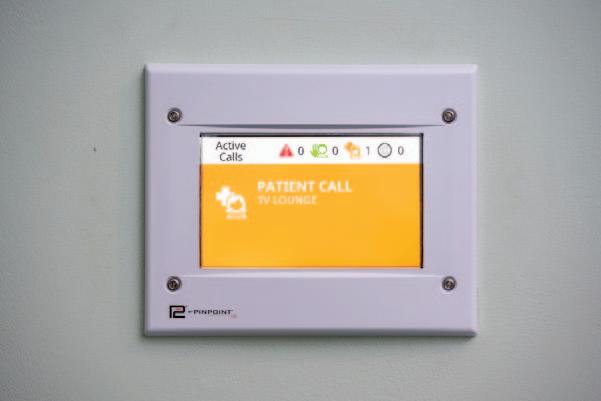
By pressing a button on a Patient Call Button, the user alerts staff members to the need for help and the exact location of an active call. This information, displayed on a staff communication device, elicits an immediate response to deliver the required support.
For individuals more vulnerable to falls or accidents, the Pinpoint System ensures that medical assistance is readily available, offering reassurance to care home residents and their families that help is always at hand and that high-risk incidents are handled efficiently.
On a day-to-day basis, the Patient Call Buttons are used by residents in need of extra assistance, such as when using the bathroom, to get out of bed or to access certain rooms within the facility. In this way, the Pinpoint System gives individuals a greater degree of control over their routine and avoids the need for 1-1 supervision, enhancing their quality of life.
The Pinpoint Patient Call Buttons come in various forms, including Wrist PITs, which are worn on the wrist of the individual, and wall-mounted alarms. Wander Leads of up to 2 metres in length can also be plugged into wallmounted alarms to allow resident with limited mobility to activate the alarm from their bed or armchair.
Biomaster technology provides 24/7 antimicrobial protection for all devices, preventing the spread of bacteria in care facilities, while an Ingress Protection rating of 67 allows Patient Call Buttons to be installed in bathroom and kitchen facilities where residents may be more vulnerable to slipping.
The presence of the Pinpoint System gives care home residents the chance to maintain a level of independence, while being safe in the knowledge that professional assistance can be accessed quickly and easily. This balance between site security and individual autonomy instils residents and their families with confidence that support is always available, and the peace of mind that the wellbeing, safety and health of the individual is the care home’s top priority.
Please see the advert on the facing page or visit www.pinpoint.ltd.uk
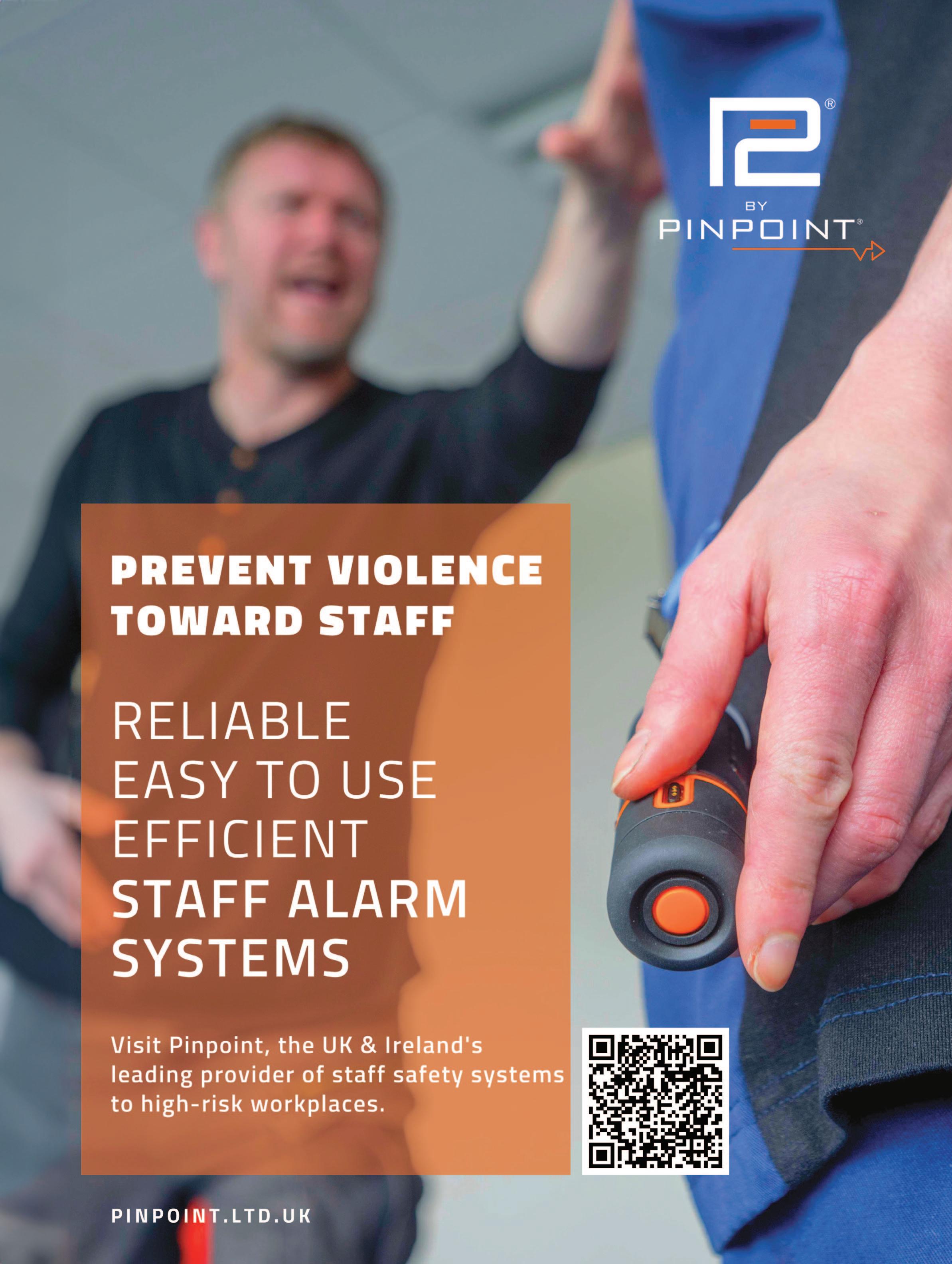
England and Wales players will walk out at Wembley Stadium connected by EE side by side with 22 fans living with dementia on 9 October 2025, ahead of their international friendly. The historic moment will be delivered by Alzheimer’s Society and The Football Association (FA) at the dedicated ‘Alzheimer’s Society International’ fixture, the fourth of its kind since the charity partnership was established in 2021.
Football fans have been nominated from across England and Wales to represent the many different faces of dementia in the UK, and will walk out alongside the teams to deliver the powerful message that it will take a united team to beat the UK’s biggest killer. Those selected will replace the child mascots that usually accompany players onto the pitch ahead of kick-off and join both squads for the national anthems in a striking moment that will call on fans to help end the devastation of dementia by donating, campaigning, or seeking support for themselves or loved ones affected by the condition at alzheimers.org.uk/joinourteam.

Andy Paul, 66, was diagnosed with Alzheimer’s disease in 2019 and is one of the fans who will be walking out at Wembley: “I didn’t think at my age I’d ever do something like this, and I was absolutely overwhelmed when I heard the news. I’m going to cherish this opportunity; to have my family there watching and to share the moment with them will be incredibly special.
“I also hope it will show people that dementia isn’t necessarily what you might expect, and that being diagnosed doesn’t mean you suddenly stop doing the things you love.”
Andy was told he has been selected to walk out at Wembley by England and Newcastle defender Dan Burn, during a surprise trip to St. George’s Park National Football Centre with another of the chosen fans, Nigel Palmer, 72.
After meeting the pair, Burn said: “I was a bit nervous when I was told I would be meeting fans with dementia, as I wasn’t sure how to act. But Nigel and Andy weren’t what I was expecting at all, and I can honestly say it opened my eyes to some of the assumptions people make about dementia.”
Andy added: “It’s not very often I’m stuck for words, but I was blown away when Dan walked in the room.
He was fantastic with us, speaking from the heart and eager to learn about our experiences of dementia, which is the attitude people should have.”
The 22 fans taking part comprise Alzheimer’s Society service users, nominations from football clubs and their foundations, and nominations from independent dementia services and cafés.
Previous Alzheimer’s Society Internationals have been marked by the removal of names on the back of England players’ shirts when they return to the pitch after half-time, drawing attention to memory loss, one of the symptoms most commonly associated with dementia. This will be repeated in the match against Wales.
Mark Bullingham, CEO of The FA, said: “Our partnership with Alzheimer’s Society continues to raise vital funds and awareness for those impacted by dementia, and the twenty-two people living with a diagnosis who will walk out at Wembley alongside the national teams will ensure this message resonates more than ever.”
Alex Hyde-Smith, Chief Marketing Officer at Alzheimer’s Society said: “This year’s Alzheimer’s Society International promises to be a historic night, showcasing so many different experiences of dementia and providing a special moment for our mascots and their families. We know beating dementia will require the ultimate team effort, and football is the ultimate team game. Players need their teammates, coaching staff and fans to support them, and likewise, people affected by dementia need a team of family, carers and doctors. It will take a society to beat dementia and, as with any successful team, we all have a role to play.”
The Football Association of Wales (FAW) CEO Noel Mooney added: “At the FAW, we believe football has the unique power to bring people together, to unite communities, and to shine a light on important issues like dementia. That’s why we are proud to stand alongside the Alzheimer’s Society and The FA in this historic moment at Wembley. By walking out with fans living with dementia, we send a clear message that nobody should face dementia alone. It takes a united team, on and off the pitch, to provide the care, compassion, and understanding needed to support those affected by this condition.”

On Saturday, 27th September, Eastbourne resident Michelle Love-Patel swapped the safety of solid ground for ropes and harnesses as she bravely abseiled down the Peacehaven Cliffs.
In celebration of World Animal Day on 4th October, Michelle, General Manager of Alice Court, a brand-new care home opening this month in Eastbourne, descended the 115-foot cliff face overlooking the sea.
The abseil was in aid of the International Animal Rescue, based in Uckfield.
So far, Michelle has raised £295 for the charity, which is dedicated to ending animal suffering while protecting the environment for both people and the planet.
Michelle said, “This is such an important cause, I’m thrilled to have taken part in some-
thing that not only pushes me out of my comfort zone but also supports vulnerable animals who desperately need our help.”
Despite the sunshine, the windy conditions on the cliff top made the challenge even more daunting for Michelle, who admitted that abseiling was especially difficult because of her fear of heights. Stepping backwards over the edge was “absolutely terrifying,” she said. However, the encouragement from her family and colleagues, including Charlotte Taylor, Deputy Manager at Alice Court, and the supportive team from International Animal Rescue, gave her the strength to push through. With sponsorship donations and cheers from those gathered on the day, Michelle found the motivation she needed to complete the descent.

Croner-i was founded in 2017 as a proud part of the Peninsula Group. Since its beginning, it has supported thousands of care providers across the UK to stay compliant with Care Quality Commission (CQC) requirements and wider regulatory obligations, setting a standard in the industry.
Through their Navigate-Care platform, Croner-i specialises in providing practical, accessible and easy-to-understand guidance that enables care services to exceed their compliance responsibilities. From residential care homes, and domiciliary care agencies to supported living providers and other care services, thousands of care providers rely on Croner-i’s resources to maintain quality, safety, and best practice across their operation.

“We understand that compliance can be a challenging and time-consuming process for care providers,” said Andrew Murphy, Head of Content at Croner-i. “Our mission is to take the complexity out of CQC and regulatory requirements, giving providers the clarity and confidence they need to deliver outstanding care.” With Croner-i’s Navigate-Care platform, care services have access to a comprehensive library of policies,
toolkits, and expert guidance written by industry and care specialists. This includes practical step-by-step advice on preparing for CQC inspections, meeting the new Single Assessment
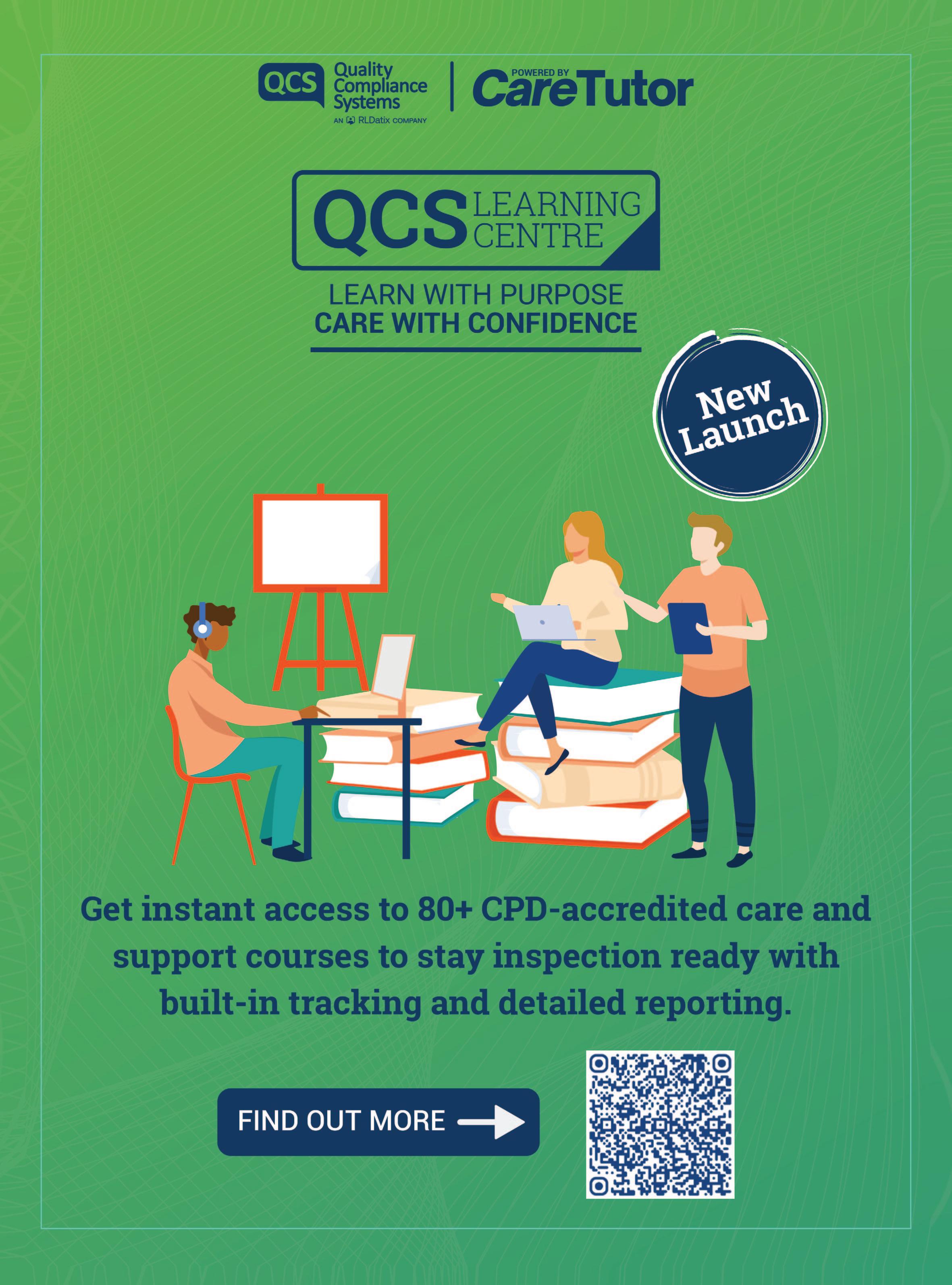
SEE US ON STAND J20 AT THE CARE SHOW
Care England has renewed its calls to reform the NHS Continuing Healthcare (CHC) funding stream in response to a report published by the Nuffield Trust exposing huge inequalities, describing it as a “postcode lottery”.
Professor Martin Green OBE, Chief Executive of Care England, said: “The Nuffield Trust’s insightful report highlights these huge disparities in CHC eligibility, which not only put enormous emotional pressure on those who rely on health and care services; but also the financial burdens of these inequalities are ultimately put onto already underfunded local authorities and care providers, who we have time and again highlighted do not have the resources to pick up where CHC is failing.”
The report outlines that the average amount spent on each eligible recipient in the most deprived fifth of areas was less than half (49.7%) of what was spent in the least deprived fifth. This is in the backdrop of increasing costs per recipient that may reflect the higher incidence of those with more complex or prolonged health and care needs.
It also highlighted the difficulties experienced by people with unmet needs in accessing the service in light of complex and variable assessments and standards.

Professor Martin Green continued: “What needs to happen now, at the very least, is that the unfairness and inconsistency in CHC be immediately addressed. We must move to a national model that assesses need, calculates cost, and applies uplifts in a consistent manner much like the approach used for Funded Nursing Care, so that certainty to providers and people who draw on care can be delivered well into the future. ICBs must not use their reorganisation as a reason to delay resolving the issues highlighted by the Nuffield Trust and continue to act with accountability in the interest of those who need these services.
The Casey Commission will provide a clear opportunity, though, to assess whether this unfair and dismissive CHC system has delivered on its objectives over the longer term. Integration and funding of social care alongside the NHS continues to be a glaring issue for the sector, which should focus on patient experiences – services delivered free at the point they’re needed –rather than simply focusing on structures and organisations.”
Care England’s submission to the Commission will include short-term solutions that evidence how social care can, and should, complement the NHS’ recovery, alongside longer-term solutions for more wholesale reforms to integration in the second phase of the Commission’s work.
Spynie Care Home in Elgin has held an awards evening to celebrate the dedication of its staff team and to remember the late Shona Donaldson, former deputy manager, colleague and friend, who sadly died of cancer earlier this year.
The highlight of the evening was the presentation of the Shona Donaldson Award, the most prestigious accolade of the night, created in her memory to recognise the member of staff who has gone above and beyond. The award was presented by Shona’s sister, Val McLean, to Maggie Scott, home manager at Spynie Care Home, in recognition of her tireless support for Shona and her unwavering commitment to the whole team.
Maggie said: “I would do this for every member of staff as support is what we’re about. I really don’t think I am deserving of it as we all do such a good job. All the team are superstars – well done to every single one of the winners.”
Shona worked at Spynie on a number of occasions, her last period of service being from December 2019 until April 2024.
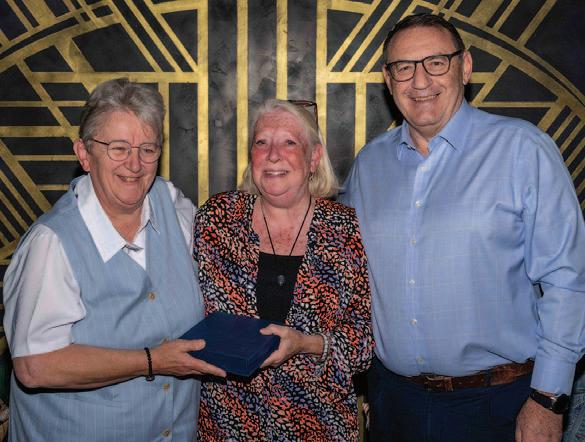
Even during her illness at Shona’s insistence, she continued to support the home, with Maggie often visiting her with a laptop so she could contribute from her bed. Known for her positivity and resilience, Shona refused to be defeatist in the face of her diagnosis.
Maggie added: “Shona had such a positive outlook and gave her illness one hell of a run for its money. She always put the residents first and appreciated the preciousness of life. She believed there was no point dwelling on things you cannot change, and even when faced with the inevitability of death her focus remained on contributing to the wellbeing of others. That is a truly admirable legacy.”
Alongside the Shona Donaldson Award, a mix of heartfelt and light-hearted awards were presented to staff, reflecting both the professionalism and camaraderie that make Spynie such a special place.
THE FULL LIST OF WINNERS:
• Social Care Nurse Award – Soumya Varghese, for putting residents and the provision of the best care possible at the heart of everything she does.
• High Flyer Award – Jasmine Roberts and Michelle Jack, recognised as likely future nurses having achieved the level of Social Care Associate Practitioner (SCAP).
• Dignity in Care Award – Lisa Smith, for ensuring residents feel safe and cared for with dignity at the centre of her practice. Presented by Ed Paton, a relative who recently lost his wife and asked to make the presentation.
• End of Life Nurse Award – Lorraine Watson, for her belief that everyone deserves a “good death” and her dedication to making that happen.
• Newcomer Award – Madison Wetherell, for her commitment to providing the best care possible and making a difference to residents’ lives.
• Ancillary Worker Award – Marion Laing, for her positivity and uplifting impact on both staff morale and residents.
• Dementia Carer Award – Laura Paterson, for recognising that every person with dementia is unique and striving to make life better for them.
• Staying the Distance Award – Michelle Dobbs, for always returning to Spynie, no matter the circumstances – a true trooper.
• Best Operations Manager Award – Steve Massey, described as “an amazing, trusted, supportive, handsome, debonair chap and a true gentleman”. Presented by Deputy Manager Liz Jamieson.
• Nurse Most Likely to Sleep in for a Nightshift Award – Lexi Peach, recognised with good humour by her colleagues.
• Hall Monitor Award – Rebekka McLaren and Kirsty Melville, for their dedication to keeping a close eye on the hallways.
• Scarlet Pimpernel Award – Jim McLaren, for being the most elusive member of the team.
• Shona Donaldson Award – Maggie Scott, for going the extra mile and her dedication to staff and residents alike.
The Access Group (www.theaccessgroup.com), a leading provider of care management software solutions, has announced a sponsorship and strategic collaboration agreement with Home & Community Care Ireland (HCCI), the national representative body for home care providers. This agreement supports Ireland's home care sector through technology solutions, member benefits, and innovation initiatives. Ireland's home care sector faces immense pressure, with demand for services growing as the population ages and workforce shortages likely to intensify. Ireland's home care sector, like many across Europe, faces workforce pressures and growing demand that technology solutions can help address.
The Access Group currently have five office locations across Ireland, supporting customers in 26 counties across the Republic of Ireland and Northern Ireland. Through this collaboration, Access will sponsor HCCI's flagship events, including the HCCI Conference & Home Care Awards 2025, and support initiatives such as compliance workshops, AI-driven innovation sessions, and executive briefings to promote best practice and operational excellence.
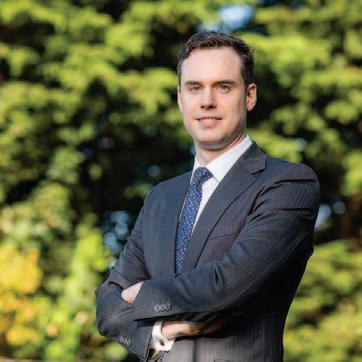
The agreement provides HCCI members with exclusive benefits including discounts on Access's Care Suite solutions covering Care Planning, Rostering, Compliance, and Medication Management, alongside price protection and access to emerging technologies such as their AI platform. Access's Proven Track Record
Access brings extensive expertise to this relationship, currently supporting over 14,000 registered care home locations across the UK and managing 25% of the UK's social care hours, demonstrating scalability and reliability which Irish providers can utilise.
“Home care is about people, not paperwork. Technology should take friction out of rostering and compliance so carers can spend more time with the people they support”, said Joseph Musgrave, CEO of HCCI. “Access’s support for our conference, workshops and innovation sessions comes with tangible member benefits. Through this collaboration with Access, we’re bringing proven tools and fair pricing to HCCI members so they can deliver safer, smarter care today and build capacity for tomorrow.”
"Technology enables care professionals to do what they do best - providing the support and empathy that make all the difference," said Anisa Byrne, General Manager of Access Care. "We've seen firsthand how the right digital tools can transform care delivery. Done right, technology integrates seamlessly into the lives of those receiving care, granting greater independence and reassurance to them and their families. This collaboration with HCCI allows us to bring proven solutions to Irish providers facing similar challenges to their UK counterparts."
This agreement reflects Access's commitment to supporting Ireland's home care sector through technology, training, and expertise that can help providers deliver better outcomes for those receiving care at home.

Care provider, Care UK, has welcomed two new members to its extended leadership team.
Jo Crossland joined the Care Quality team as Head of Nursing, Care and Dementia earlier this summer and in August, Andrew Gibb became Operations Director for Care UK’s North division.
Welcoming them to Care UK, Chief Executive Officer
Andrew Knight said: “This year has been an exciting period of growth and change for Care UK, so I am delighted that Jo and Andrew have joined us on this journey. Between them, they bring decades of expertise and leadership experience. This will not only benefit our teams, but also introduces new ways of thinking to continue supporting residents to live fulfilling lives.”
Jo Crossland is a dual-qualified nurse with a BSc (Hons) and Master’s degree in dementia care – she has been supporting older people for more than three decades.
Throughout her career, she has held senior positions within care homes, mental health NHS trusts, and as a development consultant and trainer for the University of Bradford’s School of Dementia Studies. In 2016, she joined Avery Healthcare as head of dementia care, where she was a key part of the team for seven-anda-half years. Her most recent role was that of quality director for We Care Group.
When asked, Jo cites her defining characteristic as being “a curious person” – something she hopes to bring to her work at Care UK, and drives her part-time PhD research at Leeds Beckett University, which focuses on the experience of relatives moving their loved ones into a care home after a period of home care.
Of her new position, Jo said: “It’s a brilliant time to join Care UK, and a great opportunity for me. I’m just that lass from the Yorkshire Dales who wants to make a difference. I often think ‘how did I get here?’ “I’ve never forgotten what it was like for my Nana to place my Grandad in our local nursing home in the
1990’s. I want to make sure that every family member feels heard as they go through the care process – it’s a huge transition for everyone involved, and I want to make sure we’re futureproofing the service we offer to residents and their loved ones.
“Residents are everything to someone – many of them are Nanas and Grandads to people, and they’re just trying to make sense of a huge lifestyle change which feels completely different to what they’re used to – my question is, what support do we need to offer to make sure residents are bringing their life with them on their journey into care?”
Andrew Gibb has taken on responsibility for 55 Care UK homes in five regions, covering care homes in the North of England and Scotland. He will oversee the continued growth of some of the more recent homes in the provider’s portfolio, including the six formerly run by Yorkshire-based Springfield Healthcare, which joined the Care UK family last October.

Andrew is a registered pharmacist and has spent his career in leadership roles with Boots Hearingcare, Superdrug and Lloyd’s Pharmacy. During the Covid-19 pandemic, he supported the plasma donation scheme created by the NHS. For a number of years, he was a trustee for We Change Lives, a social care charity based in Warrington. Of joining Care UK, Andrew said:
“It feels like the perfect fit – Care UK is a fantastic provider, with hardworking teams who aim to help to as many residents and their families as possible.
“I hope I can make a real difference and work with our in-house experts to provide residents with the high-quality care they deserve. I want to help continue to grow our high quality ratings – the more successful we are, the more people we can help.”

Residents, families, and colleagues at HC-One’s Cedar House Care Home in Harefield, Middlesex, were treated to an unforgettable afternoon as the home hosted its first-ever Barn Dance, complete with Western-themed activities, food, and live entertainment.
Despite a cloudy start, the weather soon brightened, allowing everyone to celebrate outdoors in true Western style. The event was made even more special with the attendance of the Mayor of Hillingdon, who joined residents and colleagues to mark the occasion.
The home’s catering team prepared a delicious Western-themed buffet, while live music was provided by Tony Collins, an accomplished fiddler, guitarist, and emerging songwriter from Oxfordshire. His lively performance
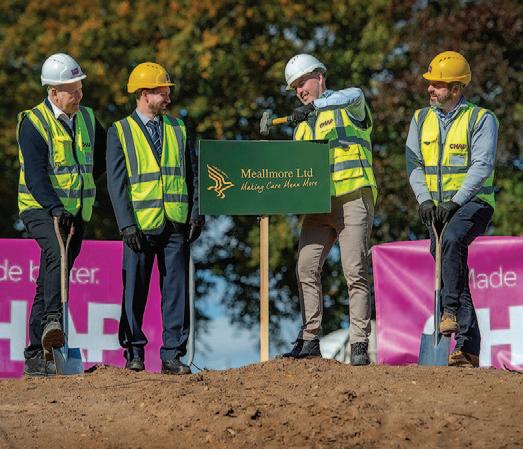
Work is underway on the development of a new £14 million care home in Broughty Ferry, Dundee, following an official sod cutting ceremony, attended by Councillor Steven Rome, Convener of Fair Work, Economic Growth & Infrastructure and Councillor for North-East Ward – Dundee.
The 54-bed care home is being developed by Meallmore, and is designed to support older people with a variety of age-related health conditions, including frailty and dementia.
Situated on Dalhousie Road, the new care home will provide 60-70 full-time equivalent jobs in the local area, including nurses, care assistants, administrators and managers.
Estimated for completion in early 2027, the threestorey home has been sensitively designed to complement the surrounding area, minimising encroachment on the beautiful established gardens
and ensuring the building is in-keeping with the residential character of the area.
The 54 premium bedrooms will be arranged in small group living units, with upper floors featuring outdoor terrace spaces and the ground floor providing access to private garden areas.
Inside, the care home will offer a cinema, café, private dining room and beauty salon.
The construction work is being undertaken by CHAP Group.
Michael Gillespie, Property Director for Meallmore, said: “This new home has been designed to offer the highest quality facilities for residents, while empowering them to maintain their desired levels of independence.
Set in a beautiful spot in Broughty Ferry, this home is going to be a lovely place to live.
We’re excited to see the development progress and look forward to welcoming residents in 2027.”
Paul Matthew Dundee Area Construction Director at CHAP Group, added: “We’re thrilled to be working with Meallmore to deliver this new care home, which will provide first-class facilities for residents.
We look forward to working with Meallmore, the design team and wider community as we deliver the project.”
Councillor Steven Rome, Convener of Fair Work, Economic Growth & Infrastructure and Councillor for North-East Ward – Dundee said: “I was delighted to help in breaking the ground on this exciting project.
Developments like this help to boost the local economy and bring disused sites back to life.
I look forward to seeing the project developing over the coming months.”
had everyone clapping along, and he later joined the Mayor in a light-hearted music quiz, much to the delight of the crowd.
Home Manager at HC-One’s Cedar Houe Care Home, Patience Sibanda, said: “It was a wonderful afternoon, full of joy and laughter. Seeing our residents, their families, and our colleagues come together to enjoy live music, great food, and a fun theme was truly heartwarming. We are so grateful to the Mayor, and Tony Collins for helping us make this first Barn Dance such a success.”
HC-One’s Cedar House Care Home is proud to provide opportunities for residents to engage with their local community through meaningful events like this one, which promote wellbeing, connection, and plenty of fun.

• We specialise in the sale and purchase of quality used wheelchair accessible vehicles and ambulances.
• They can be bought as seen or refurbished and sign-written to your own requirements.
• Fully serviced, new mot & warranty
• Engineers inspection supplied if required.
•
•
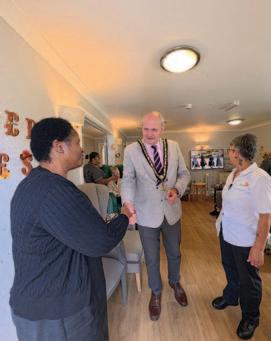




A social care champion says Reform UK’s “potentially catastrophic” plan to threaten legal immigrants with deportation would put vulnerable people at risk in Wales.
Mario Kreft MBE, the chair of Care Forum Wales, says it would be hugely damaging to care homes and home care companies who rely on overseas workers and put more pressure on the already beleaguered NHS.
According to Reform leader Nigel Farage, migrants should be forced to reapply for new visas and he pledged to abolish the main route towards permanent settlement in the UK.
The controversial idea has already attracted cross-party condemnation and
Mr Kreft pointed out that the social care sector was “hugely dependent” on overseas workers.
The scale of the problem , he said, was emphasised by official statistics which showed that 15 per cent of registered care workers in Wales were born outside the UK.
Mr Kreft said: “These proposed new policies from Reform UK present significant risks to the adult social care sector here in Wales.
“The people who staff these vital institutions are highly skilled, giving us added value beyond helping us solve the problem of the fact that we have insufficient numbers of local people willing to work in the sector.
“What is being proposed here, stripping people of their Indefinite Leave to Remain status and moving them back onto visas, amounts to changing the rules of the game half way through.
“We’ve relied for many years on people from overseas to come and provide care, nurses and doctors in the NHS and in social care.
“Once you start talking about changing the rules, once you start making it less attractive or people feel less welcome, people will be feeling very anxious.
“There will be people who’ve worked for years in this country, all through Covid who’ve done fantastic work caring for people from Britain who now will be thinking, ‘am I really welcome here?’ Is this going to be the future that we’ve talked to the family about or even do we have to move to another country’.
“You cannot underestimate the anxiety and fear this has already caused and it’s making it even harder to recruit staff and we may very well lose a significant number of those we currently have as they seek opportunities in countries with more welcoming attitudes.
“Let’s be clear, this potentially catastrophic policy is focusing on reducing the numbers of people coming here who we need, who come here by legal means and contribute to the society and to the tax base.
“It’s curtailing necessary, legal immigration to deal with this issue of the small boats which is a totally separate thing. We need to call this what it is, a cynical conflation of totally distinct issues for headline grabbing, political point scoring.
“It’s a headline grabbing policy which will win votes but the implications of this would be serious in the short term but disastrous in the longer term.
“As a sector, we see more clearly than any other the needs that arise from having an ageing population.
“We are already suffering a major staffing crisis in Wales with more than 10,000 vacancies in social care.
“If we lose people that we cannot replace and that is highly likely from this misguided policy, then inevitably, great pressure will be put on the system.
“Care homes and domiciliary care companies would almost certainly curtail their services and some would even close down.
“There will be many countries who’d want to take these people. They’re highly skilled and quite honestly, they deserve far better than this.
“It would all fall back on the NHS and when the social care sector sneezes, the NHS catches a cold. This is madness.”
CareZips® Classic are patented, easy dressing unisex adaptive pants designed for older and disabled people suffering with problems associated with continence, mobility, mental function and cognition. Suitable for persons living in care institutions, receiving care at home or living independently at home, CareZips® Classic enable people to dress themselves or with assistance from carers.
CareZips® Classic feature patented 3-zipper system, which opens the front of the pants from the waist to the knees for quicker access during toileting, continence pads changes and personal hygiene. The forward positioning of the two side zippers lessens pressure on sensitive hip areas, helping to eliminate discomfort. The third zipper facilitates simple full frontal opening for faster more dignified diaper changes, catheter adjustments, personal cleansing and hygiene routines.

cal functionality and versatility of the CareZips® Classic, all day comfort and easy garment care.
• People dependent on assisted dressing appreciate quick easy dressing process with less stress, embarrassment and greater dignity offered by CareZips® Classic.
• CareZips® Classic offer practical gains to the carers, helping them to provide better care, whilst reducing physical efforts and saving valuable time.
CareZips® Classic are unisex, available in 6 sizes and 3 practical colours (i.e. black, charcoal and navy). Tapered fit at the ankles gives a tidy appearance. Made from breathable moisture-wicking 4-way stretchy crease-free and easy-care durable fabric, CareZips® Classic are comfortable, practical and conveniently functional.
In today’s care sector, where equipment failure can directly impact patient safety and service quality, proactive asset management is non-negotiable. Enter Assetain, Medaco’s pioneering solution designed to manage the complete lifecycle of patient-handling equipment - from first supply to planned obsolescence.

assessments, which are promptly linked to each record. This approach adds both accountability and immediate insight for stakeholders.
CareZips® Classic have many benefits for the older and disabled users and their carers:
• People dressing themselves enjoy the practi-
For more information, contact Win Health Medical Ltd - 01835 864866www.win-health.com
See the advert on page 3 for further information on Win Health’s product range.
Angloplas are a UK manufacturer who specialise in producing dispensers for the health and hygiene industry. Although these are designed to keep the workplace tidy and uncluttered they are, more importantly, built knowing the control of healthcare-associated infections (HCAIs) are a priority for healthcare providers, and who are employing a combination of infection prevention and control strategies, including hand hygiene, cleaning, training and the adoption of new technologies, to tackle the problem.

As a result, a wide range of infection control products and technologies are emerging on the market, including antimicrobial technology. Angloplas’ range of dispensers are produced in the world’s first
proven Antimicrobial PVC with silver ion technology and which is exclusive to Angloplas. This helps reduce the risk of cross infection by stopping the growth of bacteria and mould and works continuously for the lifetime of the product, reducing levels of bacteria such as MRSA, E Coli, Legionella, Salmonella and mould by up to 99.99%. For non-clinical environments Angloplas has recently launched its new Budget Range of products which are made to the same exacting standards as the antimicrobial protected ones but with lower price tags.
You can order Angloplas products directly from its website at www.angloplas.co.uk See page 17.
Launched in August 2025, Assetain delivers three core benefits: comprehensive asset visibility, budget-wise maintenance, and strategic replacement planning. Rather than reactively repairing faulty devices, care homes, NHS Trusts, and SEND schools can now oversee the health of all moving and handling equipment with confidence and clarity.
At its heart lies a meticulously maintained, datarich register. The programme initiates with a full audit of existing assets; each entry is ported into a dynamic system setting tailored maintenance thresholds, repair-vs-value benchmarks, and clear end-of-life triggers.
Field engineers play an essential role - capturing photographic evidence of faults and functional
Timely alerts are a standout feature. When equipment approaches “no-longer-manufactured” status or reaches its recommended service term, Assetain sends clear notifications - empowering teams to anticipate challenges before they arise. Regular updates of the full asset register ensure stakeholders remain fully informed of the condition and availability of their entire fleet.
Assetain isn’t just maintenance - it’s strategic careasset stewardship that saves time, reduces costs, and safeguards patient well-being. A smart, forwardthinking programme like this helps care providers shift from reactive firefighting to purposeful planning.
In short, Assetain elevates care facility operations into a new era of efficiency and confidence - where every asset is seen, scheduled, and systematically sustained.
www. medaco.co.uk/solutions/assetain/
Consort Claudgen now offers Wi-Fi-enabled low surface temperature heaters that can be controlled through a digital control panel on the heaters or the Consort Connect app. Features include a 7-day timer with 24 daily heating periods, a lock function, open window detection, custom automation, and energy consumption statistics.
Additionally, LST heaters with Wi-Fi and occupancy sensor have a self-learning control ability which uses inbuilt occupancy sensors to detect and learn a

user’s weekly presence in a room. It then creates a heating schedule and automatically warms the room according to the detected or predicted occupancy. When the space is unoccupied, the heater will conserve energy by switching to a setback temperature or frost protection mode.
Consort's website also offers BIM objects for download.
See page 17 or 01646 692172 | sales@consortepl.com | www.consortepl.com

Care Show Birmingham, returning to the NEC Birmingham on 8-9 October 2025 has announced its conference programme, featuring an impressive 120+ sessions, 8 focused theatres, and 200+ expert speakers. With ongoing policy changes, regulatory developments, and increasing financial pressures facing the sector, there’s never been a more important time for senior leaders and care professionals to stay informed and connected.
The 2025 programme has been thoughtfully curated to tackle the biggest challenges in care, offering vital updates on government policy, CQC changes, and sector innovations. Whether attendees are new to the care sector or leading teams at the very top, Care Show Birmingham will be the place to grow, connect, and lead change.
SESSIONS INCLUDE:

updates: what will the fair pay agreement look like 15:10 – 15:40 | Business Theatre | How to prepare care staff for a CQC inspection
Care Show Birmingham is also getting a vibrant makeover with a brandnew funfair theme, bringing fun, celebration, and community spirit to every corner of the event. Plus, there will also be an official Care Show After Party on the evening of Wednesday 8 October, open to all registered delegates, exhibitors, and speakers. Attendees can expect live music, food, drinks, and entertainment in a night of unmissable networking and celebration.
Care Show Birmingham is free to attend for care and healthcare professionals, those working for a social care provider, allied healthcare, NHS, public sector professionals, chefs and caterers, architects and interior designers. It's the place to be for the most up-to-date knowledge and guidance around policy and regulation changes to support you in providing the best quality of care possible in the changing climate. The only social care event you need to attend The full conference programme can be viewed at: www.careshow.co.uk/conference-programme The 2025 edition of Care Show Birmingham takes place on 8-9 October at NEC Birmingham. Delegates can register to attend for free at: www.careshow.co.uk/carer

Introducing Access Smart Notes for Care Planning.
We’re excited to introduce the upcoming release of Access Smart Notes - A new AIpowered tool designed to reduce admin, saving time and money for care providers like you.
Smart Notes helps you create accurate, detailed notes, using AI to write up forms in moments and and deliver them directly into Access Care Planning. That means less time writing, and more time with the people who matter most.
Access Smart Notes key features and benefits:
• Save thousands of pounds every year on Care Assessments without a drop in quality.
• Capture detailed notes quickly and efficiently in the moment.
• Reduce errors and missed details with templates customised to your service
• Integrated with Access Care Planning for real-time updates saving hours of admin time.
• Built-in AI accuracy to streamline the documentation process to reduce risks and improve the quality of your notes
• Full audit trail for peace of mind and transparency
Visit www.theaccessgroup.com or see us on Stand H40 at The Care Show.
Satellite Finance Limited will be exhibiting at the Care Show Birmingham 2025 on the 8th-9th October at the NEC on Stand: K70.

Since 2008, Satellite Finance has been a trusted commercial finance broker specialising in funding solutions for care homes and healthcare providers. Based in Newport, Wales, Satellite Finance has a range of tailored business finance services from asset finance, business loans, and mortgage funding to support care home acquisitions, refurbishments, and equipment purchases.
If you’re looking for Asset Finance to help grow your business, new equipment is a must. Satellite Finance can help you to get all the equipment you need, without making large dents to your cashflow. With Asset Finance you don’t have to pay for everything upfront, you can

spread the cost of your equipment over the period of time its expected to be used for which can be from 12-72 months, allowing you to spend more money on higher standard equipment without feeling the economic pinch.
Perhaps you’re looking for a loan for a new building, or to make a refurbishment in a care home or surgery? Satellite Finance works with you to choose the best loan for your project. Choose from either a Business, Professional, Personal, or Corporate & VAT loan, and because Satellite Finance has access to over 40 specialist lenders that have facilitated over £100 million in funding for more than 4,500 clients, you know you’re in good hands.
For a Mortgage Loan, Satellite Finance can help you to request a loan for anything between £50,000 – £40 million. With rates starting from just 2.25% above Bank of
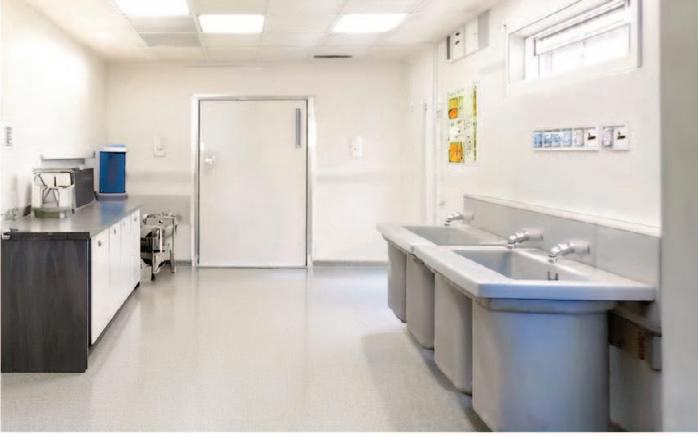



England base rate, your repayment period can be anywhere between 5 and 30 years. Unlike other finance companies, Satellite Finance’s terms won’t feel like a burden, as they’re both competitive and flexible, ensuring you get an arrangement that is affordable and convenient for you. Having close relationships with over 40 high street banks, challenger banks, and regional lenders all over the UK, Satellite Finance is experienced and up to date with the best lenders who offer the best rates to the healthcare sector.
Come and meet the team at the Care Show Birmingham and explore their comprehensive range of financial solutions.
Every day, care organisations are working tirelessly to deliver essential support in the face of growing needs and rising costs. However, too many providers are stuck balancing tight budgets, having ‘just enough’ to stay afloat. The hard truth is, just enough isn’t enough—not for the providers, not for the employees, and certainly not for the clients who depend on them.
Rising operational costs—from wages and the Fair Pay Agreement to energy bills—compound historic underfunding and financial pressures. And demand for care continues to increase, creating a widening gap that organisations are often forced to fill with limited resources.
Providers then end up in survival mode, unable to invest in improving their services for today and the future.
THE NEED TO RETHINK FINANCIAL STABILITY
Care providers need to have healthy finances in social care, and that doesn’t come at odds with delivering compassionate care.
A financially strong organisation has the breathing room to improve services, retain employees, and innovate to make a meaningful difference to the lives of people they support. And having this financial security means providers can actually plan for the future rather than constantly reacting to the present.
BENEATH THE SURFACE

Social care organisations face a web of financial intricacies. Local authority support often comes with layers of red tape. Managing aged debt and resolving invoicing errors take a significant amount of time that few organisations can spare. Regulation and compliance require meticulous reporting, and the sheer volume of admin work to manage all these leaves teams stretched thin. At the same time, there’s an expectation for providers to keep doing more. But without the right tools and systems in place, these compounded financial struggles threaten to overwhelm this indispensable sector.
Social care providers aren’t just keeping their organisations alive; they’re safeguarding the wellbeing of countless individuals and families.
Providers need to be able to prioritise long-term financial resilience. And part of this means having the tools—including robust financial management softwaresimplify manual processes, optimise resources, and reduce inefficiencies. By championing financial sustainability, we’re creating conditions where employees can thrive, where clients receive the quality of care they deserve, and where the sector can confidently meet future challenges.
Find out more at: www.oneadvanced.com/ai
See the advert on the facing page or visit OneAdvanced on

We’re excited to be heading to the Care Show in Birmingham on 8–9 October – and we’re bringing something brand new with us.
At this year’s event, we’ll be launching the Data Policy Builder, a powerful new tool designed to make data protection policies simple, practical, and meaningful for your organisation. Too often, policies sit on a shelf, written in complex language that no one reads. The Data Policy Builder helps you create living documents that reflect your service, speak to your staff, and actually shape day-to-day practice. By guiding you step by step through the process, the tool ensures your policies are DSPT-compliant and tailored to your unique risks and needs. Whether you run a single care home, a homecare service, or a larger group, this tool will help you write policies that your team can understand and use – supporting safer care and better data security.
LIVE DEMO – DATA POLICY BUILDER
Join us at stand B11 to get a first look at the Data Policy Builder in our live demo session. We’ll be focusing on Bring Your Own Device
(BYOD) policies, an area many care providers struggle with. You’ll learn:
• The risks of staff using personal devices for work
• What should be included in a robust BYOD policy
• How the tool can generate a clear, easy-to-read document for you –in minutes
We’ll also be sharing which other policies we’ll be adding to the tool in the future, so you can start planning ahead.
DROP-IN HUB – YOUR QUESTIONS ANSWERED
Throughout the Care Show, the Digital Care Hub team will be running a drop-in hub where you can ask all your questions about digital technology, data protection, and cyber security. Whether you need help with the Data Security and Protection Toolkit (DSPT), want advice on cyber security risks, or just want to sense-check your approach to data sharing, we’ll be there to support you.
Come and have a conversation with us – we’d love to hear about the challenges you’re facing and the solutions you’ve found.
LIVE SESSIONS
We’re also hosting four short, interactive sessions across the two
days. Here’s what’s on:
Day One – Tuesday 8 October
11:00 – Data Policy Builder live demo
See our brand-new tool in action and walk away ready to create customised, DSPT-compliant policies that strengthen security and save you time.
14:00 – Multi-Factor Authentication (MFA) & Passwords
Find out how strong your password really is and learn why long passphrases and MFA are your best defence. Includes password challenges and quick memory games.
Day Two – Wednesday 9 October
11:00 – Talk to an Ethical Hacker
Meet Cyber Sam, our in-house ethical hacker. Ask your questions about real-world cyberattacks and take away practical tips to stay safe.
14:00 – Phishing Emails & Social Engineering
Take our phishing quiz and scavenger hunt to learn how scammers operate – and how to protect your organisation from being caught out.
Visit us at Stand B11 – whether you want to watch a live session, try out the Data Policy Builder, or simply talk through your digital questions, we’re here to help.


SEE US ON STAND L50 AT THE CARE SHOW


with real-time pressure mapping
visit stand M35 at Care Show Birmingham & stand J42 at OT Show

Sensore launches a smart pressure ulcer prevention system, a breakthrough technology combining a smart fabric sensor mat with an intuitive app and powerful AI analytics.
Today’s best practice is reactive: manual checks and frequent repositioning. Sensore flips the model - continuously monitoring pressure distribution in real-time and providing simple preventative alerts, so users stay protected while easing the daily vigilance demand on users and carers.
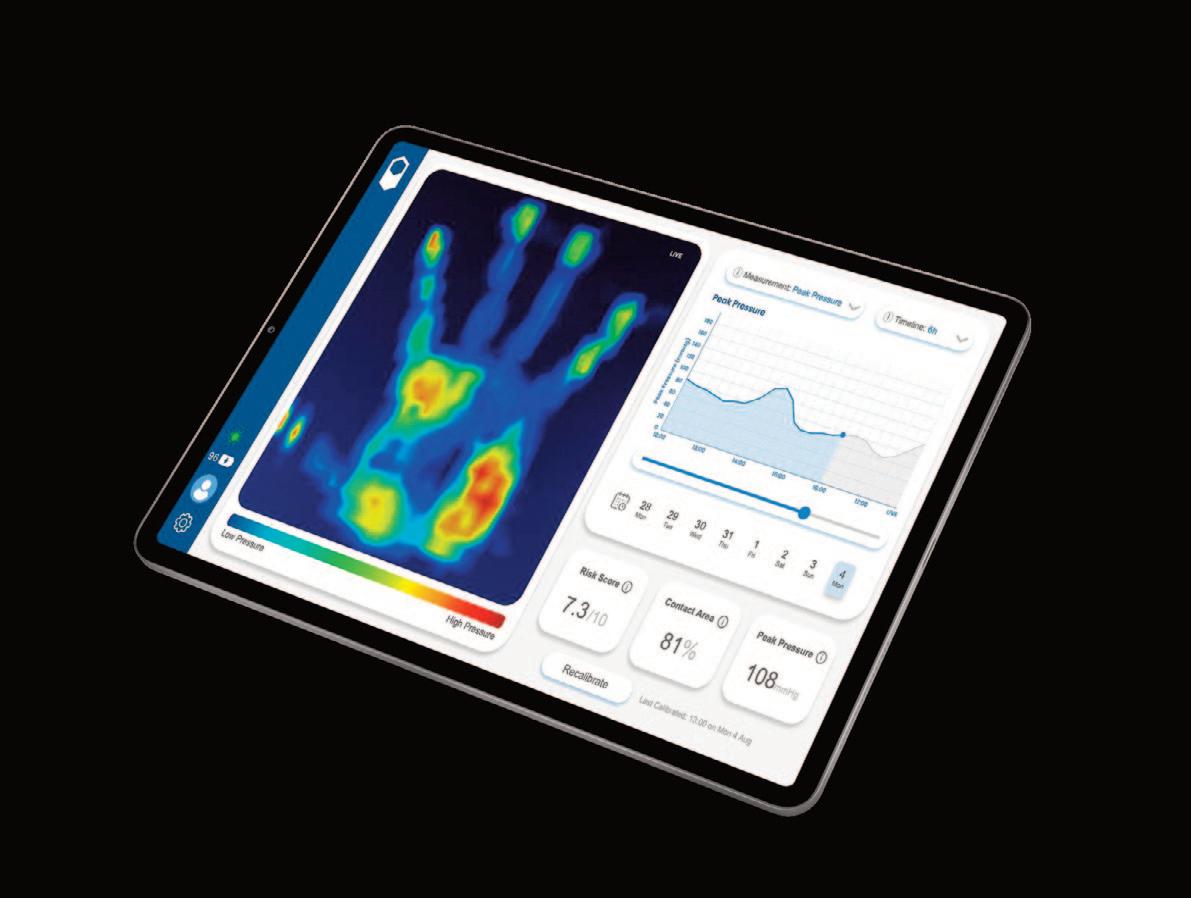
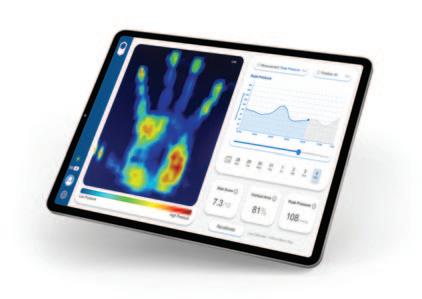
A personal early-warning system that integrates seamlessly into any wheelchair or bed, Sensore is built for elegant simplicity - restoring peace of mind for wheelchair users and supporting higher-quality, more consistent care. For care providers, Sensore can help
standardise prevention workflows and contribute to meaningful cost savings, while building a unique dataset to advance pressure-injury research.
Sensore is supported by clinical experts: "We believe Sensore’s continuous pressure monitoring will have a transformational impact on our ability to prevent and manage pressure ulcers effectively, while driving measurable improvements in patient care quality" - NHS Consultant Clinical Scientist Specialist in Clinical Biomedical Engineering
Visit www.sensore.health for more information, to sign up for early access and book a free demo. See us on Stand M35 at The Care Show
For over 60 years, Fowler UK has been proud to support the care sector with dependable commercial laundry and catering equipment, backed by expert service that puts people first. As a family-run business, we understand the pressures care providers face, and we’re committed to delivering solutions that keep vital operations running smoothly.

with comprehensive compliance and maintenance services such as gas safety inspections, preventative maintenance visits, duct cleaning and kitchen deep cleaning. This all-in-one approach provides peace of mind for our customers, ensuring they can focus on delivering high standards of care while we take care of the rest.
From supply and installation of equipment, ongoing servicing and repairs, detergent packages, right through to our in-house CAD design team, we offer a ‘one-stop-shop’ solution for all of our clients laundry and kitchen facilities.
Reliability and customer service the heart of what we do. Our fast response times and high first-time fix rate mean care providers can trust us to minimise downtime and keep essential services running without interruption. By stocking a vast range of manufacturer parts on our vans and in-house, we’re able to resolve issues quickly and effectively.
Beyond equipment sales, we support care facilities
“Supporting the care sector has always been central to our business,” said William Fowler, Director at Fowler UK. “We know how important reliable equipment is for both residents and staff, and we’re proud to play our part in helping care homes provide safe, efficient, and welcoming environments.”
With a proven track record, family values, and a commitment to service, Fowler UK remains a trusted partner for care providers nationwide.
We’d be delighted to discuss how Fowler UK can support your facility. Visit our stand - G02 at The Care Show, NEC, on 8–9 October, or contact our team today to find out more.

Each year Skopos launch new fabric collections, developed specifically with Care interiors in mind. Specialists in key attributes which help keep homes looking fresh and stylish (soil resist, antimicrobial) interior schemes can easily be pulled together using a mixture of prints, textures and plains. Leading the way at this year’s show, Skopos will be highlighting their new range of printed designs, from the Skopos STUDIO. Available on basecloths for upholstery, bedding and curtains, the fabric choices have grown, to include a waterproof and antimicrobial velvet upholstery and a textured woven upholstery. Designs from the STUDIO are split into different categories, including stripes, florals, geometric and textures.

Skopos can offer a fabric-only service or a full service; with site measure, product manufacture and installation. The Skopos team produce approximately
25,000 made-up items each year, including bed-throws, cushions and pairs of curtains, all manufactured by a highly-skilled team of machinists, cutters and pattern makers; items that are delivered and installed into different contract environments.
As with all Skopos prints, the lead-times are under one week and everything is produced locally, in Yorkshire.
Skopos also offers a Bespoke design service, for statement interiors that require something different. Our design team will work alongside you to develop ideas which can make your caring interior personal, branded and unique. For samples of any of our collections visit www.skoposfabrics.com and we look forward to catching up at the NEC on 8th and 9th October on Stand B50
PASS by everyLIFE Technologies, UK and Ireland’s leading digital care management platform, will be showcasing its award-winning software at this year’s Care Show in Birmingham.

Used by over 1,200 services and supporting more than 85,000 care professionals every day, PASS brings care planning, medication management, rostering and finance together in one simple system. The platform helps providers save time, reduce risk, and improve compliance - giving care teams more time to focus on the people they support.
Visitors to the Care Show will also be able to see PASSgenius™, the suite of AI-powered insights now built directly into the platform. PASSgenius™ analyses care notes and rostering data to highlight risks, changes, and trends that may otherwise be missed. From punctuality dashboards to health note summaries, it turns everyday information into clear, actionable insight. Robin Batchelor, CEO at everyLIFE Technologies, said: “The Care Show is always a fantastic opportunity to meet providers, share ideas, and demonstrate how digital tools can make a





The NHS Long Term Plan is reshaping healthcare to make it more personal, preventative, and accessible. At the heart of this transformation are three strategic shifts: delivering more care in the community, embracing digital solutions, and focusing on prevention rather than treatment. For patients and carers, these changes mean more support at home, fewer hospital visits, and better tools to manage health.
One innovation helping to make this vision a reality is Evondos—an automated medication dispensing service and virtual care platform designed to support safe, timely, and consistent medicine use at home.
SUPPORTING INDEPENDENCE AND SAFETY
Evondos Anna Medicine Dispensing Robot is installed in the patient’s home and dispenses pre-packed doses at the right time. It provides spoken instructions and visual cues, making it easy to use for people of different ages and abilities. If a dose is missed, the medication is stored safely and securely inside the device until a carer or healthcare professional can follow up. This is especially important for patients with time-sensitive or multi-dose medication schedules, such as those managing diabetes, Parkinson’s, or heart conditions. Evondos ensures that every dose is delivered as prescribed, helping prevent complications and hospital admissions.
PEACE OF MIND FOR CARERS

For carers—whether family members or professionals—Evondos offers reassurance. You don’t need to be present for every dose, and you’ll be notified if a dose is missed. This reduces stress and allows carers to focus on other aspects of support, knowing that medication is being managed reliably.
Evondos also supports virtual care through its built-in two-way video camera, allowing care professionals to check in with patients remotely. This adds a personal touch to digital care and helps maintain strong relationships between patients and their carers.

Care home residents, new staff and visitors can all benefit from clear way-finding signage, which is why the Care Quality Commission places great importance on a well thought out signage scheme – especially where memory care needs demand specialist input. Add the need to reflect a group's branding objectives whilst working within interior design guidelines, and the challenge for managers tasked with sourcing signage is knowing who to call. With nationwide coverage, Taylor and Pickles have a reputation for well thought out signage schemes which effectively and discreetly direct people around care homes for many of the UK’s leading care providers.
Starting with a client’s briefing, Taylor and Pickles carry out a comprehensive site survey and develop
Evondos includes a built-in roaming cellular SIM card, which means it connects automatically—no home internet or technical setup is required. Patients don’t need to understand or manage any digital connectivity. This makes Evondos accessible to everyone, including those who are not confident with technology or live in areas with limited digital infrastructure.
TRAVEL MODE FOR FLEXIBILITY
Evondos also includes a travel mode, allowing patients to take their medication with them when away from home—whether visiting family, going on holiday, or staying in respite care. This keeps routines consistent and supports independence, even when life changes temporarily.
EQUALITY
Evondos is built with equality at its core. Its intuitive design, secure medication handling, automatic connectivity, and virtual care features make it accessible to people from all backgrounds. Whether you’re living alone, supported by carers, or part of a busy household, Evondos fits into your life and helps you stay well.
Evondos supports the NHS’s three strategic shifts by delivering smarter, safer, and more accessible care. For patients, it means more independence and better health. For carers, it means peace of mind and less pressure. With support for complex medication schedules, secure storage, travel flexibility, virtual care, and no need for internet knowledge, Evondos is helping bring the future of healthcare into everyday life.
If you or someone you care for could benefit from help with medication, speak to your local care team about Evondos. It’s a powerful solution designed with real people in mind.
See the advert on the facing page for details or see Evondos at The Care Show on Stand C32.
detailed design proposals. Often working with a client’s interior designers, the team at Taylor and Pickles create options for bespoke signs which provide clear directions and are sympathetic to the client’s creative concepts. This custom approach prevents signs looking out of place, or like “off the shelf” stock items.
Of course, there are times when greater visual contrast is essential. Residents with memory care needs require a bold and sometimes bright scheme which might seem heavy handed elsewhere. When the special needs of these residents are added to the brief, clients can be confident that Taylor and Pickles’s approach, guided by leading academics and their experience of helping many homes through the Care Quality Commission signage inspection process, will pay off. Often a multi-tiered approach allows signs across different zones in a development to have a cohesive look yet serve differing care needs.
Taylor & Pickles also recognise a client’s commercial needs. Timely, unobtrusive surveys – effective design and tidy installation by in-house teams make Taylor and Pickles the chosen signmaker for many of the UK’s leading care home groups.
See the advert below for details or see us on Stand F72


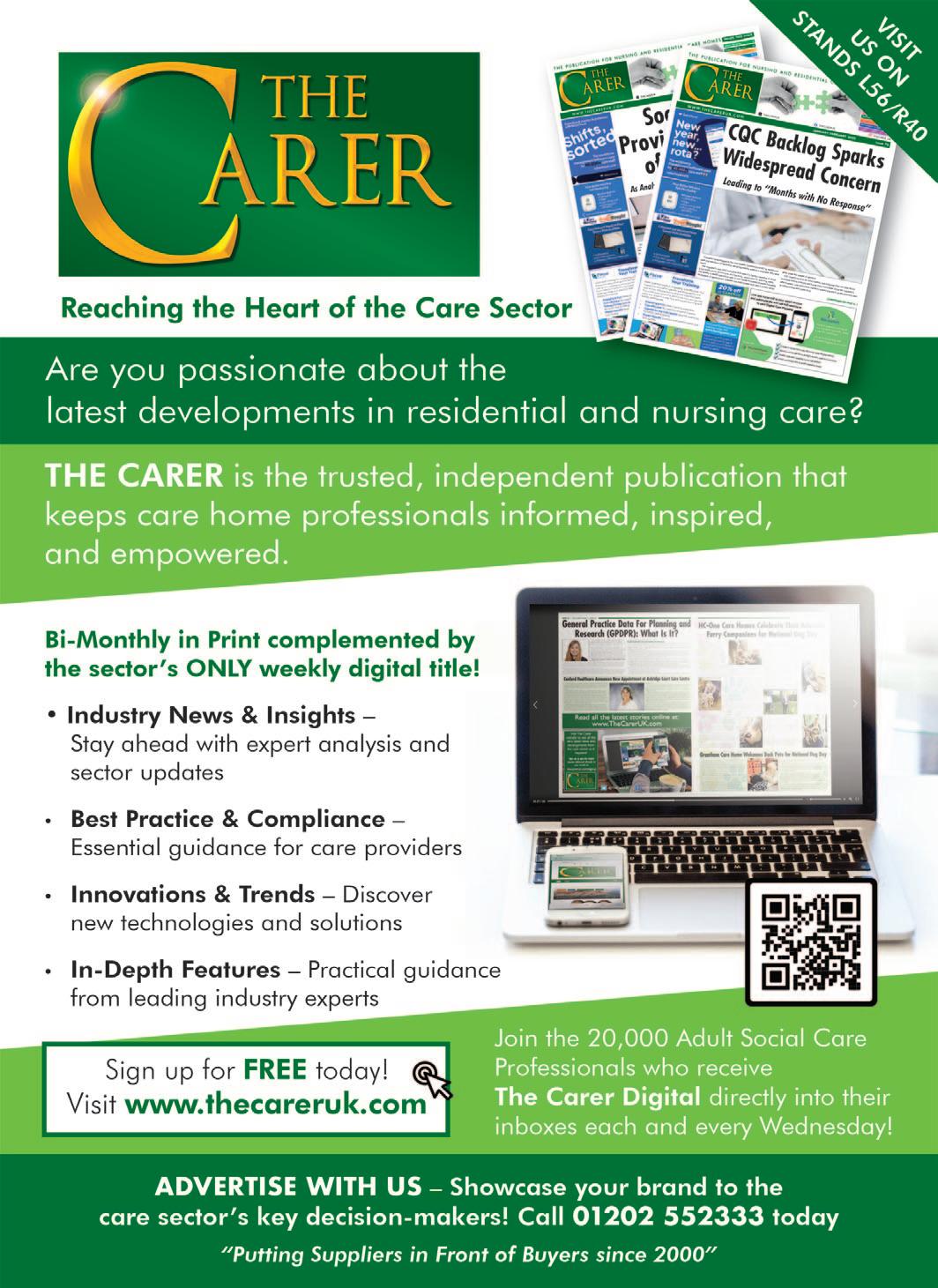
Furthermore,
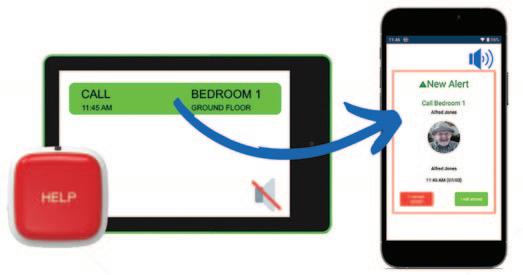



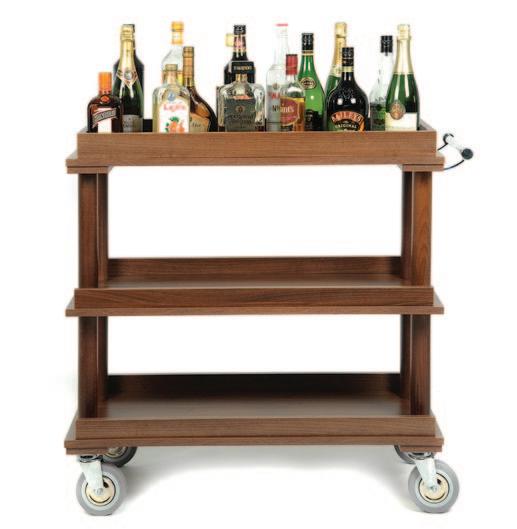
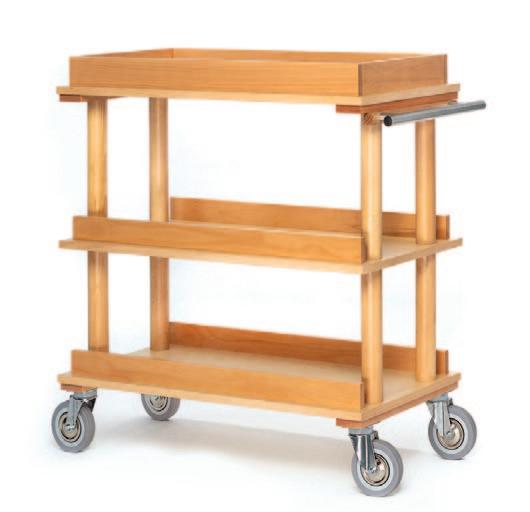
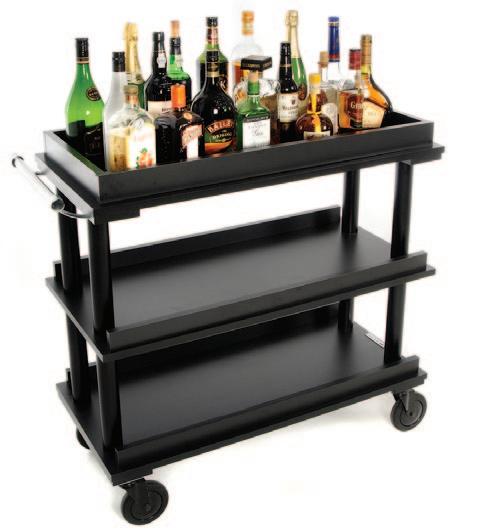
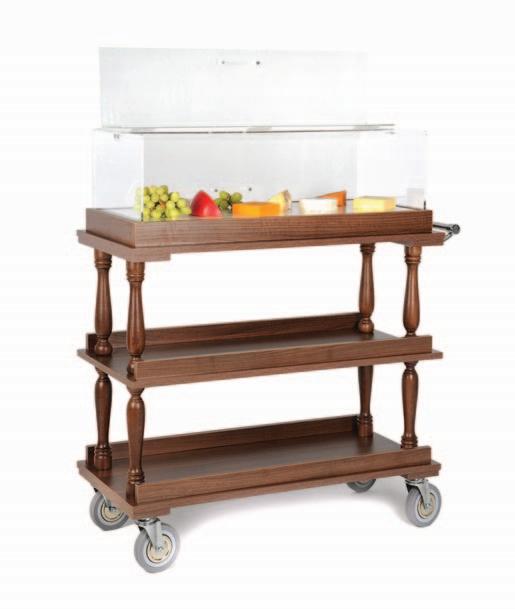
Ontex are proud to announce that we will be showcasing at the Care Show at the NEC in Birmingham on the 8-9th October. You will find us at Stand J15 and we would love for you to come over and say hello!

Our team will be there to offer advice and support on how to use our range of baby care, feminine hygiene and adult incontinence care products. Talk to us about our conti-
nence training sessions and the work we do with unpaid carers. At Ontex we work hard to develop our people and work to deliver sustainable value to our shareholders, partners, customers and suppliers, while making a positive impact on the communities around us. To find out more visit: Ontex.com
"23 years, operating 4 Devon Nursing homes, has been pretty tough, as anyone in social care, knows, only too well. And if it was hard already, after 2024 budget, it's just got harder.
Anyway, at heart, I am just customer of Eden Alternative, and it was a stroke of luck to come across this whilst on holiday in New Zealand in 2009. It started in USA in 1994 and now runs in 22 countries.

The fact that I am now involved with this not-forprofit organisation (in the UK area) came about when one of the 2 main UK directors died suddenly just before Covid. But it's something I have run with for 11 years to help make 'vision' a reality, not a struggle. So, being both a customer and helping the admin seems quite natural.
It is a modern philosophy of care, but moreover,
it's a programme that is straight forward, tried and tested for 30 years and really works.
Its member care organisations generally become trainers for their own teams, and run it themselves. The programme is run in person over 2-3 days or online 1 hr a wk for 7 weeks. You choose.
It addresses loneliness, helplessness and boredom and operates through 10 principles to underpin 7 critical domains of wellbeing.
Moreover, it's effective, transformational and really works. As residents, and team members wellbeing, matter so much , it's a must, in my opinion.
Geoffrey Cox Southernhealthcare.co.uk
eden-alternative.co.uk" See us on Stand M55.
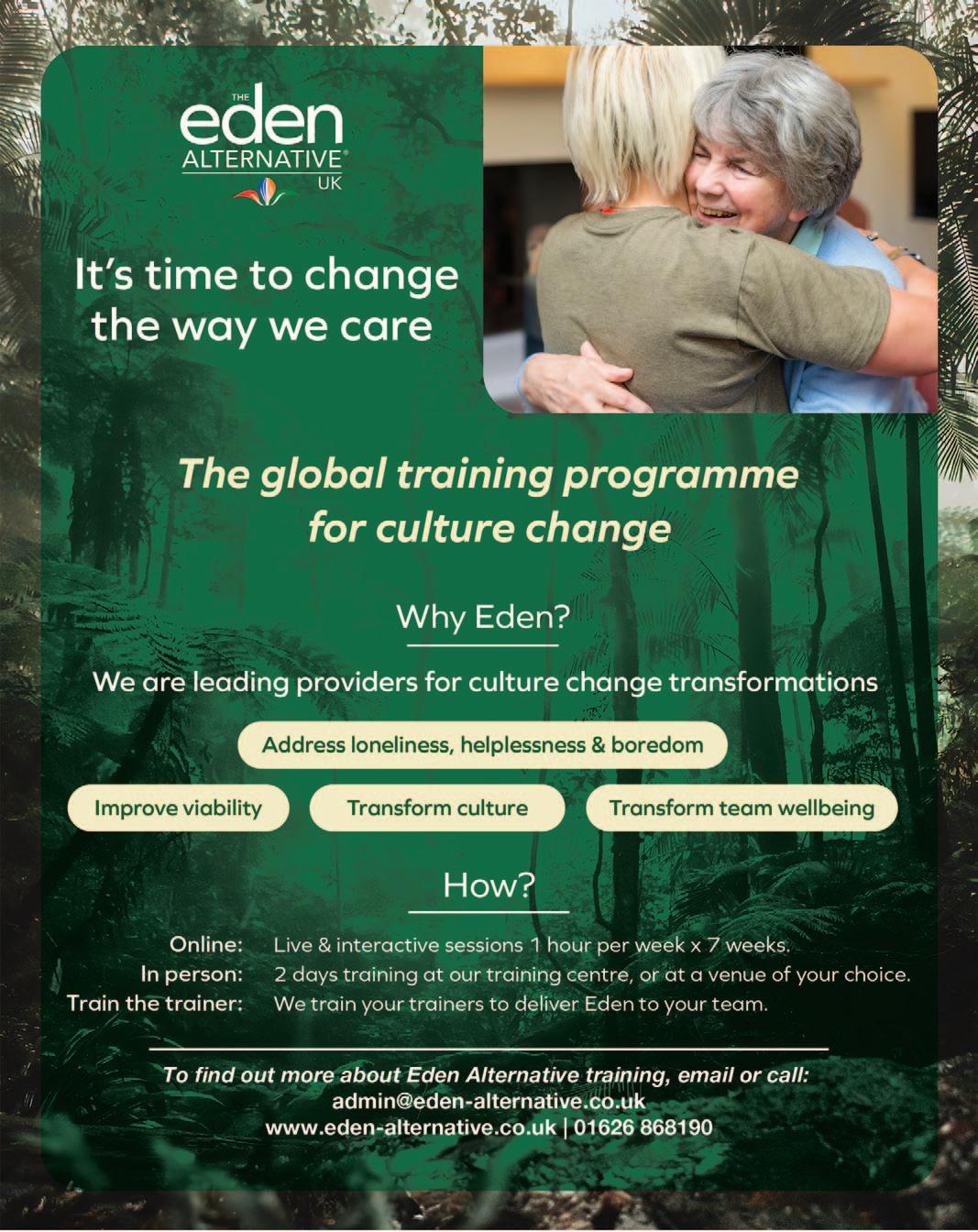
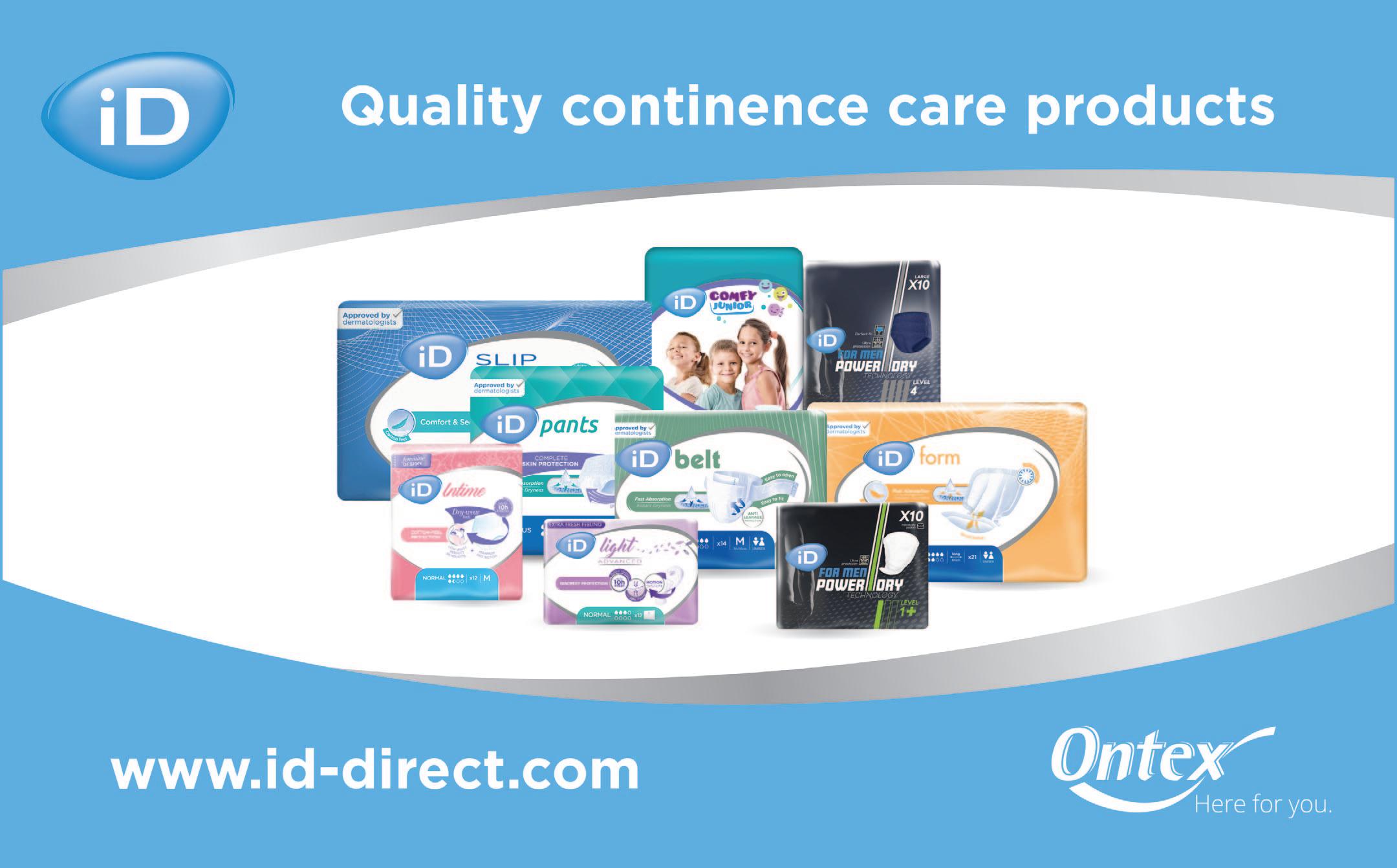

In the complex world of care-home medicine management, consistency and reliability are everything. From ensuring the right medicines arrive on time, to providing specialist support and training for staff, a single weak link can jeopardise the safety and well-being of residents. That is why more and more care providers are turning to Care Quality Pharmacy – a national, care-home-only distance-selling pharmacy – to deliver a true one-pharmacy solution.
CONSISTENCY AND SIMPLICITY
Running multiple homes often means juggling relationships with several local pharmacies. This can lead to variations in service levels, communication gaps and unnecessary administrative burden. By partnering with a single specialist pharmacy, care providers enjoy a unified approach across every home. Care Quality Pharmacy provides guaranteed monthly delivery dates, centralised prescription management and a dedicated Key Account Manager, ensuring that every home receives the same high standards of service.
ADVANCED TECHNOLOGY AND COMPLIANCE
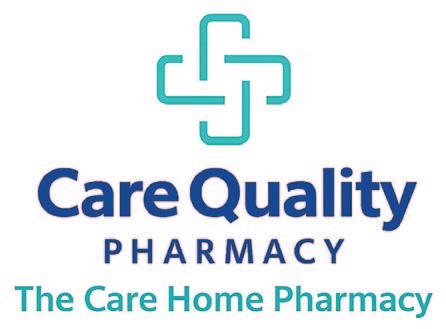
Care Quality Pharmacy harnesses advanced AI-driven prescription checking and integrates seamlessly with leading electronic MAR (eMAR) systems. These innovations reduce the risk of dispensing errors and give care teams real-time oversight of residents’ medication records. The pharmacy’s robust auditing and returns collection processes support full regulatory compliance, while scheduled annual training sessions
keep staff confident and up to date with best practice.
OPERATIONAL EFFICIENCY AND COST SAVINGS
A one-pharmacy solution eliminates duplicated processes and frees up valuable staff time. With Care Quality Pharmacy’s dedicated communications team liaising directly with GPs, homes save hours previously spent chasing prescriptions or clarifying medication queries. Interim requests are handled swiftly – often the same day –and returned medicines are collected routinely, further reducing workload and waste.
A PARTNERSHIP BUILT ON TRUST
Perhaps the greatest benefit is peace of mind. Care Quality Pharmacy’s national infrastructure, experienced team and proactive approach mean care-home operators can focus on delivering exceptional care while knowing that every aspect of their medicines management is in expert hands.
In a sector where safety, compliance and resident well-being are paramount, a one-pharmacy solution is not just convenient – it is transformative. Care Quality Pharmacy brings together specialist knowledge, cutting-edge technology and a commitment to personalised support, making it the trusted partner for care homes across the UK.
Meet us on Stand K01 at The Care Show or see the advert on the back cover for further details.
Training and learning are often treated as a requirement to be completed, but real learning is about giving your team the confidence they need to deliver safe, high-quality care. This is where blended learning comes into its own.
Blended learning recognises that effective training goes beyond theory. Knowledge is important; staff must first understand the what and the why, however knowledge alone doesn’t always prepare them for the realities of a care setting. Skills need to be practised, rehearsed and refined in an environment that’s safe before they are put into practice with residents or service users. When staff build confidence through role play, simulation, and guided practice, the leap from theory in the classroom to the real world becomes less daunting. The next step is proving capability on the job. Competency assessments connect learning with practice, giving managers assurance, regulators evidence, and service users confidence in the care they receive. But learning shouldn’t end there; structured pathways that map skills to roles, prompt refreshers, and track development over time keep staff on course,
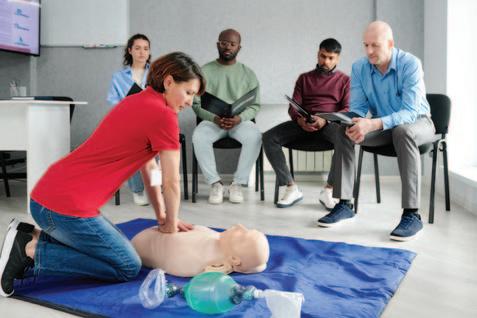
hello@myako.com
01202 283283
turning their training into a process of continual growth which is also aligned with Skills for Care standards and expectations set out by CQC. The impact on organisations is clear – teams feel supported and this improves retention, which in the Health and Social Care sector is more important now than ever. Families, inspectors, and service users see a higher quality of care, and managers gain reassurance that their workforce is competent and confident. Ultimately, blended learning creates safer, kinder, and more consistent outcomes for everyone, meaning higher care standards and greater satisfaction all round. Which is why your team deserves myAko. Blended learning is more than just an approach, it’s essential for everyone in our sector!
See us on Stand M57 at The Care Show. ww.myako.online





By Charlotte McKay, Head Chef at St Quentin Care Homes (https://hmtstquentin.org)
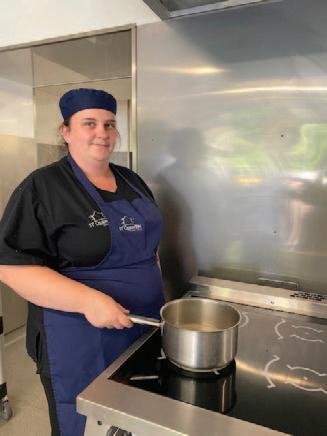
In a care home, catering can be the difference between mealtimes that are anticipated with pleasure and those that are simply endured. Care itself is rightly personalised, tailored to the needs and preferences of each resident. The same principle should apply to the food they eat. Residents and their families are entitled to expect meals which reflect dietary needs, medical conditions, and personal tastes. But delivering that level of personalisation at scale, within budget, is no small task.
The Healthcare Management Trust acquired St Quentin Care Homes almost a year ago and has made significant improvements in care delivery, infrastructure, and leadership. Catering was a big area of focus and has brought tangible results: residents returning for second helpings, heartfelt thanks from families, and a noticeable reduction in food waste. These results haven’t happened by chance; they are the outcome of deliberate choices in how we source ingredients, design menus, and create the overall dining experience.
FRESH INGREDIENTS AND A VARIED MENU
The value of using fresh ingredients over pre-packaged or heavily pro-
cessed alternatives cannot be overstated. Fresh produce boosts nutritional quality, enhances flavour, and increases the likelihood that residents will eat and enjoy their meals.
Variety is equally important. A repetitive or bland menu fails to tempt people to the dining room. Similarly, introducing a rotating weekly menu with diverse flavours and textures, including vegetarian and vegan options, will create something for everyone, which is especially important where care homes support residents of varying ages and cultural backgrounds.
Style should never overtake substance, but presentation matters and plays a vital role in whether a meal is eaten. An unappealing plate can lead to food being left untouched, no matter how nutritious it is.
Small touches make a big difference. Balancing colours on the plate, arranging food attractively, and serving it on crockery that complements the meal will encourage meals to be finished. Even something as simple as offering a platter of sandwiches with varied fillings, so residents first see vibrant colours rather than just bread, can boost appetite and engagement.
Many care home residents are unable to visit restaurants, and for them, mealtimes are often the closest equivalent to dining out. Recreating elements of that experience can lift the mood and turn a necessary routine into a highlight of the day.
Printed menus with clear, attractive typography help residents feel they have real choice and control. For some, reading a menu may even stir
fond memories of past outings and family meals. This small detail reinforces the dignity and pleasure of the dining experience.
Sharing food is a social occasion. In care homes, shared meals can foster community spirit, reduce loneliness, and spark conversation. Making mealtimes engaging and enjoyable benefits both emotional wellbeing and nutritional intake.
This means paying attention to more than just the food. Lighting, music, table layout, and staff interaction all contribute to the atmosphere. A team that works seamlessly from kitchen to dining room by greeting residents warmly, knowing their preferences, and encouraging participation can transform mealtime into a joyful daily event.
Great catering doesn’t happen in isolation. It relies on strong collaboration between chefs, care staff, activities teams, administrators, residents, and families. Open communication ensures dietary needs are met, allergies are avoided, and preferences are respected.
When everyone takes shared responsibility, residents benefit from meals that are not only safe and nourishing, but also deeply satisfying. The catering team gains valuable insight from care staff who know residents well, while residents themselves feel heard and valued.
Ultimately, catering in a care home is about far more than providing three meals a day. It’s about respecting individuality, supporting health, and creating moments of joy. When meals are thoughtfully planned, beautifully presented, and shared in a warm environment, they nourish the body and the mind.
Danielle Smith, registered nutritionist and head of nutrition at Added Value Enterprises Ltd (AVE), explains how nutritional consultancy can enhance the wellbeing of residents in care homes
In care homes, food is far more than a daily routine - it is central to health, comfort, and quality of life. Mealtimes are moments of dignity and social connection, yet the nutritional value of what is served plays a critical role in residents’ wellbeing. As awareness of food and health grows, the sector faces a vital challenge: to move beyond meeting the minimum requirements to embracing nutritional guidance that truly supports residents.
For years, catering has focused on compliance such as reducing salt, lowering sugar and limiting fat. But good nutrition is also about what we add: nutrient-dense ingredients, fresh produce and the creation of recipes that avoid over-reliance on ultra-processed products. Families are asking sharper questions about what’s included in meals and inspectors increasingly recognise the link between diet, health, and resident satisfaction. This is where effective nutrition consultancy makes a difference. Regular menu analysis and assessing how
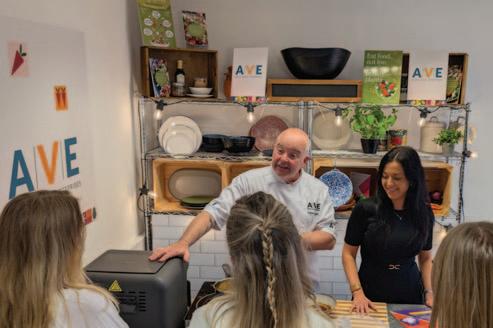
healthy a dish is can highlight where small adjustments can bring big benefits. Bespoke advice ensures meals meet specialist needs ranging from dysphagiafriendly recipes to heart-healthy dishes that promote long-term vitality. Importantly, training equips catering and care staff to understand why nutritious food matters. At AVE, we can provide guidance that is practical as well as strategic: from developing tailored menus to creating engaging wellbeing initiatives such as hydration days or condition-specific workshops. We can analyse menus to assess the nutritional value of each dish and provide advice on how to make improvements. By embedding this expertise, care homes can demonstrate both compliance and genuine commitment to residents’ health and wellbeing.
In today’s landscape, nutritional oversight is not an optional extra - it is a cornerstone of quality care. With residents and families better informed, the homes that embrace guidance will not only meet expectations but exceed them, ensuring food continues to nourish both body and mind.
See the advert on this page for details, visit www.a-v-e.com or
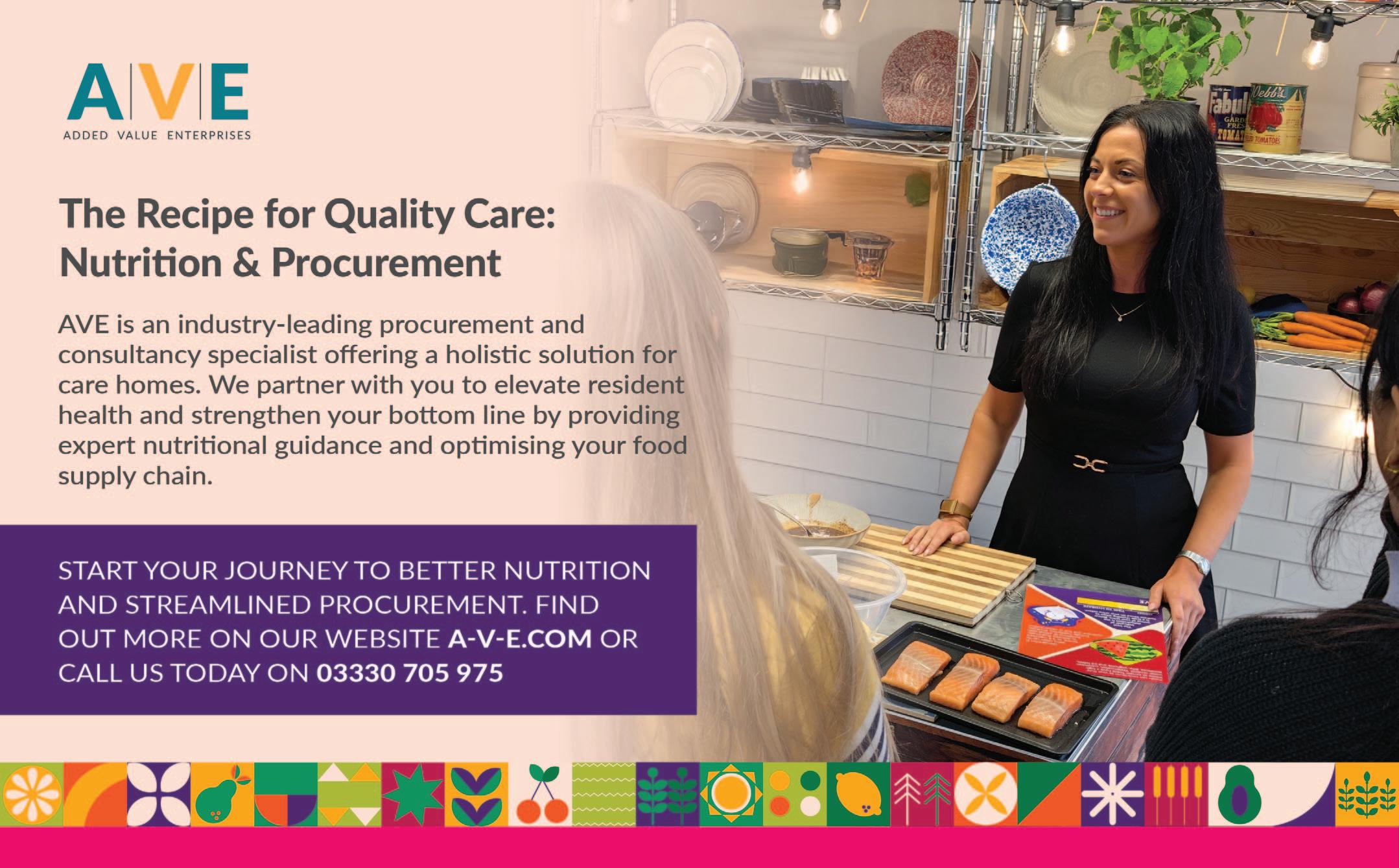
By Gemma Christie, Business Account Manager at Miele

In the care sector, operational decisions carry significant weight. Whilst frontline care rightly takes centre stage, it’s also important to remember that the kitchen plays a vital role in maintaining hygiene, supporting staff efficiency, and ensuring resident wellbeing. Among the many moving parts of the care home kitchen, dishwashing is often overlooked. This is likely because it operates behind the scenes and isn’t seen as a direct part of resident care, yet it’s a key consideration for care homes looking to provide a safe, smooth service.
With multiple meal services each day, the kitchen is one of the busiest areas in a care home. Relying on manual washing not only slows down operations but also increases the risk of hygiene lapses. That’s why investing in the right dishwashing solution is critical.
For care homes looking for reliability, hygiene assurance and longterm value, commercial solutions are the smart choice. Here are five key reasons why investing in a professional dishwashing solution can make a meaningful difference.
WHY DOMESTIC DISHWASHERS FALL SHORT
It’s not uncommon for care homes to rely on domestic dishwashers, especially when budgets are tight. But these machines are rarely up to the task. Designed for occasional household use, they struggle with the frequency and intensity of care home operations. Over time, this can lead to breakdowns, inconsistent results, and even hygiene risks. Commercial dishwashers, by contrast, are built for durability and performance. They’re tested to withstand thousands of cycles and are engineered to maintain consistent cleaning standards, even under intense pressure. For care homes, this means fewer disruptions, lower
long-term costs, and greater piece of mind.
HYGIENE RESULTS YOU CAN TRUST
It’s no secret that infection control is always a top priority in any care or medical settings, especially with residents that are often more vulnerable to illness, and where outbreaks can have serious consequences. Dishwashing equipment can help to fight against these infections and play a big role in preventing cross contamination. But only if it’s up to the job.
High-performance commercial machines, such as the MasterLine range by Miele Professional offer disinfection-grade wash cycles that eliminate harmful bacteria and pathogens. Some models also feature advanced drying systems that remove the need for manual handling, further reducing the risk of contamination. These features aren’t just nice to have, they’re essential for maintaining compliance and protecting residents.
SPEED AND EFFICIENCY IN THE KITCHEN
Care homes run on tight schedules. Mealtimes are fixed, and delays can have a knock-on effect across the day. That’s why turnaround time is a key consideration when selecting dishwashing equipment.
Modern commercial dishwashers can complete a full cycle in as little as five minutes, ensuring that clean items are always available when needed. This reduces the need for excess crockery and helps staff stay focused on resident care rather than kitchen logistics.
Supporting staff and reducing their workload
The right equipment doesn’t just improve hygiene standards, it also helps to support staff wellbeing. In a sector where recruitment and retention are constantly ongoing challenges, anything that eases the daily workload is a welcome investment.
User-friendly controls, intuitive interfaces, and automated features such as detergent dosing or drying programmes can make a real difference to staff efficiency and satisfaction. When equipment actually works with your team, and not against them, it frees up critical time and energy for what matters most, caring for their residents.
A LONG-TERM INVESTMENT
While the upfront cost of commercial dishwashing equipment may be higher, the long-term benefits are clear. Reduced maintenance,
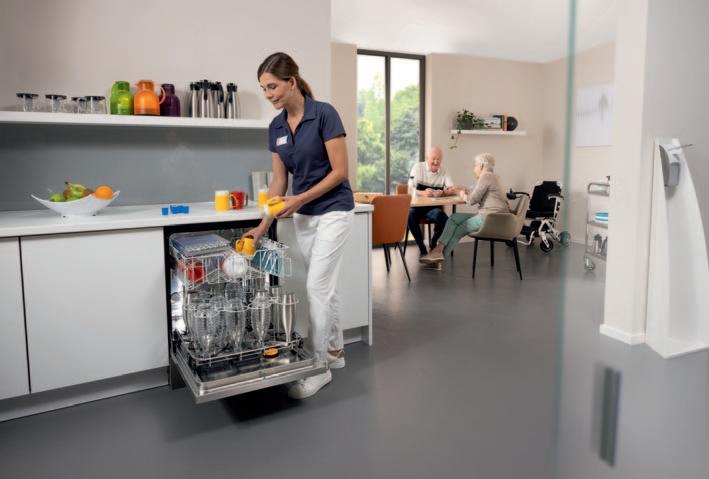
lower energy and water consumption, and extended service life all contribute to a more sustainable and cost-effective operation. For example, Miele Professional’s MasterLine dishwashers can complete a full cycle in just 5 minutes and use as little as 5.0 litres of water per cycle, depending on the model. Their energy-efficient design helps reduce utility costs while maintaining top-tier hygiene performance. Some dishwasher manufacturers offer extended parts availability and nationwide service networks, ensuring that support is always close at hand. Miele Professional offers spare parts available for up to 15 years after production ends and a UK-wide service network with a 90%+ first visit fix rate meaning that care homes can rely on consistent, expert support when it matters most.
Dishwashing may not be the most visible part of care home life, but it’s one of the most vital. By investing in the right equipment and processes, care homes can enhance hygiene, improve efficiency, and create a safer, smoother environment for both residents and staff.
To explore how Miele Professional's commercial dishwashing solutions can enhance your care home, please visit: https://www.miele.co.uk/p/retirement-care-homes-4053.htm

In the care sector, food is more than just nutrition - it’s comfort, dignity, and a way of bringing joy to residents every day. That’s why chefs can’t afford to compromise. From flavour and safety to consistency and versatility, every ingredient has to deliver. When it comes to bouillon, Knorr Professional refuses to settle for anything less than the best and so do the chefs who use it.
Knorr Professional Bouillon is the UK’s number one bouillon brand*, trusted in kitchens nationwide for its rich depth of flavour, outstanding versatility, and chef-trusted consistency. It’s made to work hard in every service, withno allergens to declare¹ options that give chefs peace of mind when catering for residents with diverse needs. NEVER SETTLE FOR BLAND DISHES
As residents age, their sense of taste can diminish. That’s why flavour has to work harder in care - it’s not just about nutrition, it’s about enjoyment. Knorr Professional Paste Bouillon brings bold, balanced flavour that cuts through reduced senses, ensuring dishes remain satisfying and memorable.
Whether it’s used as a base, rub, seasoning, glaze, or marinade, it delivers the same consistent, chef-approved results. From soups and stews to roasted vegetables and marinades, this is one product that performs across the menu - helping chefs adapt quickly without losing quality.
NEVER SETTLE FOR UNCERTAINTY
In care kitchens, allergen safety isn’t negotiable. Theno allergens to declareoptions in Knorr Professional Paste Bouillon make it simple to create inclusive dishes without sacrificing flavour. This helps reduce the risk of cross-contamination and ensures every resident can enjoy the same great taste.
For Knorr Professional Care Ambassador Preston Walker, that confidence is invaluable:
“With ‘no allergens to declare’ options available across the range, Knorr Professional Paste Bouillon is easy to introduce into dishes that need to be suitable for varying needs and preferences,” says Preston. “It gives me peace of mind that I can create flavour-packed dishes for all residents, without excluding anyone due to allergens.”
NEVER SETTLE FOR INCONSISTENCY
Care kitchens can be high-pressure environments, where time is short and the need for consistency is constant. Knorr Professional
Bouillon’s paste format makes it easy to store, measure, and use, ensuring the same flavour profile in every batch. Its consistent yield also helps with budget control - delivering premium quality without waste.
Preston sums it up simply:
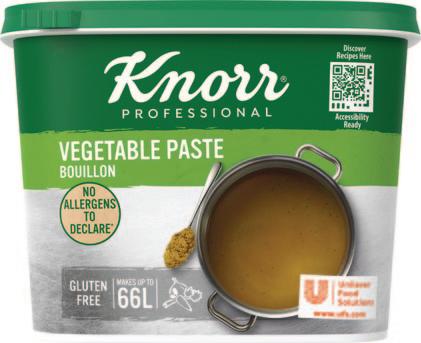
“We use the Knorr Professional Bouillon paste range for one simple reason - it delivers. Quality, flavour, consistency, and the confidence of knowing exactly what you’re going to get, every time.”
NEVER SETTLE FOR SECOND BEST
Every plate in a care home matters. It’s an opportunity to provide comfort, joy, and nourishment - and that means every ingredient has to earn its place. With Knorr Professional Bouillon, chefs can be sure they’re serving the very best in flavour, safety, and reliability. Because when it comes to care catering, settling for less is never an option.

Care home budgets are under mounting pressure. Food supply constraints, inflation, and rising labour costs are combining to create a perfect storm for operators already working to tight margins.
The British Retail Consortium’s latest survey paints a concerning picture: 85% of retailers have raised prices in response to increased costs, fuelled by rises in employer National Insurance contributions and the National Living Wage. In the catering sector, which is heavily dependent on lower-wage roles, these changes are having a pronounced impact.
The Office for National Statistics’ July CPI figures show food inflation at 4.9%, with forecasts suggesting this could reach 6% by the end of the year. According to food procurement expert allmanhall’s Managing Director, Oliver Hall says:
“Based on recent and forecasted inflation spikes, care groups may want to revisit what they have budgeted for annual food inflation for the coming months. allmanhall consistently outperform inflation with price rises lower than inflationary rates, ensuring every pound of catering spend goes as far as possible.”.

Global factors are adding further uncertainty. Extreme weather patterns are disrupting crop yields and threatening food supply chains. The resulting price volatility is not limited to raw ingredients - distribution, packaging, and processing costs are also climbing.
Faced with these pressures, some care providers may be considering outsourcing catering as a cost-saving measure. However, as Oliver cautions:
“Pause before you add a management fee on top of rising labour costs on someone else’s payroll.”
Just because you eat less, or eat differently, it doesn't mean you should settle for less.
At Food Untethered, we believe that everyone – regardless of how they eat –deserves access to real, organic, and nourishing food. Whether you are tubefed, or simply need liquid nutrition on the go, our meals are made with care, using nothing artificial and held to the highest of safety standards.
We’ve launched our first three meals: a Coconut & Banana Smoothie, a Carrot & Coriander Soup, and a Mexican Bean Stew. Each is packed with whole ingredients, made for both taste and tolerance, and suitable for use orally or via a feeding tube.
But this is just the beginning. Over the next year, we’re releasing a full range of meals that can be consumed hot or cold, snacks, smoothies, and drinks –designed with real people, real needs, and real lives in mind.
Instead, the focus should be on smarter procurement strategies that deliver sustainable, long-term cost control.
Taylor & Taylor Care provide a strong example. Partnering with allmanhall, they benefit from comprehensive supply chain management, proactive supplier negotiations, and regular consultative advice - all designed to keep costs down without compromising quality.
“From day one, the care and attention provided by allmanhall has been exceptional… I’ve been impressed by the savings we’ve already seen, the flexibility regarding suppliers and by the excellent quality.”
Click here for the full video case study:
https://www.youtube.com/watch?v=NkroiOj26fs&t=1s
In today’s climate, expert food supply chain management is more than a support service - it’s a necessity. By tracking every penny of spend, identifying efficiencies, negotiating competitive pricing, and managing suppliers, care homes can protect their budgets while maintaining quality for residents.
As Oliver concludes:
“The effects of Government policy will likely be felt in the form of higher food prices in the coming years... choices made today will play a pivotal role in shaping the future of food security”.
With the right partner, care groups can ensure good food remains affordable, responsible, and sustainable - because quality meals for residents shouldn’t cost the Earth.
See the advert on the facing page for more information.


Our food is safe, shelf-stable, recyclable, and above all, human. It's not synthetic formula. It's not baby food. It’s real food, reimagined for different appetites.
If you or someone you care for lives with dysphagia, is tube-fed, or simply needs an easier way to stay nourished, we’re here to help.
Call us today – we’re a small team, and we love to talk. Whether you’re new to this or a seasoned pro, we’ll help you find something that works.
You don’t need to compromise.
You just need food that works for you.
Food Untethered
Real food. For every way of eating. www.fooduntethered.com
Please see our advert below.

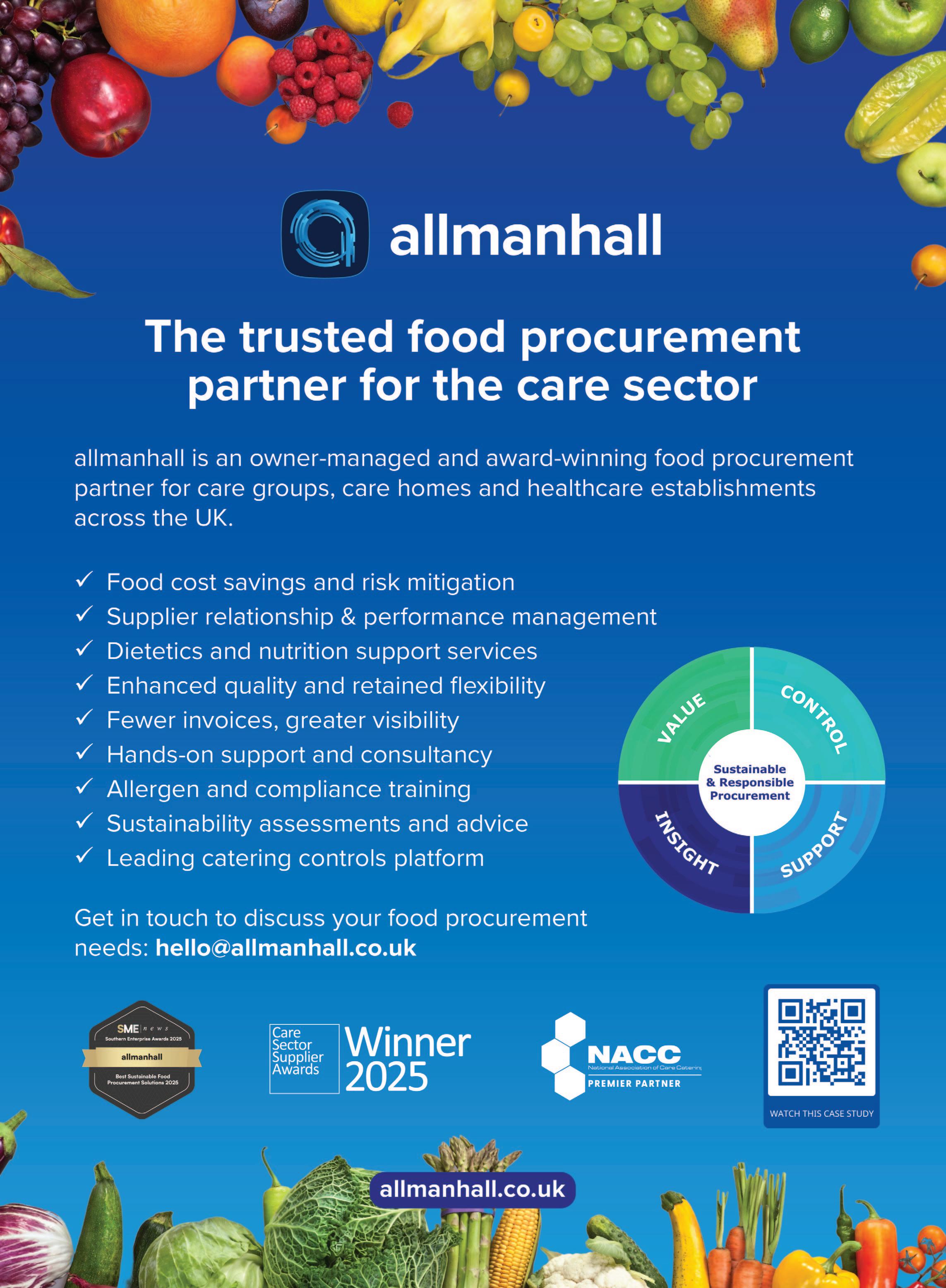

Mobile Kitchens Ltd specialises in the hire or sale of temporary catering facilities and foodservice equipment. Ideal for events or to provide temporary catering facilities during your kitchen refurbishment, our versatile units and equipment offer an efficient and economic solution to the caterers’ needs.
Production Kitchens, Preparation Kitchens, Warewashing Units, Dry Store Units, Cold Rooms and Restaurant Units are available as individual units in their own right or they can be linked together on site to form a complete complex.
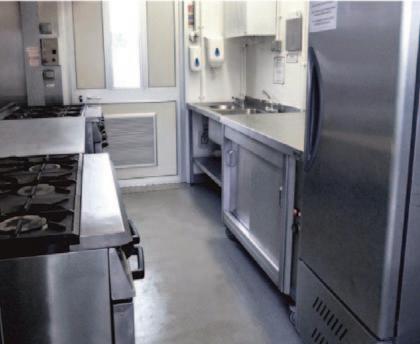
Alternatively, we can offer modular, open-plan facilities, usually for larger, longer-term hires. We offer a free design service, and project management from concept through to delivery and installation on site, plus full technical support throughout the hire period.
Commercial Kitchen and Laundry Solutions (CKLS) are one of the UK's leading suppliers of commercial kitchen and laundry equipment. Whether you are a small sized residential home or large scale nursing home group, CKLS has the expertise and equipment you need to keep your operations running smoothly.

At CKLS, we understand that the success of your business depends on the quality of the equipment you use. That's why we've made it our mission to provide businesses across the UK with the highest quality commercial laundry and kitchen equipment available. We work with only the best manufacturers in the industry to ensure that our customers get the most reliable and efficient equipment possible.
Our commitment to our customers doesn't end with the sale of our equipment. At CKLS, we know that maintenance and repairs are crucial to keeping your equipment functioning at its best. That's why we offer a full range of maintenance and repair services
to our customers, including emergency repair services available 24 hours a day, 7 days a week.
We believe that our success as a company is measured by the success of our customers. That's why we're constantly striving to provide better products and services to help our customers achieve their goals. We're proud to say that our commitment to excellence has earned us a reputation as the go-to provider of commercial laundry and kitchen equipment in the UK.
So, if you're looking for reliable, high-quality commercial laundry and kitchen equipment, look no further than CKLS. With our extensive range of products and services, we're confident that we can help you find the right equipment to meet your needs and keep your business running smoothly for years to come.


In care homes, where hygiene, safety, and reliability are paramount, it’s essential that laundry operations run seamlessly. Forbes Professional’s Complete Care solution is tailored to meet the specific demands of this environment, offering fully supported and cost-effective laundry systems. With Complete Care, care homes benefit from access to premium commercial laundry appliances without upfront capital expenditure. The allinclusive rental plan covers installation, routine servicing, maintenance, and repairs; enabling staff to focus on resident care rather than laundry appliance logistics. Unexpected breakdowns can severely disrupt operations, which is why Forbes provides nationwide, award-winning support with a same or next-day engineer response to minimise downtime. Preventative servicing is central to Forbes’ approach. Their offering includes routine maintenance, full certification, annual gas safety checks, and professional dryer duct cleaning - ensuring systems meet all legal and regulatory standards. Whether supporting existing machines or those rented through Forbes, this proactive strategy improves operational efficiency and reduces risk.

Under Regulation 35 of the Gas Safety Regulations 1998, annual gas inspections are mandatory. Forbes’ Gas Safe-registered engineers conduct these checks to ensure safe, legally compliant environments. Additionally, regular duct cleaning - often overlooked - is vital not only for performance but also for fire prevention. Forbes’ nationwide service mitigates these risks while optimising dryer efficiency.
Whether you need new rental equipment, service and maintenance for existing appliances, or a full purchase, Forbes offers flexible procurement routes to suit different operational models and budgets. Their expert consultants work closely with care providers to design tailored solutions for each setting.
With decades of experience in the care sector, Forbes Professional is a trusted partner to care homes across the UK; delivering dependable, fully supported laundry solutions that prioritise safety, compliance, and peace of mind.
forbespro.co.uk | info@forbes-professional.co.uk | 0345 070 2335
See the advert on page 27 for more information.
SOUTHERN Contracts is one of the UK’s leading suppliers of industrial laundry, catering and commercial cleaning equipment.
Founded in 1964 to initially supply and maintain commercial cleaning equipment to the marine industry, we have since grown to become a well-respected and trusted partner to leading manufacturers.
We have consistently been the top performing Laundry Partner to Electrolux Professional and again achieved their top Laundry Partner Award for 2024. We’ve now won this accolade consistently for well over 20 years.

Now in our third generation and still very much a family run business, we are proud to now be a global supplier of not only laundry equipment, but with knowledge gleaned over the years, we are also a go-to company for professional kitchen appliances and commercial cleaning equipment. With our knowledge of most market products, we pride ourselves on delivering the very best solutions and service to our customers.
Already working for many of the national Care and Nursing Homes, as well as the hospitality industry such as hotels, restaurants and holiday parks, we understand the importance of keeping ‘down time’ to a minimum and by keeping in stock the leading commercial washing machines, tumble dryers and cleaning equipment we can sometimes just swap machines over to keep your business up and running. We are able to offer independent and unbiased advice to ensure your purchase precisely meets your
requirements and budget, across a complete array of different products and models. Our expert team of technical staff are on hand to ensure your business is supported through every aspect of your purchase or rental agreement.
From advising on current government standards (eg. infection control for commercial washing machines and meeting government legislation for kitchen appliances) our team fully support you throughout the whole journey, from initial advice to delivery, installation, customer training, ongoing maintenance, service and repair. We hold many accreditations for safety and service excellence, providing peace of mind to all our customers, whether existing or potential.
For more information regarding our services for :
- Commercial laundry equipment
- Commercial kitchen appliances and warewashing/dishwashing
- Commercial cleaning equipment
Please visit our website at southerncontracts.co.uk and see previous projects we’ve worked on and our enviable testimonials received from happy clients across a plethora of sectors.
Contact us now on 03301 222888
Follow us on : Facebook, Twitter, Instagram and LinkedIn
See the advert on the previous page for information.
At PDS, we understand the challenges that come with managing laundry in a care home. From bedding, towels and tablecloths, to cleaning the clothes of residents, we appreciate that you need a care home laundry repair service and care home laundry equipment you can rely on.
Here at PDS, we provide care home laundry equipment to suit the needs of your setting. We offer many big-name industrial brands such as Alliance, Electrolux, Miele, Girbau, Grandimpianti and Schulthess.
As your trusted care home laundry repair services partner, we can help you with more than just supplying equipment. Our care home laundry services include laundry consultations, project design and management, equipment supply and installation, spare parts and more.
Our care home washing machines range from 6kg to 30kg drums for small to medium-sized care settings, and from 26kg to 40kg ones for larger care homes with more demanding laundry needs. We offer a full range of care home laundry equipment to meet your needs. Our equipment includes:
• Washing machines
• Tumble dryers
• Stacked equipment
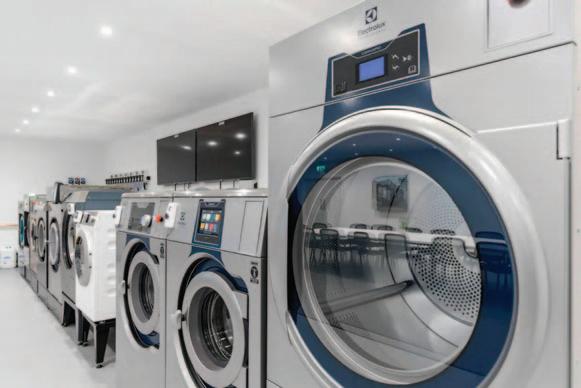
• Ironers
We supply everything from compact care home washing machines to larger ironers and stacked systems, tailored to suit your available space, daily routines and laundry demands. Our aim is to make laundry simple and efficient, so your team can focus on providing the best care for your service users.
With more than 30 years of experience, our in-house engineers offer expert support nationwide. Wherever you’re based, we’re here to keep your laundry equipment performing at its best.
If you run or manage a care home and are looking for a care home laundry repair services partner, then look no further than PDS. We’ve been helping care homes just like yours since 2007 and are one of the most trusted suppliers of care home laundry repairs and care home laundry equipment. We are here to help keep your care home running smoothly. Please get in touch
discuss your requirements with a member of our friendly team.
Please call 02476 880880, email sales@pdssolutions.co.uk or visit www.pdssolutions.co.uk for more information.
Please see the advert on the facing page.
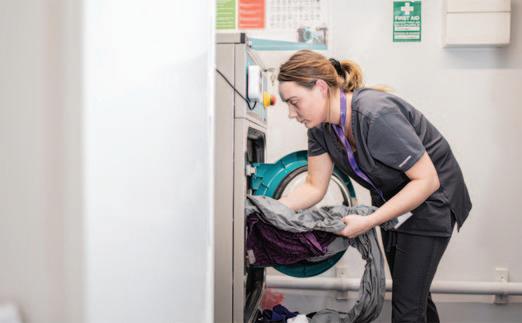
If you are looking for high quality wash results that remove stubborn stains then speak with MAG for their recommendations. Complete thermal disinfection is a standard feature on their washing machines for nursing homes. To find out more about how MAG can support your care home telephone 01353 883025 or


We

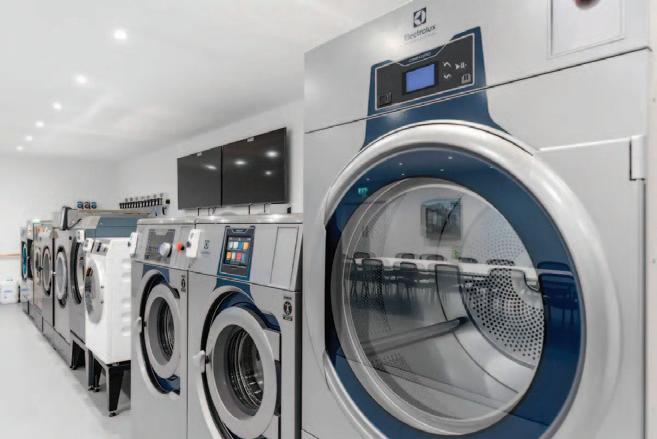
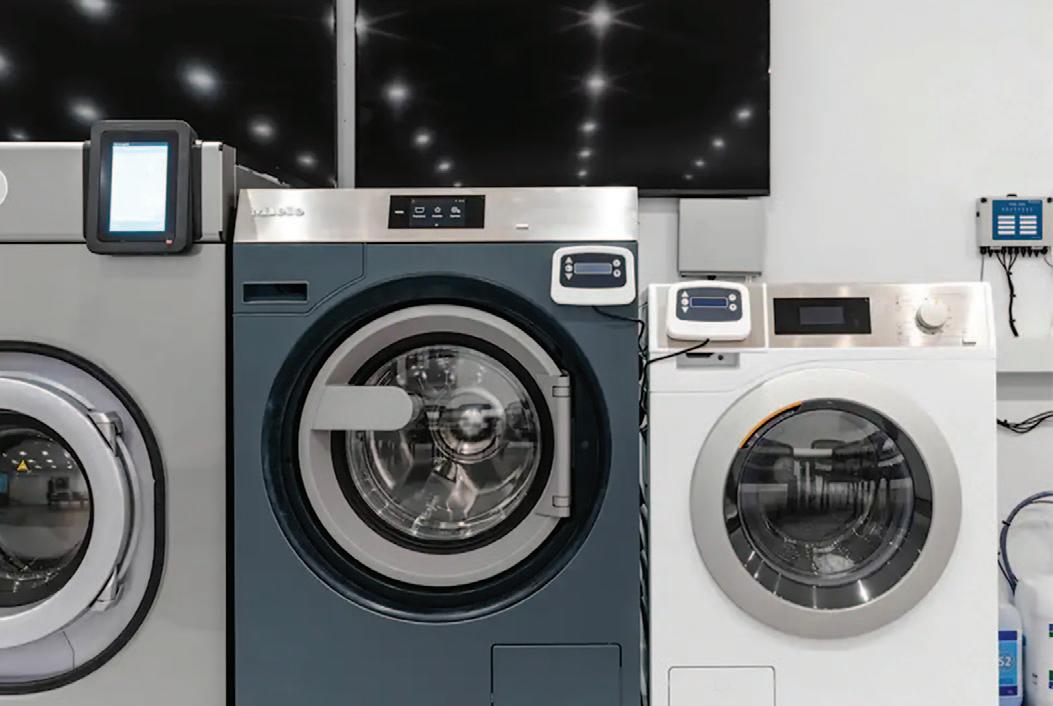
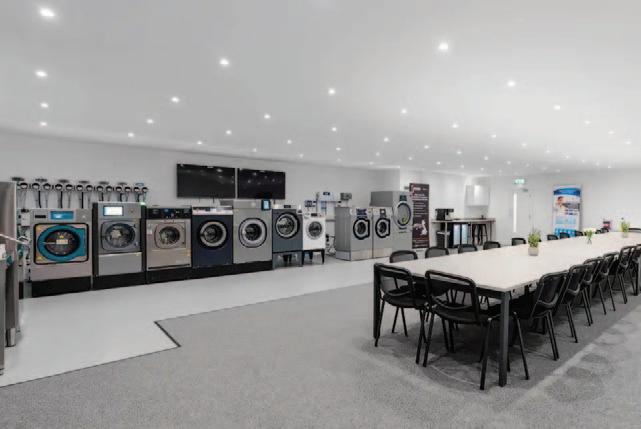

•
•

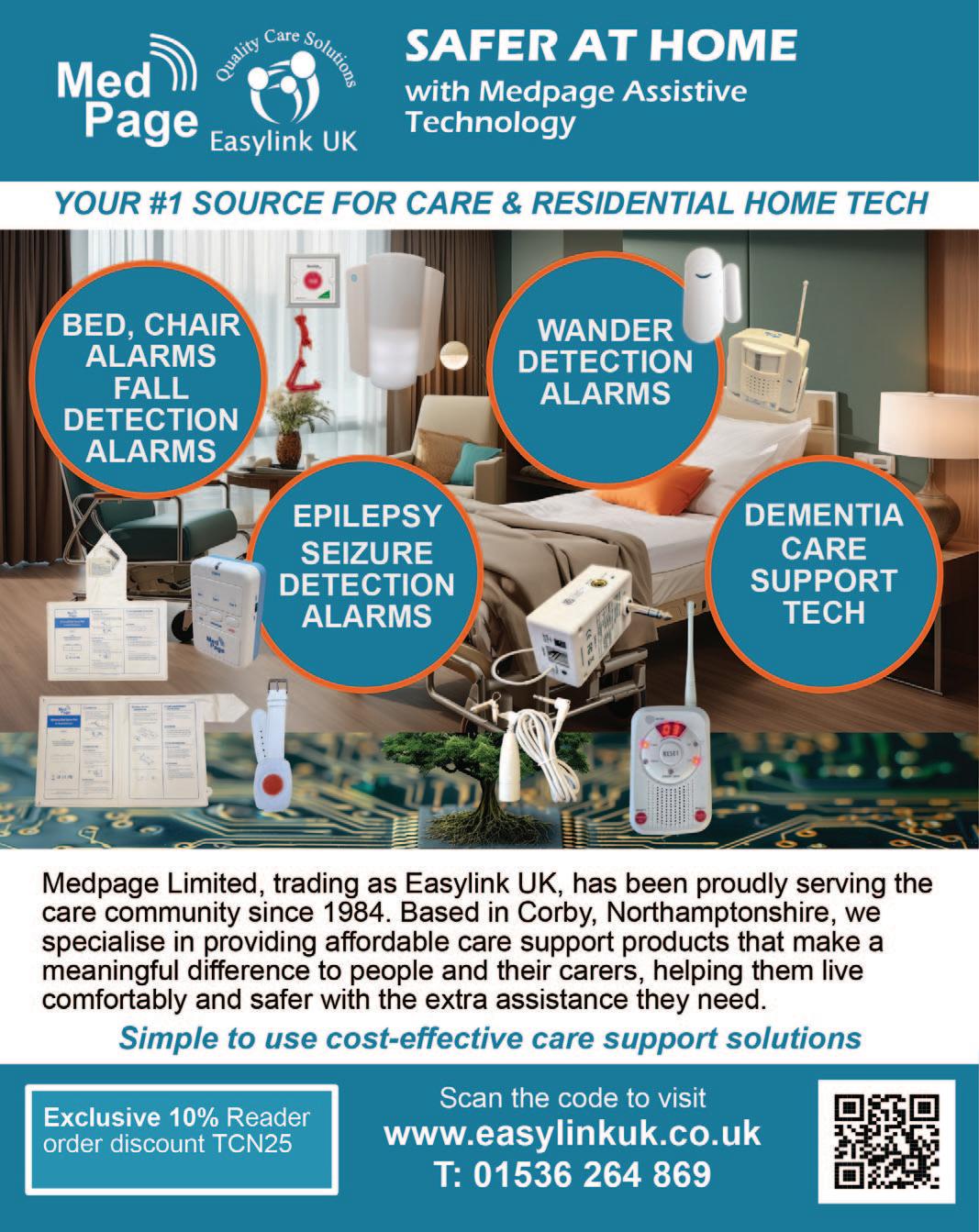

Falls Prevention Awareness Week took place this year between the 22nd and the 26th of September, and as the autumn months are upon us, the weather is beginning to change, making it important to address the types of hazards that are now more likely to occur.
Things like snow, ice and fallen leaves can cause serious accidents for both residents and colleagues and Falls Prevention Awareness Week looks to raise awareness of these hazards to protect those who may be affected.
In 2024 the Health and Safety Executive estimated the cost of slips and trips in the workplace to the UK economy was £500 million in terms of employee absence, lost production, and other costs to business.
Slips and trips in the workplace were also estimated to have cost the NHS over £800 million in 2024 hospital admission and treatment costs.
Phil Clarke, Head of Health and Safety at Care UK (www.careuk.com) says: “It’s important that we are proactive in helping our colleagues through the winter months. By reducing the number of slips and trips we can make sure everyone is safe when
they’re moving around within the homes which, most importantly, helps colleagues to ensure that residents can lead fulfilling lives.”
As part of Phil’s plans to help Care UK-run homes with their awareness of hazards posed during the winter months, he has launched Sliptember, a campaign that aims to keep people safe and aware during the month of September and beyond.
Phil says: “The main thing we can do is plan to deal with these potential issues ahead of time. This includes stocking up on grit or salt and clearing up fallen leaves regularly. A combination of rotting leaves and frozen ground provides a dangerous slip and trip hazard to both residents and colleagues.”
As part of this campaign, Phil is using the acronym CHIMES to create an easy way for people to remember what we can be doing to prevent slips and trips.
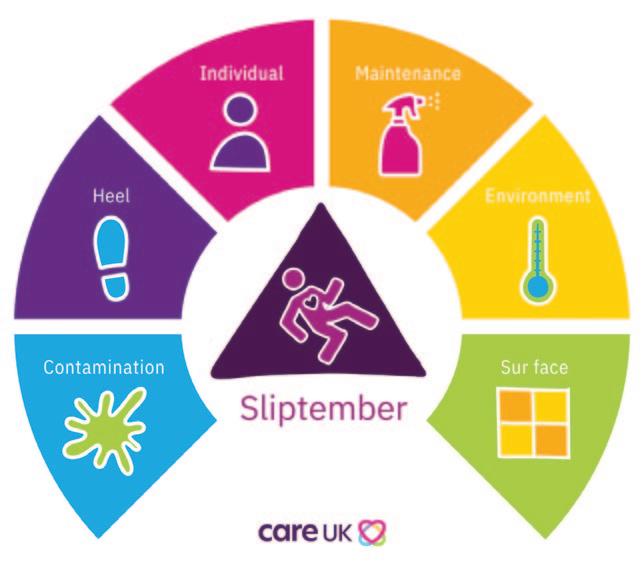

Fall Savers®, are an experienced market leading healthcare provider of resident safety solutions for over 15 years.
FALL SAVERS ® WIRELESS MONITOR
Eliminate all cables with our new generation falls management solutions!
Upgrade your falls programme with the latest technology from Fall Savers®. The NEW Fall Savers® Wireless eliminates the cord between the monitor and sensor pad. This results in less work for nursing staff, improved safety for patients and reduced wear and tear on sensor pads. Wireless advantages include the ability to use one monitor with two sensor pads simultaneously and support for many new wireless devices.
BENEFITS INCLUDE:
Safer for patients; less work for staff
Bed and chair pads available
One monitor works with two sensor pads
Integrates with most nurse call systems
A variety of options, including:

Floor sensor mat
Wireless door/window exit alerts
TREADNOUGHT ®FLOOR SENSOR PAD
The TreadNought® Floor Sensor Pad is built to last with a durable construction that far out lasts the competition. Our anti-bacterial floor sensor pad is compatible with most nurse call systems or can be used with a portable pager to sound an alert when a person steps on to the sensor pad. Caregivers typically place the sensor pad at the bedside, in a doorway or other locations to monitor persons at risk for falls or wandering. An optional anti-slip mesh reduces the potential for slippage on hard surface floors.
FEATURES INCLUDE:
Connects directly to most nurse call systems
High Quality anti-bacterial Floor Sensor Pad
Large Size Pad: Measures (L) 91cm x (H) 61cm
Options (sold separately):
Anti-slip mesh for hard surface floors

See the advert on this page for further details or visit www.fallsavers.co.uk.
Courtney Thorne, a long-standing innovator in healthcare communication systems, is setting new standards in the care home sector with its advanced wireless nurse call technology—designed to improve resident safety, enhance staff efficiency, and support a more responsive care environment.
With over 30 years of experience serving the UK healthcare market, Courtney Thorne’s systems are now trusted by thousands of care homes nationwide. Unlike traditional hardwired solutions, their wireless nurse call systems offer non-invasive installation, scalability, and smart analytics—making them ideal for both new builds and retrofit projects.
“At the heart of our technology is the belief that better communication leads to better care,” says Graham Vickrage, Managing Director at Courtney Thorne. “Our wireless systems not only reduce response times but also empower staff
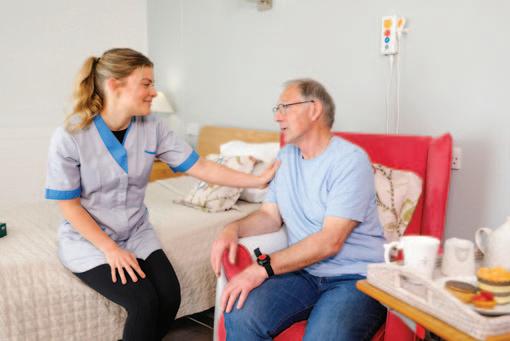
with the tools they need to deliver safe, person-centred care.”
Care providers are increasingly choosing wireless systems for their flexibility, reliability, and cost-effectiveness. With a full suite of accessories—including neck pendants, door monitors, fall detection, and bed sensors—Courtney Thorne systems can be tailored to meet the specific needs of each home and resident.
In an industry where compliance, safety, and staff pressures are always front of mind, Courtney Thorne provides more than just products—they offer ongoing support, training, and a commitment to innovation that helps care homes futureproof their operations.
For more information or to book a free demo, visit www.c-t.co.uk or contact info@c-t.co.uk.
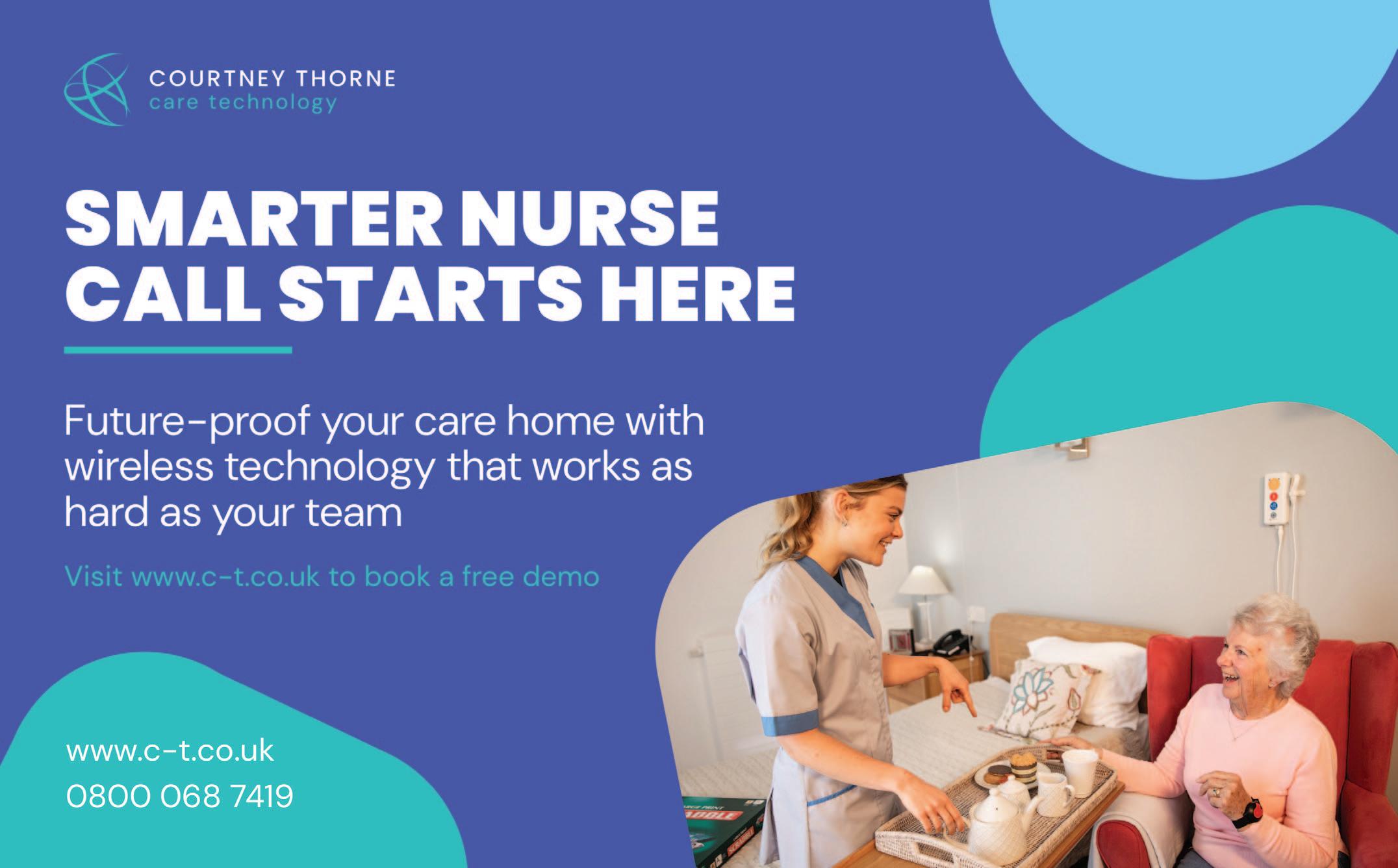
Falls are a significant concern for vulnerable individuals, especially seniors and patients at risk. Medpage, a leader in assistive technology, offers a range of cutting-edge products designed to enhance safety and provide peace of mind for caregivers and families. Here’s an in-depth look at some of their standout solutions:
MPRCG1 (2023) BED LEAVING DETECTION ALARM WITH CAREGIVER RADIO PAGER
The MPRCG1 is a comprehensive system tailored for fall prevention in domestic, commercial, and NHS care settings. This all-inclusive kit includes a bed pressure mat sensor, a BTX21-MP alarm sensor transmitter, and an MP-PAG31 radio pager. The system is designed to alert caregivers when a patient leaves their bed, reducing the risk of falls. Key features include:
Wireless Alerts: Notifications are sent to the caregiver’s pager via tone or vibration.
• Customizable Alarm Delays: Options for instant, 15-minute, or 30-minute delays.
Durable Design: Antimicrobial and disinfectant-resistant materials ensure longevity. Ease of Use: Minimal installation required, making it user-friendly and portable.
HDKMB2 HOSPITAL DISCHARGE KIT FOR FALLS RISK PATIENTS
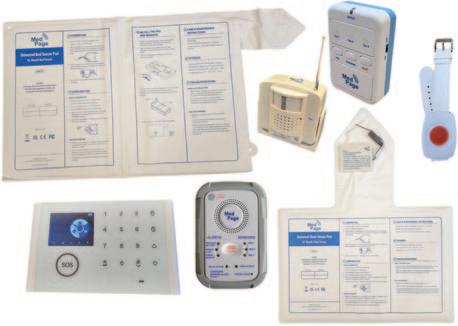
The HDKMB2 is a thoughtfully curated kit aimed at supporting patients transitioning from hospital to home care. It includes essential tools to mitigate fall risks and promote recovery. This kit is ideal for caregivers seeking a comprehensive solution to enhance patient safety during the critical post-discharge period.
MULTI-PORT WIRELESS SENSOR INPUT EXPANDER FOR NURSE CALL CONNECTION
CMEX-21
The CMEX-21 is Medpage’s latest innovation, designed to integrate seamlessly with existing nurse call
systems. This multi-port expander allows for the connection of multiple wireless sensors, enhancing the monitoring capabilities of healthcare facilities. Its versatility makes it a valuable addition to any care environment, ensuring timely responses to patient needs.
RON-WC2 WATERPROOF DISABLED PULL CORD ALARM TRANSMITTER WITH WIRELESS ALARM RECEIVER
The RON-WC2 is a robust solution for disabled individuals requiring immediate assistance. This waterproof pull cord alarm is ideal for use in bathrooms and other high-risk areas. Paired with a wireless alarm receiver, it ensures that help is just a pull away. Features include:
Waterproof Design: Suitable for wet environments.
• Wireless Connectivity: Reliable transmission to the alarm receiver.
Ease of Installation: Simple setup for quick deployment.
WHY CHOOSE MEDPAGE?
Medpage’s commitment to innovation and quality is evident in their product range. Each solution is designed with the user’s safety and convenience in mind, making them a trusted choice for caregivers and healthcare providers alike.
By investing in these advanced fall prevention tools, families and facilities can create safer environments for those at risk. Medpage continues to lead the way in providing practical, reliable solutions that make a real difference.
For more information, visit Medpage’s official website or contact their team to explore these products further. Safety starts with the right tools, and Medpage delivers just that. www.easylinkuk.co.uk
T: 01536 264 869
Alarm Radio Monitoring is the market leader in the design, manufacture and installation of bespoke, end-to-end, wireless alarm systems and solutions for the healthcare, leisure, custodial and education industries.
We have been providing wireless alarm and nurse call systems for over 30 years. Supplying care homes and hospitals with an essential lifeline that supports the delivery of outstanding care.
We believe in excellence which translates into:
Advanced Technology
Industry-leading wireless alarm technologies and software
Bespoke Solutions
We design systems to your needs rather than your team having to work around the system Innovative Design
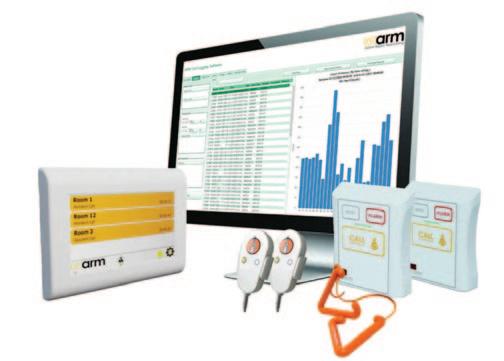
Pushing boundaries with the reliability that comes from decades in the industry Flexible Finance Options
Ensuring organisations of
or
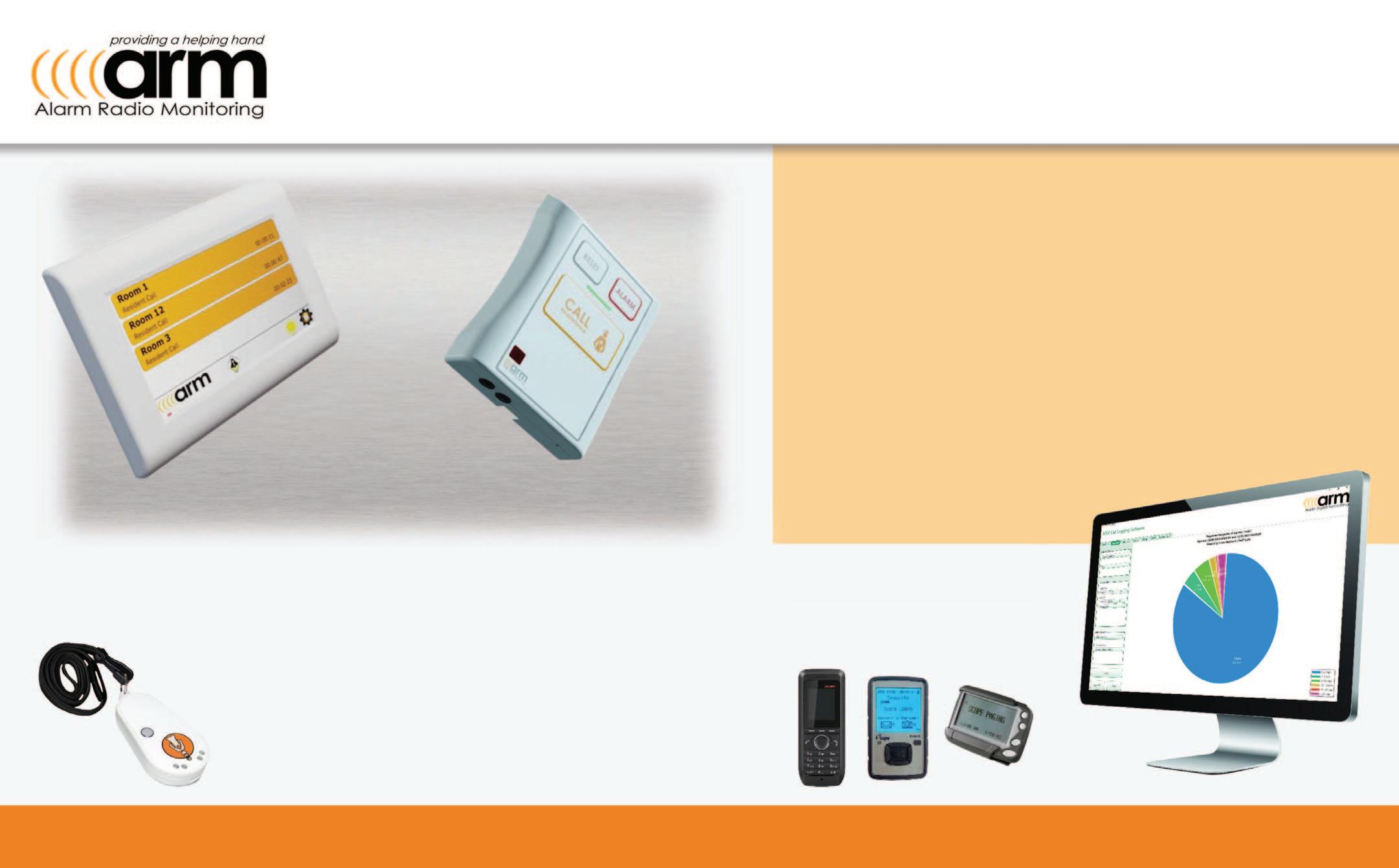
Data Analysis software provides a full audit trail of events
The all-new call logging software from ARM enhances the functionality of your care call system dramatically.
• It can help you track the quality of your service to your residents.
• It can help you demonstrate compliance with your aims and best practices, both to relatives and to authorities.
• It can help you find bottlenecks in service provision, track staffing requirements, and allow you to ensure staff are meeting expectations.
• Most importantly, it provides assurance that you know and can demonstrate what is happening in your care home.
The wireless ARM Nurse Call system has been developed over 30 years with both the client and user in mind.
It enables staff to efficiently answer calls, making the management of resources more flexible and provides the functionality you would expect of any nurse call system.
The system is quick and easy to install and works wirelessly, using radio communication between both the call points and the system infrastructure.
Call messages can be sent direct to staff to speed up response times and can also be integrated to work with smart phones & messaging.
Falls are one of the biggest challenges facing care providers – and they’re not just an issue for older people. They can affect anyone receiving care and support, including working-age adults with disabilities or longterm conditions. A fall can change someone’s life in an instant, leading to injury, hospitalisation, or loss of confidence. For staff, falls mean stress, paperwork, and the urgent task of helping someone recover safely. This September’s Falls Awareness Week is a chance to shine a light on the issue and explore new ways of keeping people safe. At the Digital Care Hub, we’re supporting the week with practical resources and a twopart mini-webinar series designed to spark ideas and share real-world success stories from across the sector.
LEARNING FROM EACH OTHER
On Tuesday 23 September at 2pm, we’ll host Wellbeing in Focus: Sensor Technology and the Care Journey. This session will explore the benefits of sensor-based technology from both care provider and resident perspectives. Speakers include Sensio, Lovett Care and Dormy Care, with an introduction from the National Care Forum.

On Wednesday 24 September at 2pm, we’ll run Beyond Falls: How Sensor Tech is Unlocking Safer, Calmer Care. This goes beyond basic fall prevention, exploring how sensors can improve sleep, reduce anxiety and even help spot health risks earlier. Care England will open the session, and Ally Cares will share powerful insights from care homes already using these systems. Both webinars are free to attend and are aimed at managers, owners and care teams who want practical, evidence-based solutions.
THE CHALLENGE ON THE GROUND
Anyone working in care knows that preventing falls isn’t easy. Staff need to balance safety with independence, spot risks early, and respond quickly when incidents happen. For many providers, night-time
checks can disturb residents’ sleep and still miss the moment when a fall happens. Long-lie incidents, where someone is not discovered for hours, are a particular concern and can have serious health consequences.
TECHNOLOGY MAKING A DIFFERENCE
The good news is that technology is helping providers change the story.
At The Lawns Care & Nursing Home in Worcestershire, the team introduced Ally Cares, an AI-powered acoustic monitoring system. It alerts staff to unusual sounds or movement at night, so they can intervene before someone gets hurt. Over six months, falls dropped by two-thirds, with the biggest impact for residents most at risk.
Hartland House Care Home in Cumbria went a step further with Nobi Smart Lamps, which combine AI and smart lighting to detect when someone gets out of bed and automatically light the room. They reported an 84% reduction in falls, no long-lie events, and response times falling from nearly an hour to just two minutes.
Technology alone isn’t the answer – it needs the right culture, training and care planning to be truly effective. That’s why conversations like those taking place during Falls Awareness Week are so important.
By sharing stories, data and lessons learned, we can make care safer, calmer and more dignified for everyone – whether they live in a care home, supported living, or their own home.
Join us at the Digital Care Hub webinars and be part of the conversation. Together, we can turn the tide on falls.
Find out more on the Digital Care Hub website at www.digitalcarehub.co.uk/falls-awareness-week-the-power-of-tech/
See us n Stand B11 at The Care Show. See the advert on page 28.
Technology has made people more connected with the world around them and the revolution in assistive care devices has made it possible for the elderly to spend their last years in a comfortable and familiar environment. These devices have also made it easier for home carers to provide quality care for their loved ones while managing their own lives. They allow you to care for your elderly whether they are travelling in the city for errands, staying alone at home, or staying in the same home as you. They are also helping nursing homes provide better care for them with discrete monitoring and quick responses to emergencies.
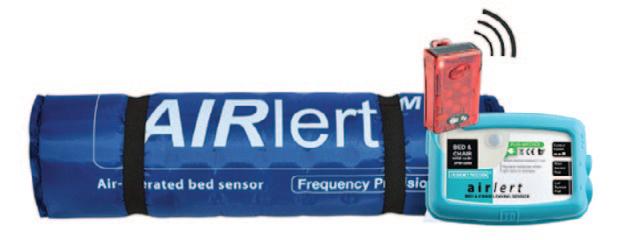
If you’re looking for these kinds of assistive care devices for your loved ones or nursing home, Frequency Precision produce some of the best systems available to help you with elderly care and mobility monitoring, ranging from bed, chair and floor sensor mats through fall monitoring and GPS tracking to fully integrated nurse call plug or wireless systems.
Phone: 01837 810590
Email: contact@frequencyprecision.com
Website: www.frequencyprecision.com
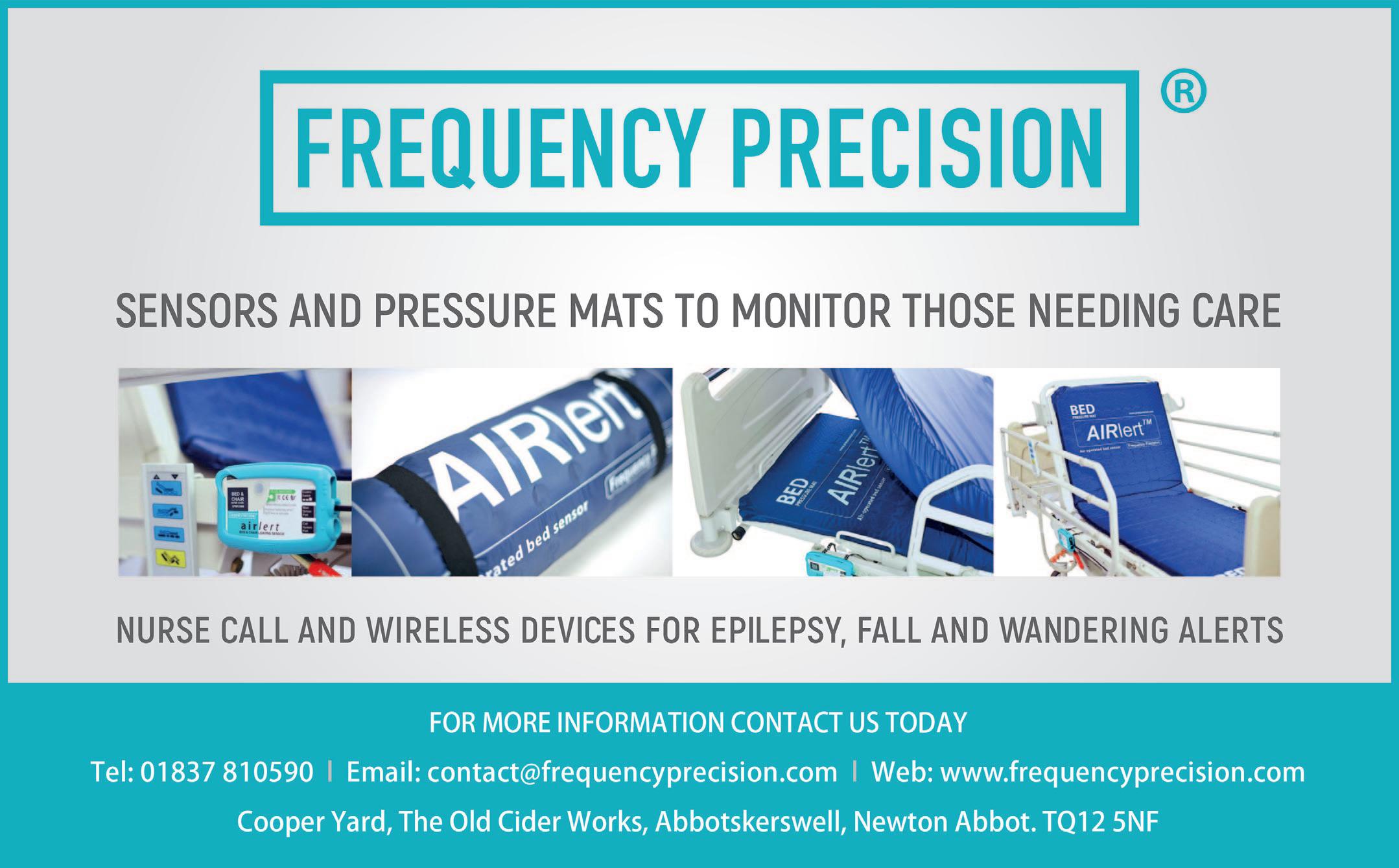
By
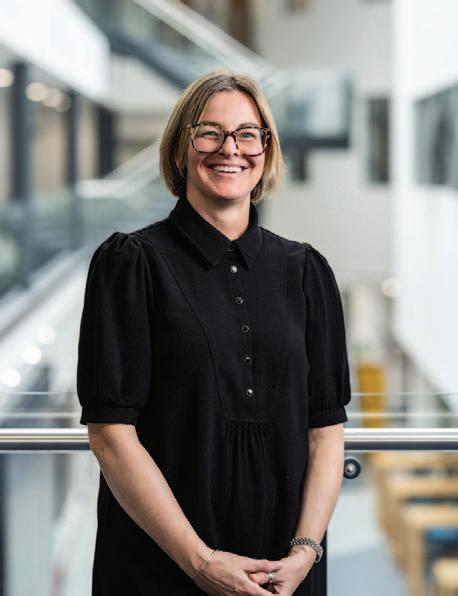
The care sector in the UK is facing a growing crisis. With an aging population, rising demand for services, and chronic staff shortages, pressure on providers has never been greater. In 2023, Skills for Care reported around 152,000 vacancies in adult social care in England alone. These challenges not only strain the system but also compromise the quality and continuity of care. Yet, a powerful and often underutilised solution lies in education and training pathways, particularly Foundation Apprenticeships, full Apprenticeships, and vocational work-based learning such as college placements and T Levels.
These routes into the care profession not only address immediate staffing shortages but also support the longterm sustainability and professionalism of the sector. By combining academic learning with hands-on practical experience, these pathways provide young people with the skills, confidence, and motivation to build fulfilling careers in care. In turn, employers benefit from a pipeline of wellprepared, passionate, and loyal workers.
FOUNDATION APPRENTICESHIPS: ENGAGING FUTURE TALENT EARLY
Foundation Apprenticeships (FAs), offered to school leavers (and up to the age of 19 or 24 with an EHCP), provide an invaluable early introduction to the care sector. These programmes combine classroom learning with structured work placements, giving apprentices the chance to gain practical experience in real care settings in an 8-month window. By engaging with the profession early on, students gain a realistic and positive understanding of what care work involves, dispelling myths and building confidence in their abilities.
This early engagement is crucial. Foundation Apprenticeships help students make informed career choices and allow employers to spot and nurture young talent as they enter the workforce. For the care sector, which traditionally struggles to attract younger workers, FAs serve as a vital bridge between education and employment. They also broaden access to the profession, particularly among school-leavers who may not have considered care as a viable or attractive career path.
COLLEGE PLACEMENTS AND T LEVELS: BUILDING REAL-WORLD EXPERIENCE
Further education colleges play a key role in preparing students for care roles. Health and Social Care students typically complete structured placements in settings such as care homes, day centres, and domiciliary services. These experiences allow learners to apply theory in practical environments and develop essential interpersonal skills.
T Levels, introduced in 2020, are two-year programmes for 16-19 year-olds that include a minimum of 315 hours of industry placement. The Health and Science T Level equips students with both technical knowledge and soft skills like empathy, patience, and communication - all vital for high-quality care.
For employers, T Level placements offer a low-risk way to assess potential recruits in real working contexts. Students who complete meaningful placements are often more confident and better prepared for full-time roles, leading to improved retention and smoother transitions into employment.
APPRENTICESHIPS: STRENGTHENING AND RETAINING THE WORKFORCE
While Foundation Apprenticeships and T Levels lay the groundwork, full Apprenticeships serve as a critical tool for both recruitment and retention in the care sector. Apprenticeships offer a blend of paid work and formal study, allowing individuals to "earn while they learn" and progress toward nationally recognised qualifications in adult care, childcare, and support work.
Crucially, apprenticeships cater to a wide age range and can be used both for new recruits and for upskilling existing staff. This makes them incredibly versatile. For young people who may not thrive in traditional academic routes, apprenticeships offer a clear, supported pathway into meaningful employment. For care providers, investing in apprenticeships can help fill vacancies with committed, well-trained individuals while demonstrating a commitment to workforce development.
Apprenticeships also promote staff loyalty. When employees are supported to learn and develop within their role, they are more likely to stay with their employer long-term. This helps to reduce the high turnover rates that plague the care sector and improves continuity of care for service users.
In a sector crying out for skilled, compassionate workers, the potential of Foundation Apprenticeships, college placements, T Levels, and full Apprenticeships cannot be overstated. These pathways equip learners with the necessary skills and values while embedding them in the culture of care from an early stage. By integrating education with employment, we can reshape how the care sector recruits and retains its workforce. This is not a short-term fix but a sustainable, future-focused strategy.
The care sector cannot afford to wait. By actively engaging with local education providers such as colleges, schools, and apprenticeship training organisations, care employers can build a robust pipeline of skilled, motivated individuals ready to make a difference. Whether it’s offering a placement, mentoring a student, or hiring an apprentice, every action contributes to a stronger, more sustainable workforce. Reach out to Exeter College today and start shaping the next generation of carers.
Sam has been part of the apprenticeship world for over 25 years, having gained vast experience in teaching, designing and managing the quality of apprenticeship curriculum in both independent training provider & College settings. Sam joined Exeter College over 4 years ago and played a key role in the Ofsted Outstanding grading for Apprenticeships. Apprentices@exe-coll.ac.uk https://exe-coll.ac.uk/apprenticeships/
See the advert on the facing page
PIONEERING TECHNOLOGY-ENHANCED CARE FOR THE FUTURE
Multisensory Care Solutions represents a significant advancement in specialist care provision, founded by industry veterans Karen Bradley and Brian Lumb. Drawing upon their exceptional track record of operating a CQC Outstanding-rated residential care home for complex care residents over three decades, the company brings unparalleled expertise to the care sector.
PROVEN LEADERSHIP IN CARE EXCELLENCE
Karen Bradley brings over 45 years of comprehensive experience working with individuals living with dementia, autism, learning disabilities, and other specialist needs. As a former Registered Manager and certified trainer across multiple care disciplines, her deep understanding of person-centred care principles has consistently delivered outstanding outcomes for residents and their families. Brian Lumb contributes extensive technical expertise from his background in multimedia systems, touchscreen displays, and point-of-information technologies. His proven track record in developing and implementing innovative digital solutions—both as a business owner and senior executive within major PLCs—provides the technical foundation for revolutionary care applications.
INNOVATION-DRIVEN CARE EXCELLENCE
The founders' unique combination of care expertise and technological innovation has enabled them to integrate cutting-edge solutions into their care delivery model. This pioneering approach to person-centred care through technology played a crucial role in achieving their CQC Outstanding rating, demonstrating measurable improvements in quality of life for residents and enhanced support for families.
INTRODUCING MULTISENSORY MAGIC

Building upon decades of practical experience, Multisensory Care Solutions has developed "Multisensory Magic"—an accessible software application designed to democratise technology-enhanced care. This cost-effective solution makes advanced multisensory interventions available to care providers across the sector, extending beyond premium facilities to benefit a broader range of residents.
Meeting Critical Care Challenges
With approximately one million people currently living with dementia in the UK—a figure projected to reach 1.5 million by 2040—the need for innovative care solutions has never been more urgent. Technology-enhanced interventions offer proven benefits in:
Sensory stimulation and engagement
Cognitive function support
Enhanced communication pathways
Improved resident wellbeing outcomes
A TIMELY CALL TO ACTION
As the care sector observes World Alzheimer's Month in September 2025, culminating in World Alzheimer's Day on 21st September, the opportunity to transform dementia care through accessible technology solutions represents both a professional imperative and a moral responsibility.
Multisensory Care Solutions stands ready to support care providers in achieving improved CQC ratings whilst delivering meaningful enhancements to resident care and family satisfaction. For more information see the advert on the facing page or please call or email Brian Lumb - 07801 498483 or Email - brian@multisensorycaresolutions.com www.multisensorycaresolutions.com
Restrictive practices such as physical restraint, bed rails, or lap belts remain one of the most challenging aspects of health and social care. Intended to keep patients safe, they can also cause harm, distress, and loss of dignity when used unnecessarily. Across the UK, the principle is clear: care must always use the least restrictive option.
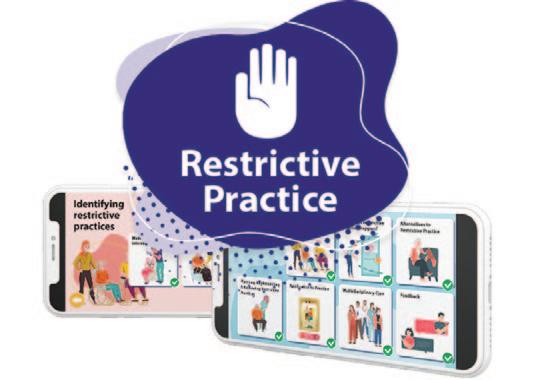
Legislation provides the framework, but culture and staff behaviour shape daily practice. Nurses, carers, and clinicians often make quick decisions balancing safety with autonomy. Without training, restrictive practices risk becoming routine. To change this, staff need better understanding of the human impact and confidence to use alternatives. That’s where Restrictive Practice makes a difference. Developed through co-design workshops with patients and carers, this gamified e-resource gives a voice to those most affected by restraint. Their lived
experiences shaped the learning, helping staff see restraint not as a neutral safety tool, but often as something frightening or disempowering.
The results are powerful. Staff trained with the resource led Quality Improvement projects, achieving measurable reductions:
- Bed rails dropped from 360 to 277 incidents
- Bed bumpers from 303 to 227
- Lap belt use halved, from 46 to 22
These improvements represent safer, more compassionate care and reassurance for families.
Restrictive practices may never disappear entirely, but they should be the exception, not the rule. With the right knowledge and tools, staff can choose safer alternatives and build a culture of dignity, compassion, and respect across UK care services. See our advert on the front cover or visit www. RestrictivePractice.com
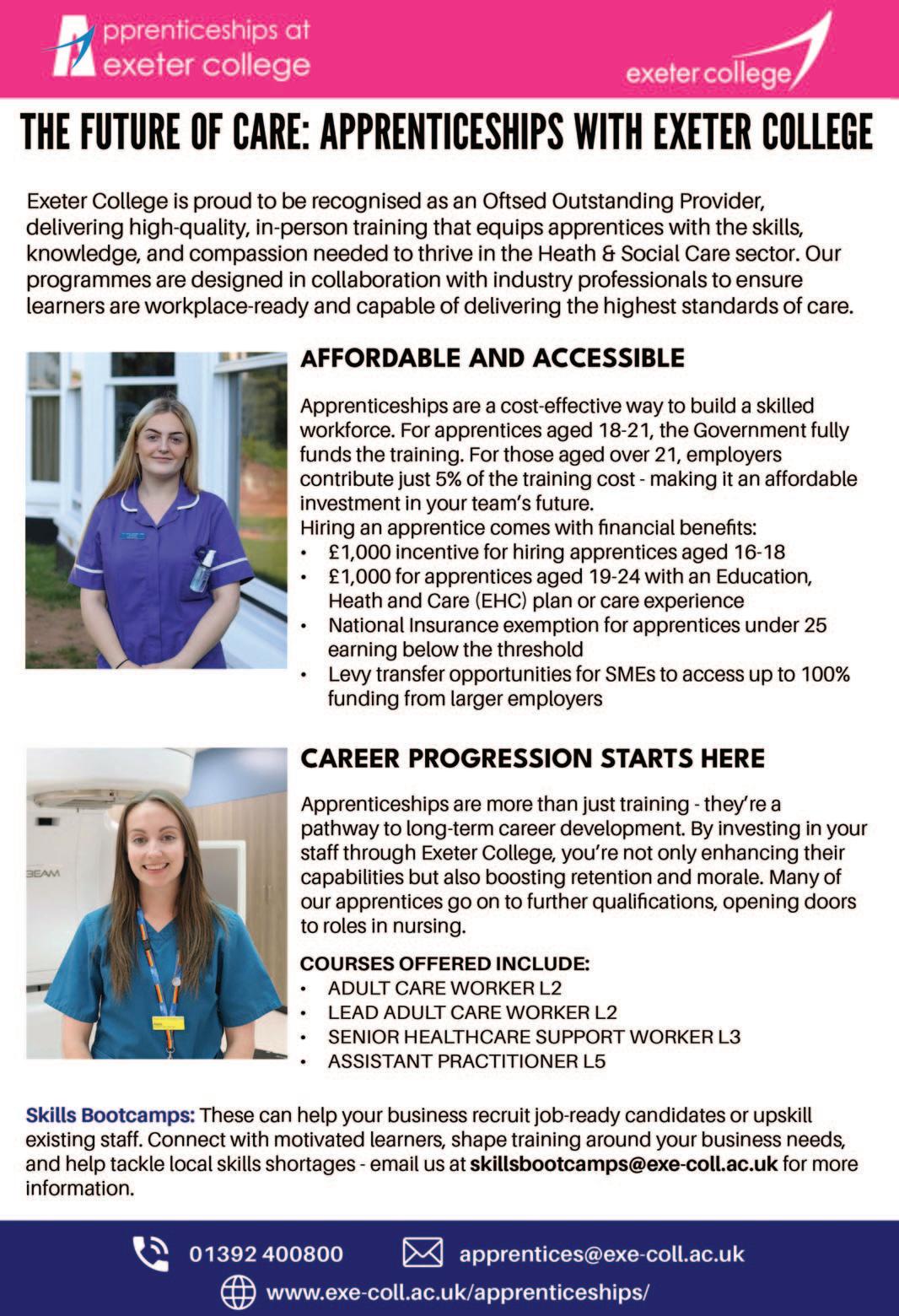


Users / providers are enabled to ‘CONJURE
and reminiscence therapy sessions. Audio, video, slide shows, text, images and aromas can all be
using multiple screen displays.




A new apprenticeship has been launched for adult care support workers who assist people with mental health challenges, including dementia and neurodiversity.
Leading training provider Realise has revealed its new Level 3 Senior Healthcare Support Worker Apprenticeship which features a specialist mental health pathway.
The apprenticeship aligns with The Care Workforce Pathway - developed by Skills for Care and the Department of Health and Social Care –which emphasises the importance of equipping staff who support people with mental ill health with the right knowledge and skills.
The programme’s focus on mental health makes it ideal for those working in complex care services or supporting individuals living with dementia or mental health conditions. It also benefits those supporting individuals with a dual diagnosis.
Standard apprenticeship funding rules apply with no age restrictions. However, learners aged 16–22 are eligible for 100% government funding, meaning non-levy employers are not required to pay the usual 5% co-investment. This is available in England only.
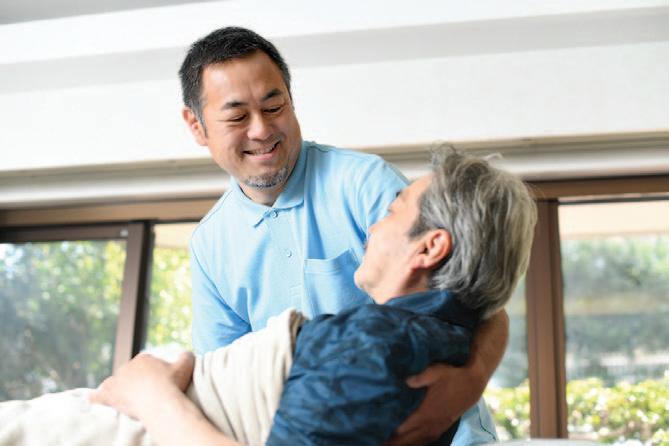
While a few other providers offer the Level 3 Senior Healthcare Support Worker Apprenticeship in Mental Health Pathway, the Realise progamme was developed in collaboration with leading industry provider Barchester Healthcare, ensuring it is closely aligned with the real-world demands of the role, particularly in complex care.
Angela Kaine, Director of Health & Social Care at Realise, said: “We fully support The Care Workforce Pathway, which emphasises the importance of people being able to receive training in areas in which they
specialise.
“Care workers supporting individuals with dementia or other mental health conditions benefit greatly from targeted training in crisis intervention, mental capacity and de-escalation techniques.
“Offering this apprenticeship can help adult care providers recruit individuals for specialised roles and improve retention - two major challenges within the sector.
“There is a wide variety of opportunities within adult care, and we’re proud to support those looking to develop both their technical skills and their chosen specialism.”
This comprehensive 18-month apprenticeship is designed to provide a rich and supportive learning experience. Learners will benefit from a blend of face-to-face support and interactive webinars, creating the perfect balance between in-person guidance and flexible online learning.
These sessions not only enhance understanding but also offer valuable opportunities to connect, collaborate, and network with peers from across the sector- helping to build confidence, share best practices, and develop lasting professional relationships.
Modules include quality improvement - where learners are challenged to identify small changes to enhance performance - and team leadership, which encourages them to take on more responsibilities.
Realise can tailor programmes to suit the employer’s needs by utilising unit selection through the diploma.
The apprenticeship is available throughout England.
For more information, visit www.realisetraining.com
In today’s regulated care environment, having clear, current, and wellcommunicated health and social care policies is essential for delivering safe, compliant services. The Care Quality Commission (CQC) now places increasing emphasis on how policies are implemented and understood—especially during registration and inspections.
Outdated or poorly communicated policies can significantly impact your CQC rating. Even if documentation is comprehensive, failure to ensure staff understand and follow procedures may lead to a “Requires Improvement” or even “Inadequate” rating under the ‘Effective’ domain.
Well-maintained policies promote consistent standards across care teams and help safeguard services when incidents arise. In regulatory investigations, the first request is often to review relevant policies—making accuracy and accessibility key to reducing legal and compliance risks.

However, keeping policies up to date is challenging. Constant changes in legislation, best practice guid-

page
ance, and case law mean that policies can quickly become obsolete. W&P has been a trusted provider of CQC-ready care policies and procedures for over 20 years. Our expert team monitors industry developments to ensure your policies remain fully compliant.
Our Online Policy Portal simplifies policy management. With just a few clicks, providers can update content, distribute documents to staff, track confirmations, and monitor compliance via a real-time dashboard. You can even provide temporary read-only access to inspectors—demonstrating transparency and accountability instantly.
Ensure your care service meets CQC expectations with fully up-to-date, easily accessible, and well-communicated policies.
Email: info@wandptraining.co.uk
Call: 01305 767104
for details.
Since our founding in 2010, Activities to Share has been dedicated to enhancing the lives of those in care by providing thoughtfully designed activity products. Our mission is to support activity coordinators in delivering uplifting, engaging experiences that foster connection, joy, and well-being.
We achieve this by listening closely to your feedback and evolving with your needs. Whether over the phone, via email, WhatsApp, or Live Chat on our website, our team is always ready to offer advice and help you find just the right products to bring your ideas to life.

While we embrace the convenience of technology to expand our resources and share knowledge, we remain firm believers in the irreplaceable power of sensory engagement. That’s why we continue to make our Reminiscence Kits and Sensory Bags with
real, tactile items that stimulate the senses. Some experiences—like popping bubbles for the splash, breathing in a familiar scent, or piecing together a puzzle with others—simply can’t be replicated on a screen. These sensory moments are invaluable in encouraging storytelling, sparking memories, and fostering conversation. Our values remain rooted in this commitment to meaningful connection. We’re here to partner with you—the professionals on the front lines of care—to create a sense of structure, well-being, and fun for those who need it most.
Are you longing for your activity diary to be full?
Look no further
www.activitiestoshare.co.uk are here for you! Call 0117 966 6761


Rebecca Pallot, a partner and employment lawyer at Mills & Reeve

The much-debated Employment Rights Bill promises to bring widespread reforms to employment law. As it reaches the final stages of the Parliamentary process, Rebecca Pallot, employment lawyer at Mills & Reeve, looks at three groups of measures which will have a particularly significant impact on employment relationships in the adult social care sector.
The Government intends to use the Bill to abolish the two-year qualifying period for unfair dismissal, making the entitlement to bring a claim effective from the first day of employment. It also proposes to introduce a new framework for a lighter touch unfair dismissal regime during an “initial period of employment”. That lighter touch process has been described as a “probationary period exemption”.
Under the proposals, a care home provider will be able to dismiss fairly during the initial period if they can demonstrate a potentially fair reason for dismissal which relates to the individual employee. It will also be possible to bring claims in respect of dismissals for redundancy from the first day of employment.
Regulations will define the length of the initial period of employment and how it is calculated. This is likely to be a minimum of six months and could be as long as a year, with the Government currently supporting a compromise of nine months.
(www.mills-reeve.com) assesses three groups of measures in the Bill which are particularly significant for the adult social care sector.
It remains to be seen what the exact process will be to make a dismissal fair in the initial period but it is clear, that there is growing concern amongst care home operators about the increased risk of unfair dismissal claims. While some think that this change could be cost-neutral, because it will give employers a greater incentive to manage probationary periods effectively, much will depend on the design of the regulations, on which the Government will be consulting shortly.
There are three groups of measures to protect zero-hours and low hours workers, as well as agency workers employed in the adult care sector on similar arrangements:
the right to guaranteed hours after the end of every reference period, which reflects the hours worked during that period the right to reasonable notice of shifts (including change and cancellation), and the right to payment for cancelled, moved and curtailed shifts where sufficient notice has not been given
The new regulations will define the reference period for calculating guaranteed hours and other conditions of entitlement, as well as the procedural requirements around the offer of a new contract. They will also specify the minimum notice period for the cancellation of shifts, the compensation due and when it must be paid.
According to the Bill’s impact assessment, these measures will have a disproportionate impact on the social care sector, where over a fifth of its workforce are believed to be engaged on zero-hours contracts or similar arrangements which would be in scope.
There will be significant direct and indirect costs in complying with these measures, which are among the most complex in the Bill.
The three-day waiting period to qualify for SSP will be abolished so that it is paid from the first day of sickness. The Lower Earnings Limit, which
prevents those who earn below a certain amount from claiming SSP, will also be removed. Once these changes take effect, SSP will be paid at 80% of average weekly earnings or the current flat rate, whichever is lower.
As with the measures in respect of zero hour contracts, the Government’s plans to reform SSP will have a significant effect on the social care sector, because of its relatively high proportion of lower paid workers. However, it is possible that the resulting improvements in staff welfare will bring productivity gains to offset at least some of the additional costs.
According to the Government’s implementation timetable, published in July, changes to SSP eligibility will be brought into effect in April 2026, giving care home providers a small window in which to prepare for these reforms.
Other measures in respect of zero hours contracts and unfair dismissal will not be brought into force until 2027. As such, employers have more time to implement any necessary changes. In the meantime, it’s important for providers to keep an eye on this constantly evolving area of law, while engaging with the Government’s consultation on the regulations required to implement these measures, which is expected shortly.
Employers could consider taking the following steps:
• assess your organisation’s dependence on workers who are not permanent employees with predictable hours
• review procedures for probationary periods and ensure that line-managers are trained to implement them, and
• align your sickness absence procedures with the changes to SSP being introduced in April.
While the Bill also creates the framework for establishing a negotiating body to set pay and conditions across the entire adult care sector in England, it remains to be seen what impact the proposed measures will have on the sector.

Specialist business property adviser, Christie & Co, has launched its Care Market Review 2025 report, which analyses a range of topics relating to the UK healthcare business market, including capital markets, land and development, the transactional market, shifts in local authority fee rates, operator sentiment and the finance landscape. Healthcare the report reveals, remains a compelling investment due to strong demographic drivers, particularly the ageing population and rising life expectancy, with the over-80s population expected to more than double by 2050. Investor interest is further supported by ESG credentials and inflation-linked, long-income lease structures the report reveals.
The 12 months to July 2025 marked a period of strategic realignment amid ongoing macroeconomic and geopolitical shifts, with the market evolving via increased M&A, joint ventures, and a growing focus on management contracts.
Overseas capital significantly boosted deal activity during this time, with sector-specialist REITs like Welltower and Omega leading major acquisitions, including Care UK and 45 Four Seasons care homes respectively. H1 2025 also saw robust investor activity, including notable M&A deals like Care Trust REIT’s acquisition of Care REIT plc and the Aedifica-Cofinimmo merger. While operators are increasingly using lease-based models and sale-and-leaseback structures to unlock capital, looking ahead, Christie & Co expects to see more investors exploring sale and manage-back models, offering higher returns with greater operational exposure. Christie & Co’s report goes on to analyse the transactions that it has conducted over the past year. Deal activity surged, with completions at their highest level, and Christie & Co’s pipeline 24 per cent ahead of where it was in 2024. 49 per cent of deals involved homes with 20 to 39 beds, while only 17 per cent were for homes over 60 beds.
A notable shift occurred in the profile of homes entering the market, with a rise in smaller care homes (under 20 beds) making up 38 per cent of instructions, an increase from 12 per cent in early 2024. Larger homes (over 60 beds) comprised just 5 per cent of instructions, down from 15 per cent, reflecting a shortage of purpose-built facilities. Homes with 20 to 59 beds accounted for 56 per cent of instructions, down from 73 per cent in 2024.
First-time buyers represented 17 per cent of deals in H1 2025, up from 11 per cent in 2024 and just 4 per cent in 2023. Small and medium-sized groups (those with 3 to 19 homes) were the most active buyers (32 per cent of deals), followed closely by independent operators (those with 1 to 2 homes) at 31 per cent. Large groups and corporates saw a decline in activity, accounting for only 20 per cent of deals, down from 36 per cent in 2023.
Homes sold with vacant possession rose to 21 per cent in 2025, up from 13 per cent in 2024. Of these closed homes, 60 per cent remained in care use, 24 per cent were converted to residential dwellings, and 16 per cent repurposed for other uses. This high closure rate in the sector is something that Christie & Co expects will continue.
Christie & Co also conducted and analysed a Freedom of Information Act survey, covering all 174 local authorities across England, Wales, and Scotland. It revealed an average residential fee increase in England of 8.6 per cent compared with 9 per cent in 2023/24. There were some notable fee rate uplifts in certain local authorities, albeit from a low base level.
The burden on the self-funded client base is likely to rise, with the majority of providers achieving private fee increases of between 5 per cent and 10 per cent, sometimes more.
A segment from Christie Finance on the finance landscape notes that the care sector continues to attract strong interest from the finance market, with both new and established operators seeking debt funding to sup-
Global assists clients throughout the U.K. who specialise in the healthcare sector to achieve their objectives of purchase, development and refinance.
We have organised over £1.8bn for clients in the past 30 years, providing clients with competitively priced funding to refinance existing debt, ease cashflow and develop businesses further.
From helping clients make their first purchase through to allowing groups to grow significantly in size we assist at every stage of your business expansion.

Every proposal is individual and deserves to be treated that way, so we hope you will allow us to be of assistance to you and call us to chat through your plans and requirements, I am sure we will be able to tailor a facility to your requirements.
Call us on 01242 227172 or e-mail us at enquiries@globalbusinessfinance.net
port growth. However, securing finance remains challenging due to increasingly rigorous lender requirements. Richard Lunn, Managing Director – Care at Christie & Co, comments,
“We have seen extremely positive market activity throughout the year, as many operators look to grow their portfolios. By the end of August, we had already transacted more deals than in 2024, and our forward pipeline is the highest ever, reflecting the investor and operator desire to acquire care services. On a recent trip to the USA, investors called this a ‘Goldilocks period’ for senior care providers and investors, with the much-heralded arrival of the huge demographic wave of elderly people requiring care and support and limited quality supply to meet this demand in future years.”
To read the full Care Market Review 2025, visit: www.christie.com/sectors/care/care-market-review-2025

